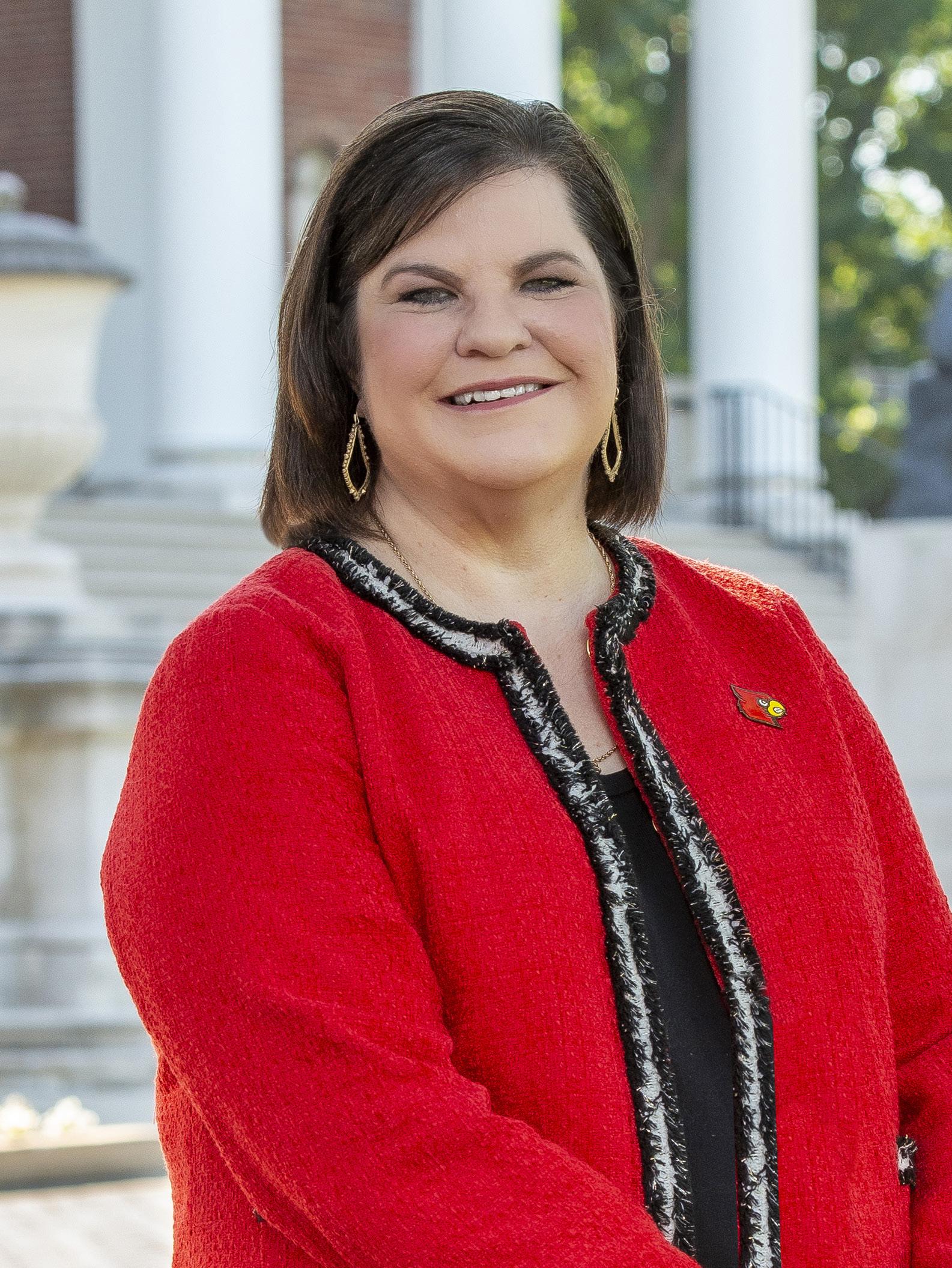


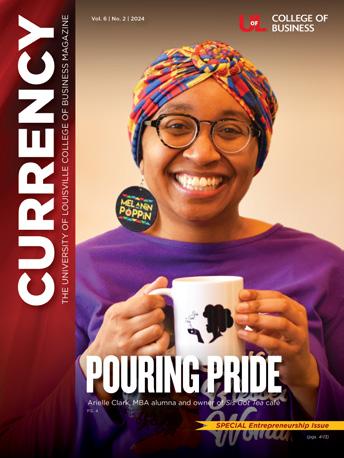
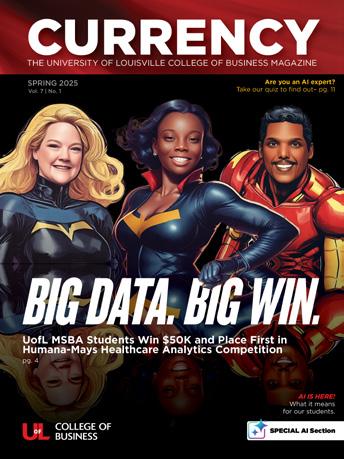


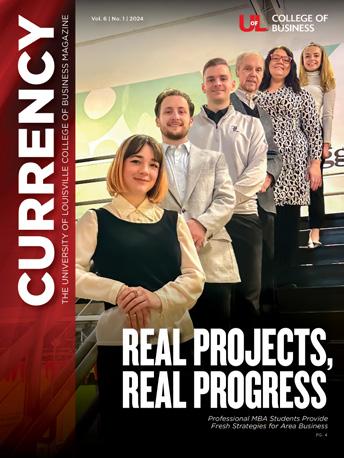









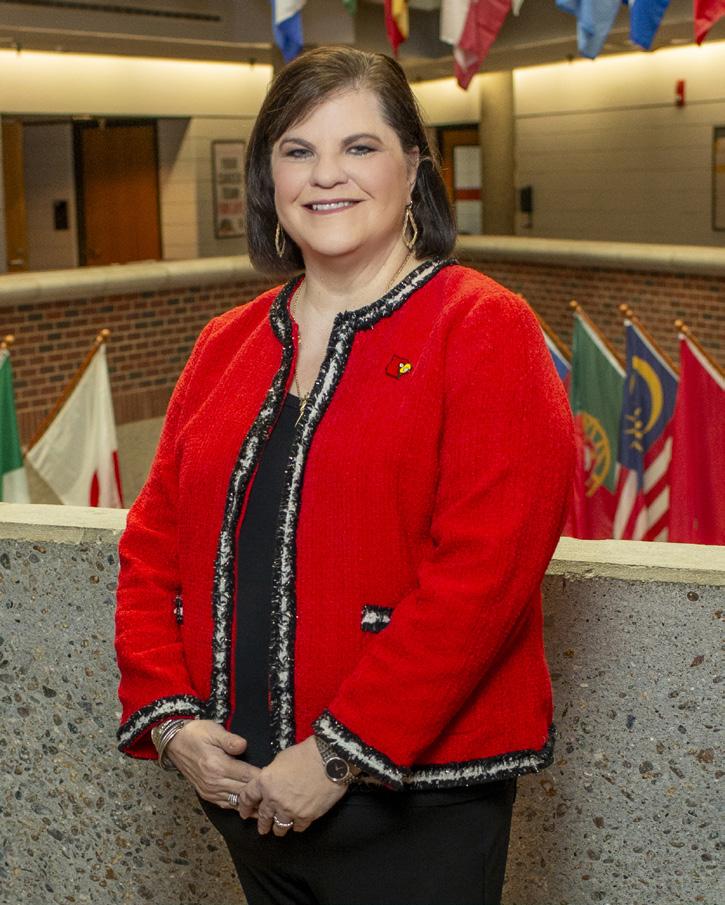
Dear College of Business community,
As we kick off a new academic year, I’m filled with enthusiasm and gratitude to join the University of Louisville as your new Dean of the College of Business.
As I begin my tenure as Dean, I’m inspired by the energy, excellence and purpose that define this community.
My first few months have been a whirlwind — in the best possible way. From the moment I stepped onto campus in mid-July, I’ve been diving headfirst into the life of the college: meeting with our department chairs, directors and faculty; hearing from our Board of Advisors and community partners; and attending a wide range of events that showcase the incredible energy and talent here at UofL.
These early experiences have reinforced what I already believed: this is a college filled with passionate people doing meaningful work — not just in the classroom, but across our community and beyond.
As I continue to learn and listen, my focus is on nurturing strong relationships — with our alumni, donors, faculty, staff, students and business partners. I want to hear your ideas, understand your goals and learn how we can elevate this college together.
We’re at a pivotal moment. Higher education is evolving rapidly, and business education must lead the way — through innovation, relevance and impact. My commitment is to work alongside all of you to ensure that the College of Business remains a dynamic force for good: preparing students for the challenges of tomorrow, partnering with industry to solve real problems and creating an inclusive and empowering environment for all.
Thank you to everyone who has already extended such a warm welcome. I look forward to meeting many more of you in the months ahead. Go Cards!
Warmly,

Amy Henley Dean, College of Business
by Erica Hulse
Local Restaurateur & Marketing
Graduate Josh Gonzalez Is Reimagining Community Through Culture and Cuisine
At 991 Logan Street, the air smells like heritage. On any given day you might catch the comforting scent of sourdough bread baking, the lively chatter of brunch-goers sipping agua frescas and vibrant music from a salsa dance class upstairs.
The address houses two popular restaurants, FOKO and La Pana Bakery y Cafe, and Latin dance and yoga center Estudio La Luz, and is nestled in the city’s Shelby Park neighborhood.
Striving to meet a need within the Louisville community–a space between home and work where authentic connections flourish–the businesses’ co-owner and University of Louisville College of Business alumnus Joshua Gonzalez shares that, “I believe our restaurants serve as a vital ‘third place’…
facilitating cultural exchange in ways that break down barriers and build understanding.”
A first-generation Mexican-American, Gonzalez spent his childhood learning about his Mexican heritage amidst the warmth of
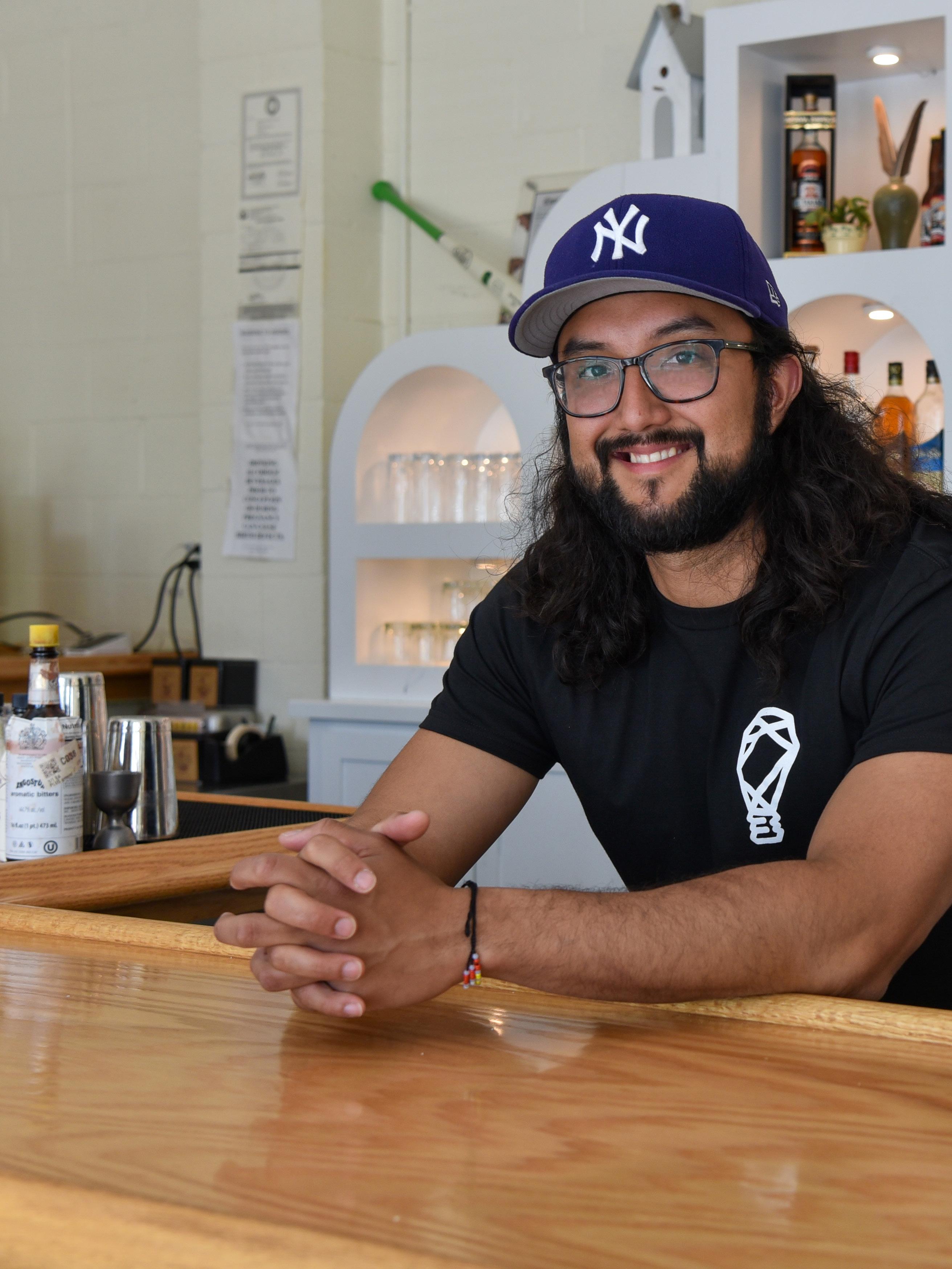
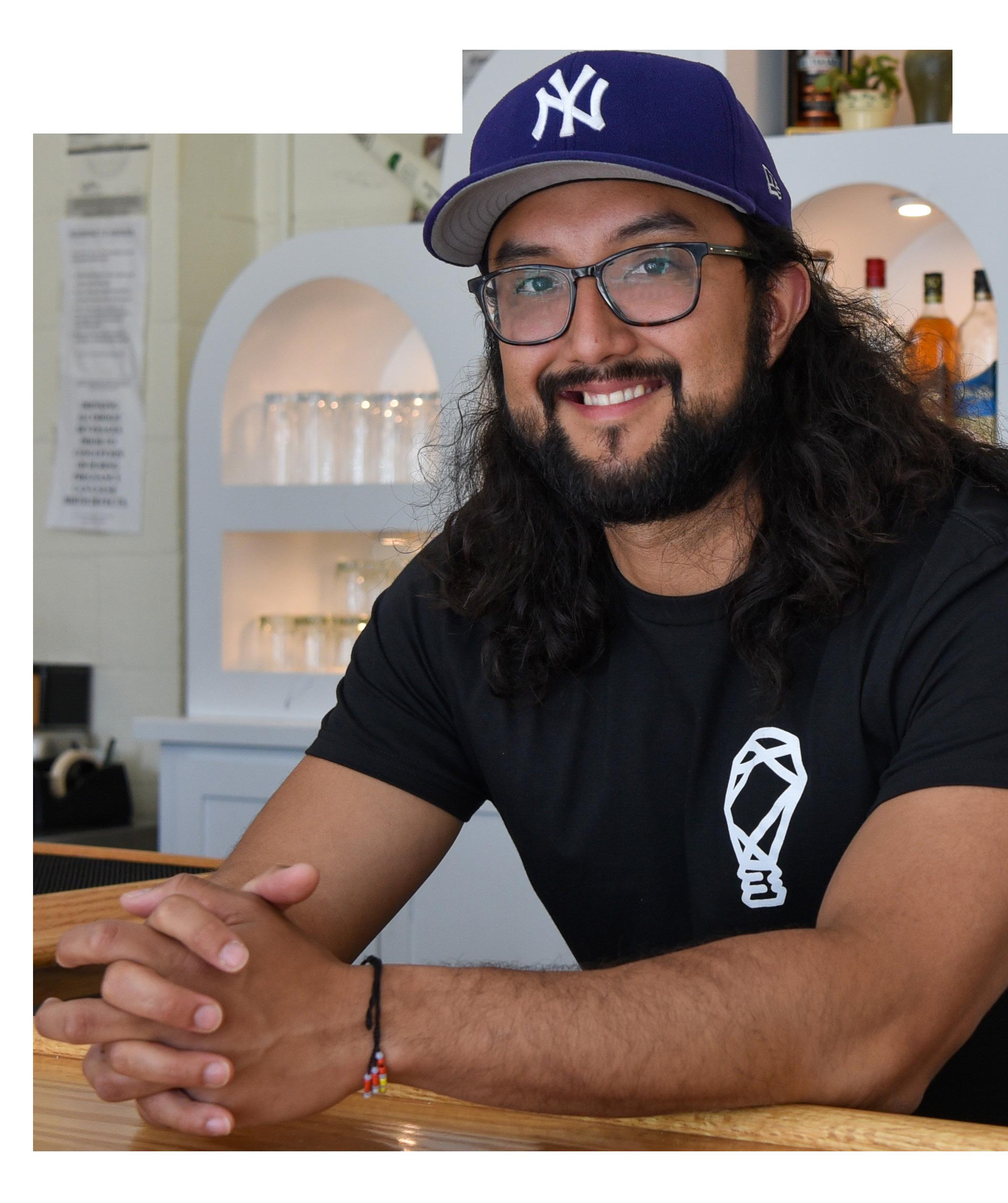

small-town American life. His parents, having immigrated from Michoacán, Mexico, were dedicated to maintaining the rich traditions of their Mexican heritage for their children while building a life for their family in the United States. “Our celebrations were abundant, filled with traditional food, music and dancing that kept our Mexican heritage alive,” he shared. Born and raised in La Grange, Kentucky, Gonzalez had always experienced life with this dual heritage–strengthening the ties to his own Mexican roots while connecting with the sense of community that can only be found from living in the nation’s heartland.
With parents whose passions included sports and forming connections with others, Gonzalez witnessed the power of community through his involvement with his family’s church, participation on basketball and soccer teams and the professional roles of his parents. “My parents’ work in public service, particularly as liaisons for the Spanish-speaking community, showed me the importance of bridging cultures and helping others,” he explained. Growing up in both communities shaped Gonzalez’s early understanding that building and maintaining connections with community is a continued practice–and that food, music, dancing and fellowship are necessary tools to further nurture bonds with the community–essential lessons for the cultural experience he would eventually create.
In 2016, Gonzalez met his future business partner Francisco Leonardo while working at an area restaurant. He immediately recognized Leonardo’s culinary skill and mutual passion for bridging cultures and bringing people together through food. “I was immediately captivated by his cooking style–he’s also from a small pueblo in Mexico but trained as a chef here in Kentucky,” he said. “His fusion of cuisines told the story of the first-generation experience through food, mirroring my own journey and that of many others navigating between two cultures.” Together, the two
began to collaborate, bringing together concepts that would eventually culminate in the launch of FOKO. “I began assisting with his cooking demos and classes, often paired with Latin dance instruction that I provided,” he said. Seeking to broaden their understanding of what brings people together in celebration, the pair began “traveling together to cities across the country–New York, New Orleans, Huntsville, Oxford, Chicago–studying food, music and dance scenes that inspired us.”
Taking their lived experiences, skills and drive to build a communal space that could celebrate their unique cultural heritage, Gonzalez and Leonardo launched their first restaurant, FOKO, in October 2019. “The synergy between my love of people and hospitality and Francisco’s exceptional culinary skills made it clear we needed to create a space where we could cultivate our passions and share them with our community,” said Gonzalez. Six months later, the COVID-19 pandemic “turned our world upside down,” he explained. “We were determined to survive and quickly pivoted our entire business model. Shifting into family meal services, the team partnered with The Lee Initiative to provide meals for the industry community. “When we noticed empty bread shelves at grocery stores, we saw an opportunity and began selling bread, which proved incredibly successful.”
Together, the team’s ability to adapt to those unexpected changes led to further growth within his entrepreneurship team with the launch of their micro bakery, La Pana–a partnership developed with Diego Hernandez, a fourth-generation baker from Oaxaca, Mexico. Gonzalez believes their commitment to serve their community, and their capability to pivot during times of crisis not only aided to uplift the citizens of the Louisville area in a time of crisis–it allowed their mission to grow and evolve despite unprecedented challenges, and “reinforced that resilience and willingness to evolve are essential in the hospitality industry.”
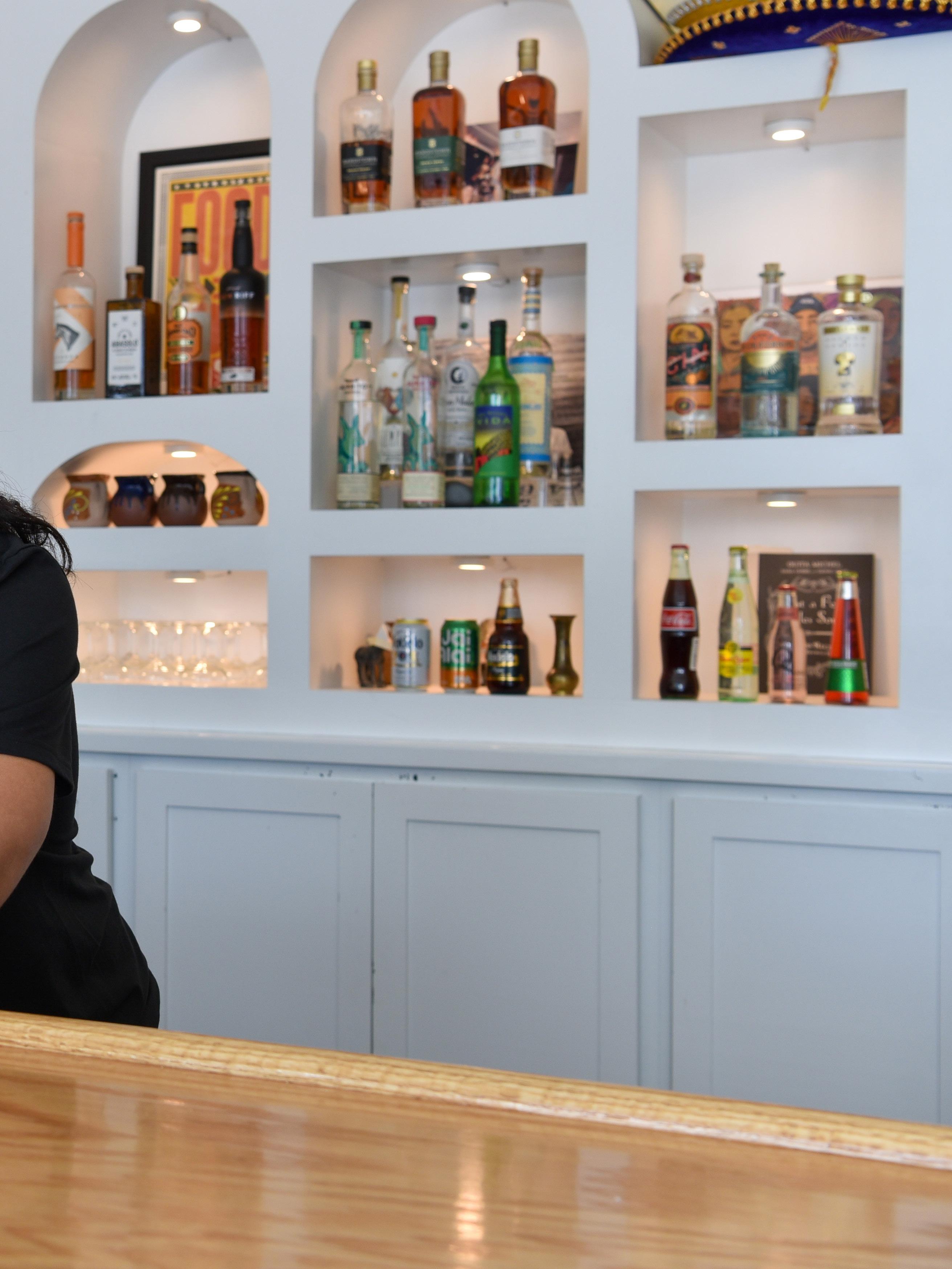
With two restaurants on the rise and wisdom gained from business challenges from the peak of the COVID-19 crisis, Gonzalez eventually sought to further his business skills with a degree in marketing, noting that, “I saw marketing as a perfect way to create authentic connections between businesses and their communities,” he said. “Something that felt essential for the hospitality venture I was planning.” Attracted to UofL’s sense of community within a large, metropolitan university, he seized the “opportunity to build meaningful relationships with both professors and fellow students who shared ties to the local business community.”
Balancing dual roles as a restaurateur and student presented unique challenges for Gonzalez. “Running La Pana and FOKO while pursuing my degree meant constantly juggling competing priorities–from managing our pivot during the pandemic to studying for exams–all while maintaining the high standards our customers expected.” He credits Leonardo and his team of restaurant staff for providing an essential support system during that time. “Francisco and our team were understanding and stepped up to cover when I needed to be in class or studying,” he shared. Ultimately, when
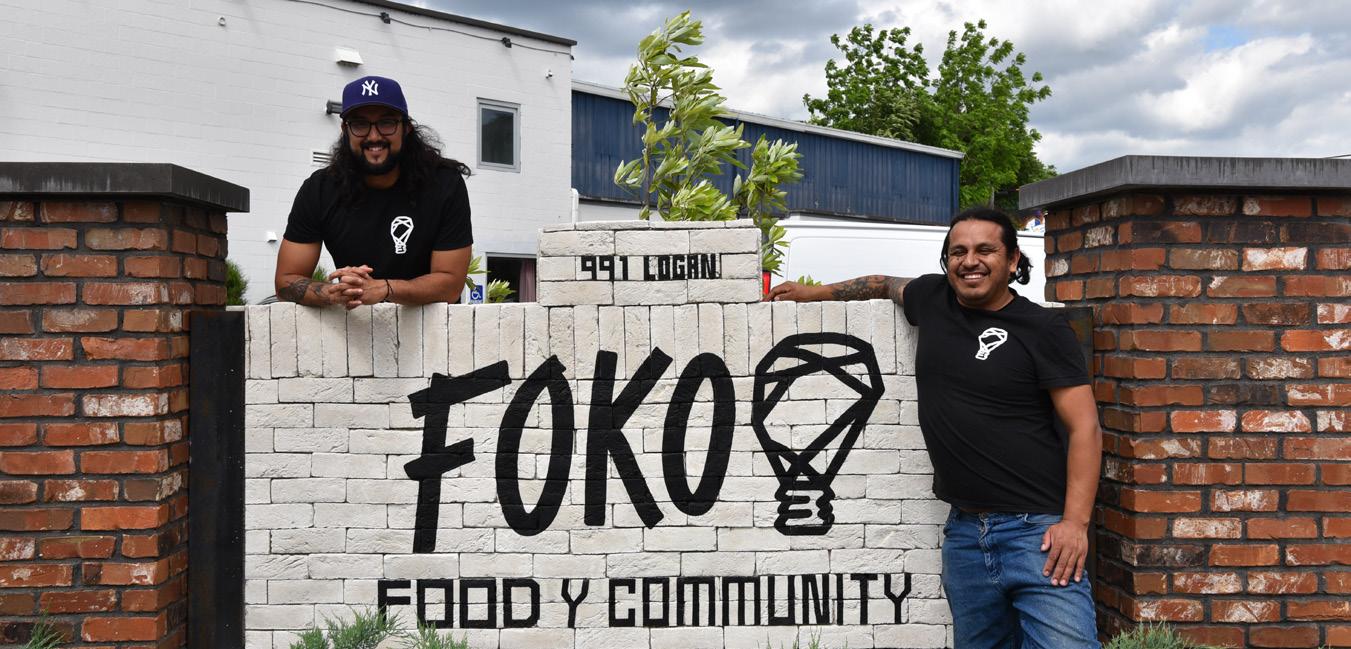
Gonzalez found himself facing moments of doubt, he leaned on the lessons he had learned from witnessing his parents overcome obstacles to achieve their American dream. “I reminded myself that if my parents could overcome the challenges of building a life in a new country, I could handle the demands of being a student entrepreneur,” he said.
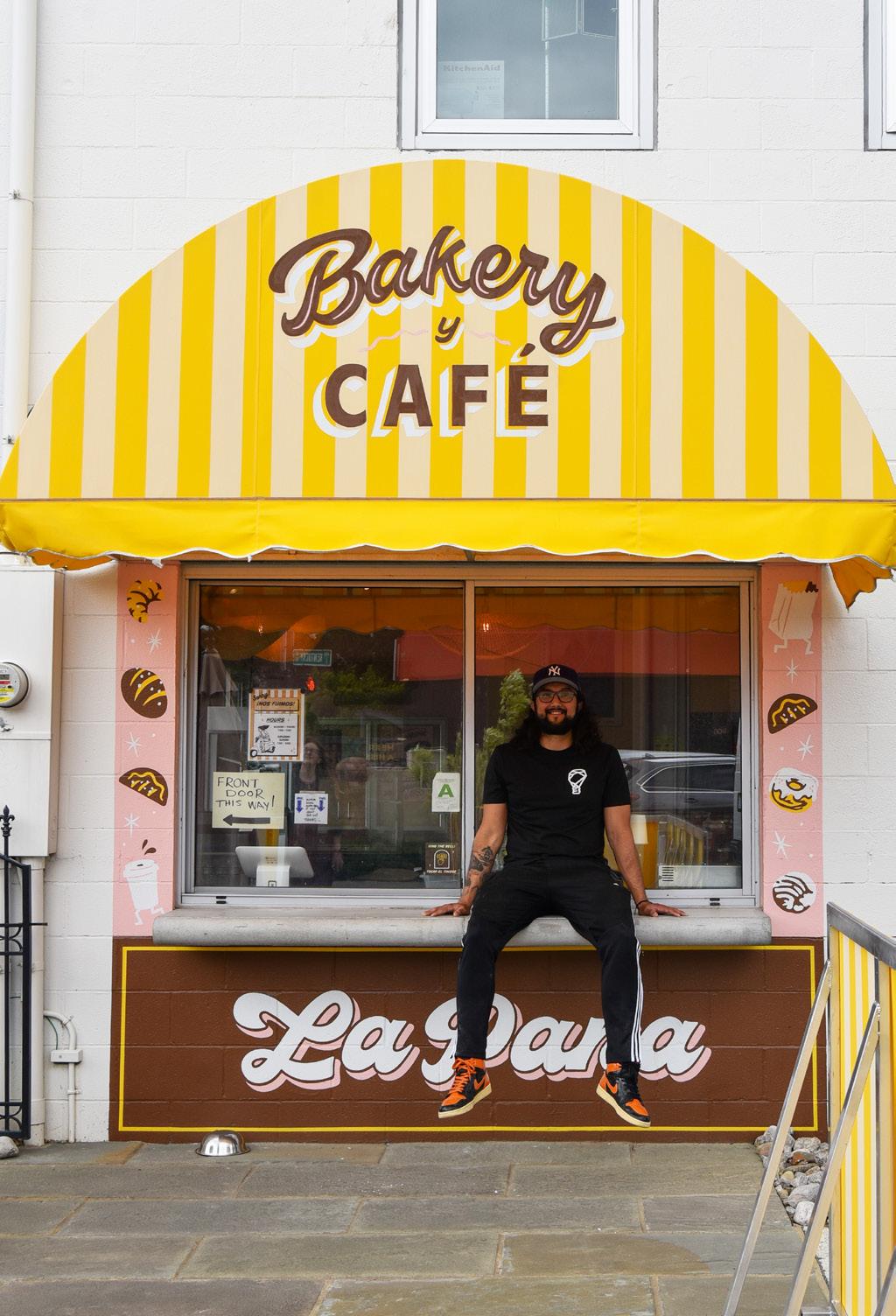
With goals to further develop Estudio La Luz and plans to expand both FOKO and La Pana, Gonzalez hopes the community hub he and his team have created will continue to serve as catalysts for holistic wellbeing, and will also serve as a springboard to cultivate the next generation of culturally-rooted entrepreneurs within Louisville’s booming service industry. He explained that, “Whether through nourishing food, movement practices or career development, we’re committed to creating multiple touchpoints where people can grow, connect and thrive, ensuring that our business remains rooted in the values of service, community building and cultural bridge-building that have always guided us.”
Learn more about FOKO, La Pana Bakery y Café and Estudio La Luz by visiting them on Instagram or in person at 991 Logan Street in Louisville, Kentucky.
Ready to turn your passion for food and community into a thriving career? UofL’s minor in hospitality can equip you with the tools, connections and real-world experience you need to build something meaningful from the ground up. Learn more at business.louisville.edu/learnmore/hospitality-minor/
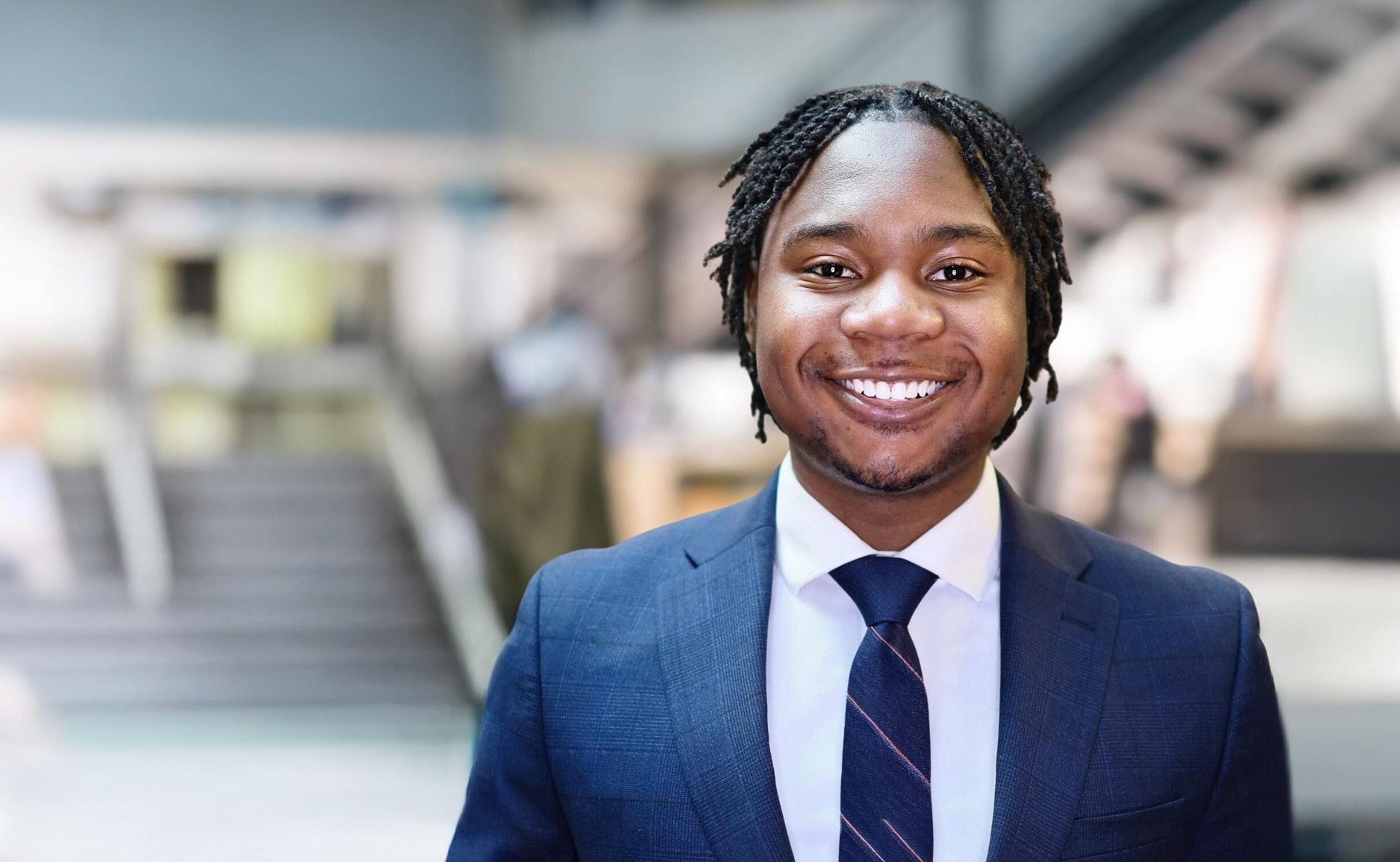
by Erica Hulse
In student entrepreneur Golden Mashindi’s world, innovation isn’t just a buzzword–it’s a way of life. From his parents’ grassroots healthcare efforts in Zimbabwe, to launching his inaugural startup company, Jet Ski 502 from a single secondhand personal watercraft, the University of Louisville Innovation MBA student and recipient of the 2025 Cardinal Challenge People’s Choice award is proving that each of his career goals is powered by purpose and rooted in community health and wellness.
Growing up in a family focused on providing community healthcare access through his parents’ nonprofit organization, at an early age, Mashindi gained exposure not only to creating and operating an organization but also to witnessing the extensive need for access to basic health and wellness in minority communities across the nation and around the world. Offering drive-thru clinics, donation drives and soccer camps in his parent’s
home country of Zimbabwe each summer, he “saw firsthand the disparities people faced there and in minority communities here in the US,” he said.
Fueled by those mission experiences, Mashindi felt the calling to follow in his mother’s footsteps and pursue a medical career, deciding to earn a bachelor’s degree in public health with a premedicine track. “Public health gave me the foundation to understand community-level health issues while setting me up to pursue medical school,” he explained. His work in Zimbabwe also planted the seeds of interest in entrepreneurship, which laid the foundation for the eventual development and launch of his second startup G&E Solutions–a company geared toward creating and delivering technology-driven hygiene tools previously inaccessible to underserved communities.
As a public health student during the rise of COVID-19, Mashindi became more immersed in providing public health aid. Assisting with COVID testing and vaccination, he soon advanced into leadership and operations roles, giving him “a front
row seat to how healthcare systems run behind the scenes.”
Further into his undergraduate program, he participated in an executive internship that led him toward the healthcare management industry. “I realized I had a real passion for the business side of healthcare,” he said. After hearing from one of his professors about her experience in hospital leadership, he felt moved to pursue an MBA. Driven toward pursuing healthcare management while growing his existing business, Jet Ski 502, upon earning his bachelor’s degree, Mashindi chose UofL’s IMBA “because of its focus on entrepreneurship, something I was already diving into with my first startup.”
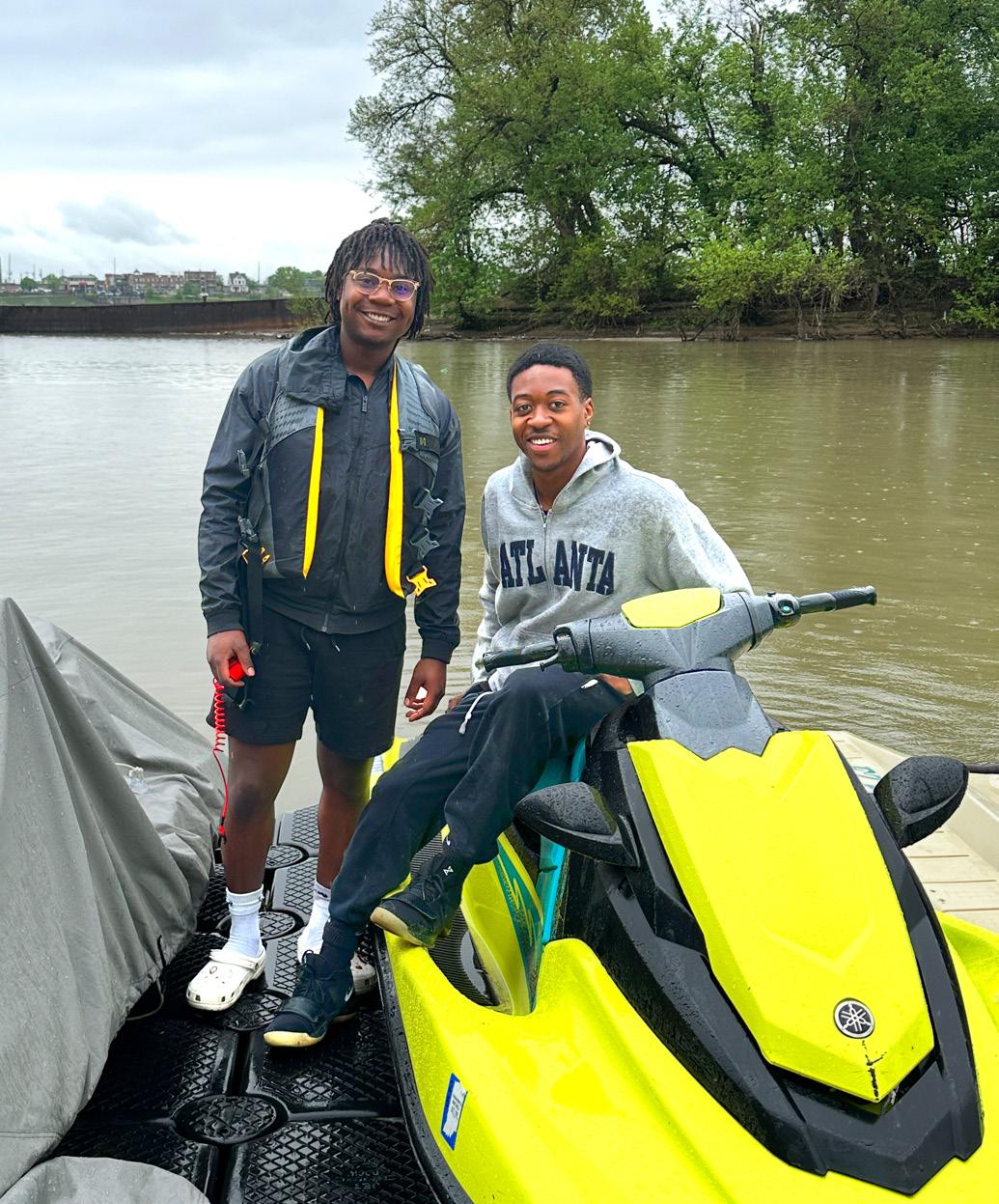
Mashindi’s initial startup, Jet Ski 502, was already speeding ahead with friend and business partner Arnold Moto years before his career trajectory led him to the College of Business. “Arnold and I got close when my family moved to Indianapolis in 2018,” he explained. “We used to watch boats from my parents’ house and always wanted to be out there, but we couldn’t rent anything because we were underage.” Forming a plan, the two saved money and purchased a used jet ski. Their
realization that there was a lack of access to the temporary use of jet skis sparked their first business venture. “We realized there were a lot of people like us, interested but with no access,” he said.
Looking to earn capital to grow Jet Ski 502, Mashindi participated in the University of Kentucky’s Von Allmen Bootcamp, winning first place. The pair used the funding to purchase more jet skis. After recognizing a necessary pivot from their original plan for 12 service locations in Indiana, Mashindi and Moto “created a new business model and validated it at numerous pitch competitions this past year and saw the potential for a product market fit in Louisville.”
Experiencing mixed reactions to the launch of Jet Ski 502 at Waterfront Park, the team has taken to heart the variety of feedback they have received about offering personal watercraft rentals to the public. “Jet skis are new to Louisville, so we’ve seen both excitement and concern,” said Mashindi. “A lot of people are happy to see something different…especially as the city brings in more vendors and small businesses. At the same time, some worry about safety on the Ohio River.” To uphold customers’ well-being first, he explained that, “We’re working closely with the right agencies to make sure we are prioritizing safety.”
With Jet Ski 502 successfully launched, in the fall of 2024, Mashindi turned his attention to the IMBA program at a pivotal point in his entrepreneurial career. While he was able to conceptualize and launch his inaugural startup, he sought to develop further skills that would help him present his products, notably his startup with fellow IMBA student Emmanuel Haynes, in a more polished and engaging way. The program “helped me learn how to model and pitch quickly,” he said, “which was huge in securing funding.”
Along with the knowledge gained specifically to his needs as a business owner, through the IMBA Mashindi, “gained access to mentors and a network that continues to support our growth,” he shared. “Without the IMBA, I wouldn’t have been able to build what we have now.” As part of gaining access to a growing network of business
professionals and entrepreneurs, Mashindi credits Senior Executive Director of Graduate Programs Vernon Foster with opening doors to him, which ordinarily would have never been opened. “[He] supported me even before I officially joined the program,” he said. “He took the time to introduce me to key people in the community, invited me to networking events, and has consistently looked out for my growth.”
Developing his ability to think outside the box, ask critical questions, pivot his business model design for his second startup, G&E Solutions and speak to his entrepreneurial vision were key skills necessary to develop as an IMBA student and a business owner. Invaluable feedback from Management and Entrepreneurship Instructor Jack Manzella impacted Mashindi’s rapid growth, allowing him to excel as a graduate student and business leader. “He gave detailed feedback on our pitch decks, answered every question I brought to him and helped shape how I think through entrepreneurship,” he said. “From the start, he believed in the ideas we were building and always pushed me to keep going.” Mashindi attributes his education in the IMBA program to his success at the 2025 Governor’s School for Entrepreneurs Collegiate Pitch Competition. “I entered Jet Ski 502 and G&E Solutions, and ended up winning first and second place,” he said. “Having two businesses in the competition taught me how to refine ideas quickly under pressure and juggle multiple pitches at once. The feedback we received during that process shaped everything we’re doing now.”
The skills honed in his IMBA program also served him well in this year’s Cardinal Challenge event. Hosted by Brown-Forman, the Forcht Center for Entrepreneurship and multiple other sponsors, the 17th annual event showcased the startup concepts of 13 UofL graduate student teams. Mashindi’s second startup, G&E Solutions, received numerous awards for its product, Portable Shower Solutions, earning a personalized gift package from area nonprofit organization Canopy, a $2,000 grant from the Forcht Center for Entrepreneurship and the honor of being named the event’s People’s Choice Award winner. This recognition affirmed
their belief that innovation can benefit those in need. “Emmanuel and I worked so hard this past year to get to the stages we are at now with the business, and that moment was just another confirmation that we are still heading down the right path,” he shared. “We have so many people rooting for us, and that is the motivation we needed to keep going.”
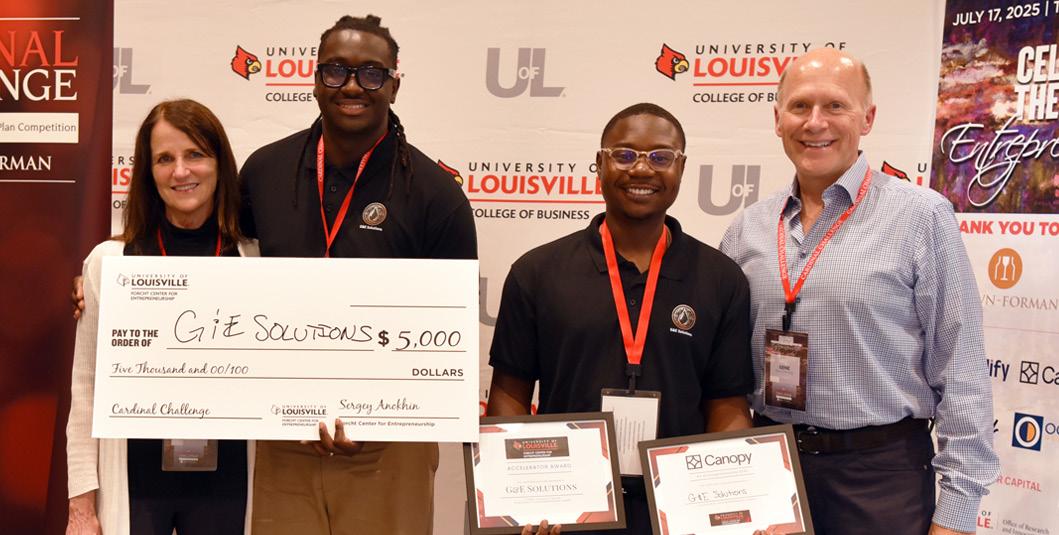
With goals to continue pursuing a career in healthcare management while maintaining his startup endeavors, Mashindi shows no signs of slowing down on innovation or progress. “I’m starting a Healthcare Administrative Fellowship at Norton Healthcare’s Norton Medical Group, where I’ll rotate through departments and work on high-impact projects tied to strategy, operations and patient care,” he said. “At the same time, I’ll continue building G&E Solutions and stay focused on launching 3sixty Waves–a hardware startup focused on men’s grooming,” he said. “We are working on an automated hairbrush for textured hair, [and] we are almost prototype ready.”
Are you looking to invest in an innovative new product from entrepreneurs with a proven track record of success? Mashindi and Haynes are currently looking for investors for their next launch. Visit them to learn more and contact them at 3sixty Waves on Instagram or LinkedIn.
Your business vision needs real strategy. Our Innovation MBA helps entrepreneurs like you turn your ideas into scalable solutions. Learn more and launch your dreams at business. louisville.edu/academics-programs/graduate-programs/imba/
Vishal Patel
by Erica Hulse
The 2025 Cardinal Challenge event, The Art of Entrepreneurship, brought together 13 teams of rising entrepreneurs at the Speed Art Museum for an evening that showcased forward-thinking, innovative products and services conceptualized and developed by the University of Louisville’s local and international competitors–students enrolled in Innovation and Global MBA programs at the College of Business. Teams competed for cash prizes, mentorship opportunities and for one team, the recognition of being named the

The 17th annual event branched away from its previous format of ranking and judging competitors, pivoting instead toward providing invaluable feedback and mentorship opportunities from area industry leaders to each student team. The shift in event design also allowed event attendees to experience each presentation. Sergey Anokhin, Director of the Forcht Center for Entrepreneurship, explained his reimagined framework for the event, which focused on mentorship, advising and partnering with teams in lieu of ranking or judging. “Like art, entrepreneurship requires courage, iteration and vision,” he
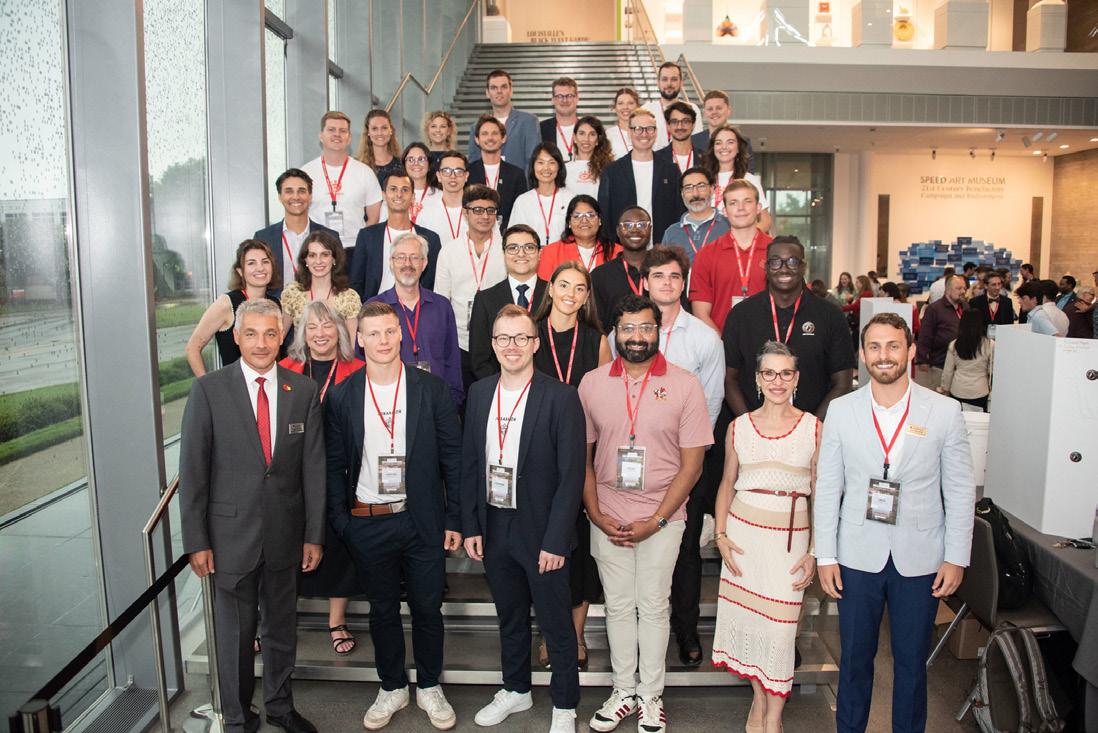
The event culminated with team G&E Solutions, comprised of Emmanuel Haynes and Golden Mashindi, receiving the first-ever People’s Choice Award for their product, Portable Shower Solutions. An affordable way to deliver clean water and sanitation by tapping into existing infrastructure, their product strives to improve dignity, health and quality of life.
INNOFeet and Second2U were each recognized with the Forcht Accelerator Award, which awards grant prizes of up to $2,000. Additionally, each of the sponsoring companies for the
event awarded teams customized gift packages, including:
Render Capital awarded investment mentoring opportunities to Taylor Social
Occam Design awarded device engineering consultation and prototyping to FLO-X
Amplify Louisville awarded networking, strategy mentoring and other perks to uMoments
Wyatt, Combs & Tarrant, LLC awarded legal services to Bottle Episodes
Mightily awarded digital marketing strategy assistance to JobArmor
UofL Forcht Center for Entrepreneurship awarded grant funding (up to $2,000) to G&E Solutions
EVPRI awarded a technology commercialization grant to Due Gooder
Story Louisville awarded a one-year co-working space membership to Diggsy
Canopy awarded a personalized gift package to G&E Solutions
Katalyst Creative awarded graphical storytelling services to INNOFeet
From immersive role-play platforms to 3D-printed housing solutions, this year’s Cardinal Challenge teams pushed boundaries–reimagining what’s possible by pitching real-world solutions to real-world problems. The event brought a wide spectrum of innovation to the table, showcasing bold ideas, strong business acumen and purpose-driven entrepreneurship.
Does the Cardinal Challenge spark your inner entrepreneur? Take the next step with UofL’s Innovation MBA. It’s fast, immersive and custom-built for creative problem-solvers who want to pitch smarter, build faster and win bigger—on stage and beyond. business.louisville.edu/academics-programs/ graduate-programs/imba/
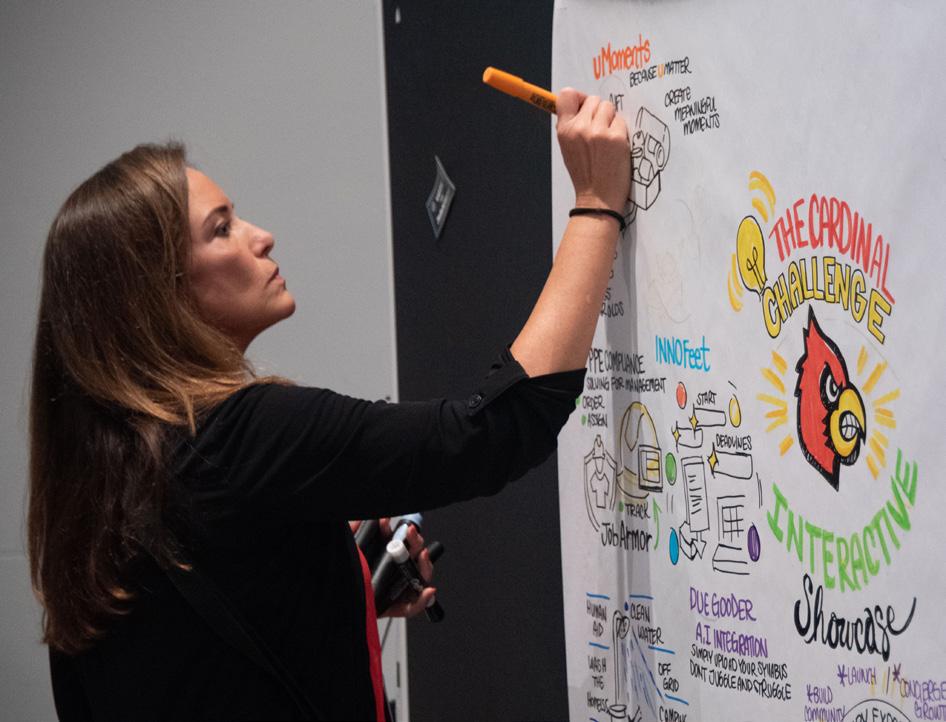
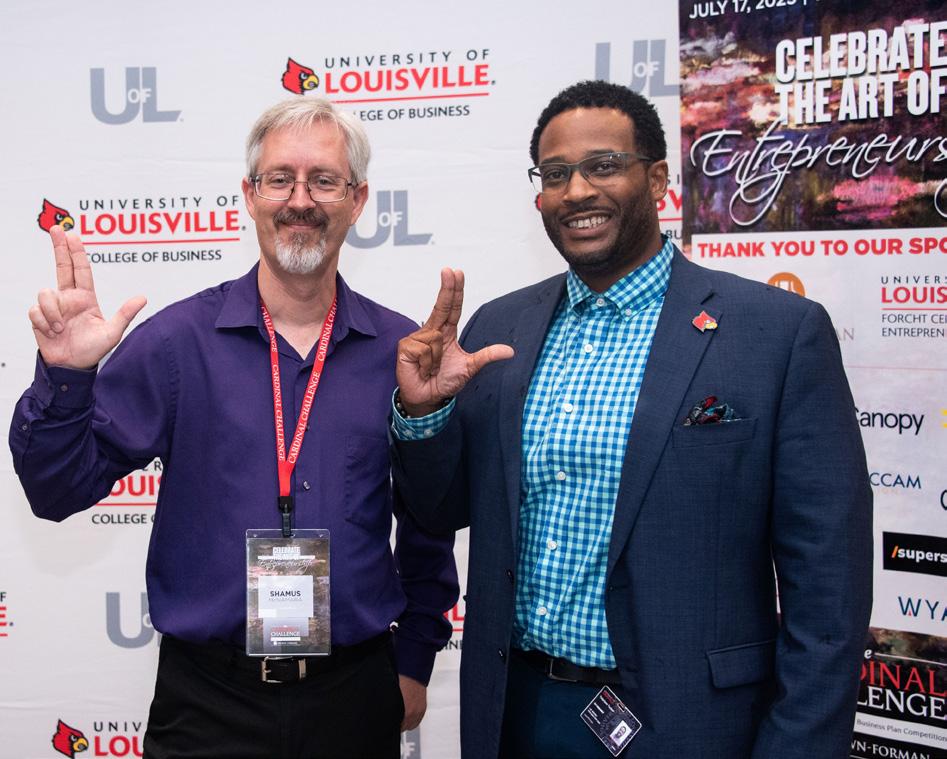
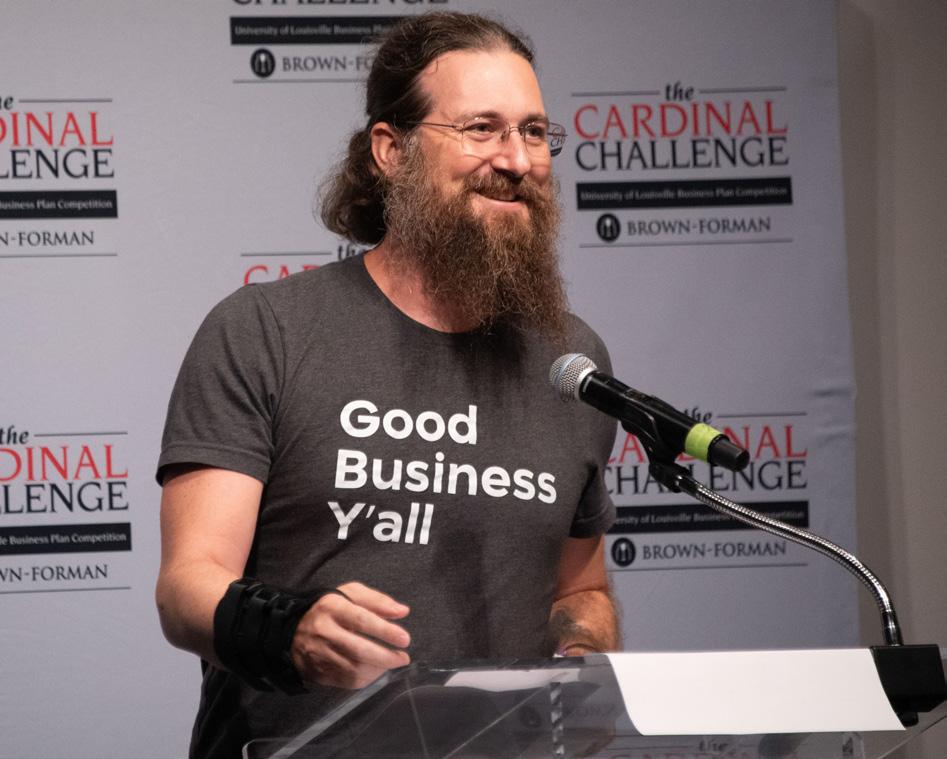
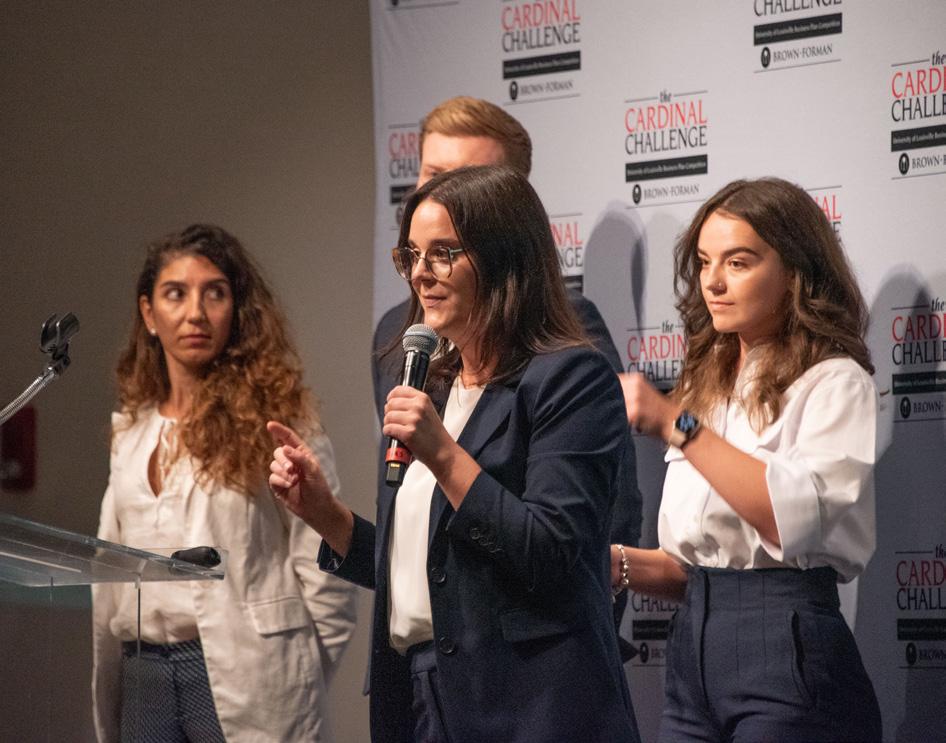
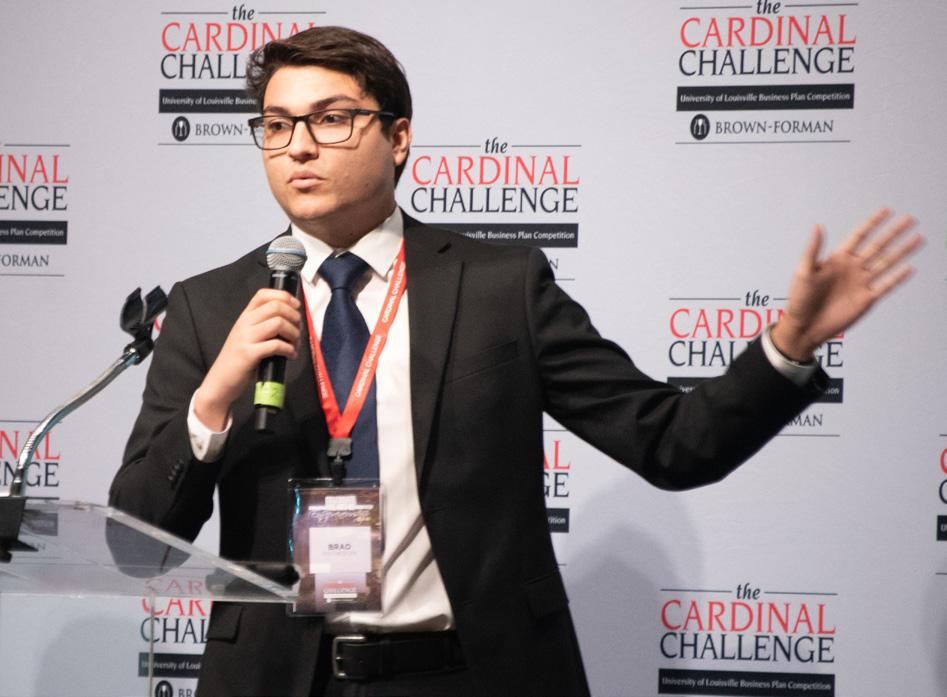
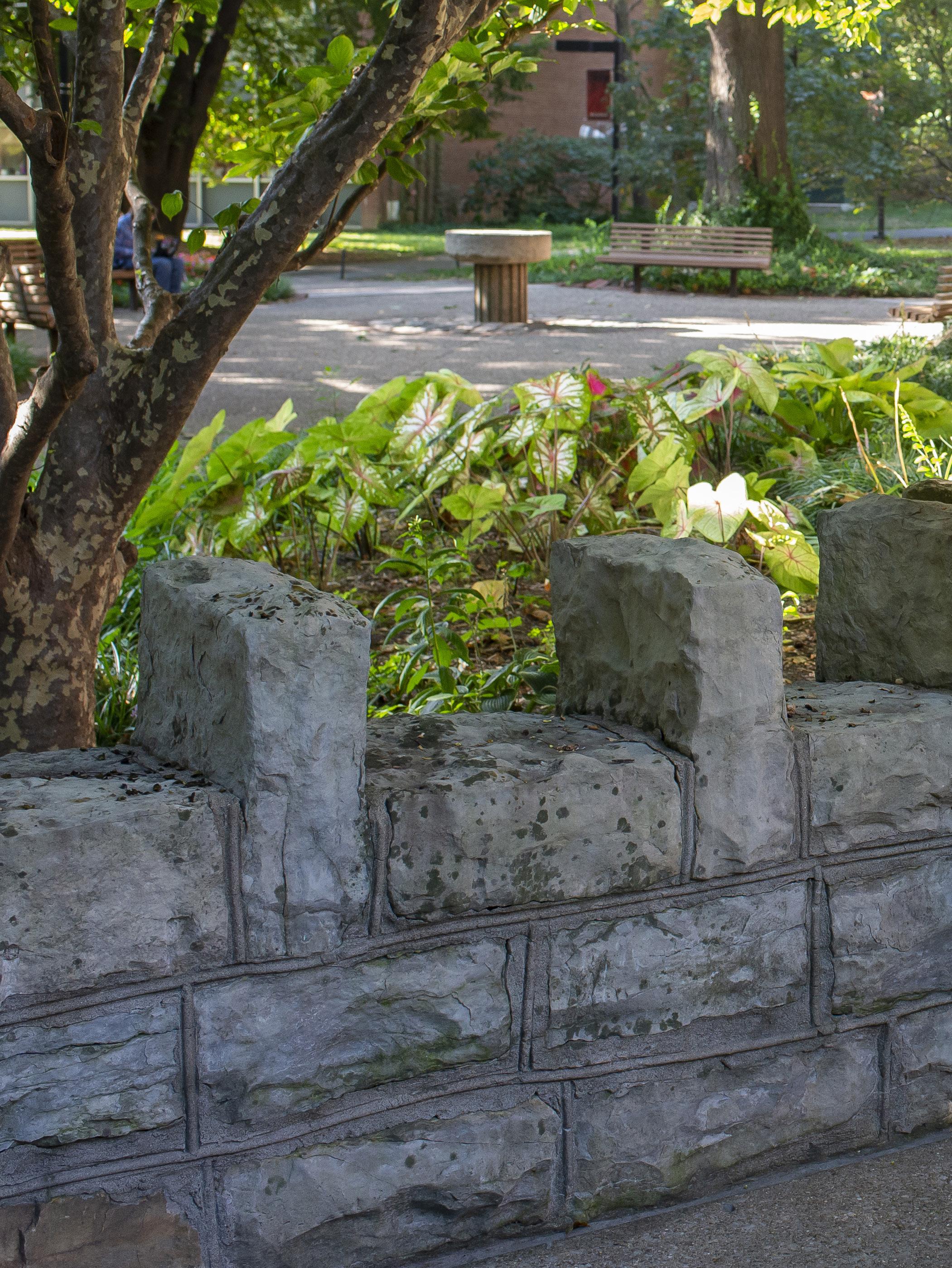
by Erica Hulse
University of Louisville College of Business Dean Amy Henley has previously referred to herself as “whiskey in a teacup.” During her first few months on campus, she’s proven she’s just that—refined but potent. While she may not quote Elvis outright, her southern roots and vintage TCB lightning bolt necklace, a trademark symbol worn by the legendary singer, reflect how she shows up as a woman, wife, mother and leader: focused, resilient and charged with purpose. Raised on Gulf Coast grit, college football and the kind of kitchen-table wisdom only a father forged in the fire of civil rights-era Mississippi could offer, Henley brings more than strategy to the college—she brings soul. Her leadership is about impact, not flash. Grounded in lived experience and fueled by quiet fire, Henley is a little less conversation and a little more action–especially when giving every student the chance to dream bigger than they were told was possible.
“I was born in Panama City, [and] grew up on the Gulf Coast, on the Gulf of Mexico,” said Henley. “Growing up on the beach is a whole different vibe,” she explained. While this was one of the best parts of her childhood, traveling to visit southern universities with her father was what truly lit a spark within her; each university visit fanned the flames of Henley’s desire to work in higher education. “We traveled to college sporting events all the time,” she said. “That’s where my love for higher education and my desire to be in higher education came from.”
From their shared joy of attending collegiate football games, to listening to the stories of his own experiences as a student, the way in which Henley lives and leads is
rooted in the quiet, fierce integrity of her father—a man who showed her what it meant to stand up for others when no one else would. During his time as a student at the University of Southern Mississippi in the late 1960s, he worked night shifts at a bread factory alongside one other man: a Black coworker who became his friend. “It was a segregated lunch room and they were the only two people in there,” Henley explained. “My dad said he knew better than to ask his friend to sit in the white section because it would cause trouble for him. So, my dad sat in the Black section with his friend.” The next morning, a limo pulled up outside—inside it was a member of the Ku Klux Klan. “They put the window down and said, ‘We hear you’re causing a lot of trouble around here, boy.’ He got the message, but he kept causing trouble.”
That same fearless spirit lives in her now. “He raised me to always speak up for those who don’t have the chance to speak up for themselves,” she said. “It was a big deal to him that his children be an example of that.” Two of her father’s sayings continue to guide her leadership: “Who did you help today?” and “Most people aren’t thoughtless—they’re just not thoughtful.” In Henley’s hands, those lessons have become a compass she now follows with clarity, empathy and a willingness to stand up for others when it matters most.
Before she transitioned into higher education, Henley spent her early career navigating the business world of finance, transportation and logistics. That experience allowed her to gain a seat
(Continued on page 14)
Dean Henley’s “TCB” necklace carries deep personal and professional meaning, intertwining her admiration for Elvis Presley, memories of her late father, and her leadership philosophy as Dean of the College of Business. A lifelong Elvis fan, Henley grew up hearing stories of her father and his best friend traveling across the Southeast photographing Elvis’s concerts. One particularly special family memory is when her mother— pregnant with Henley—attended an Elvis show and received one of his signature scarves, a keepsake the performer said should be given “to the baby.” That personal connection to Elvis and her father makes the TCB necklace especially significant.

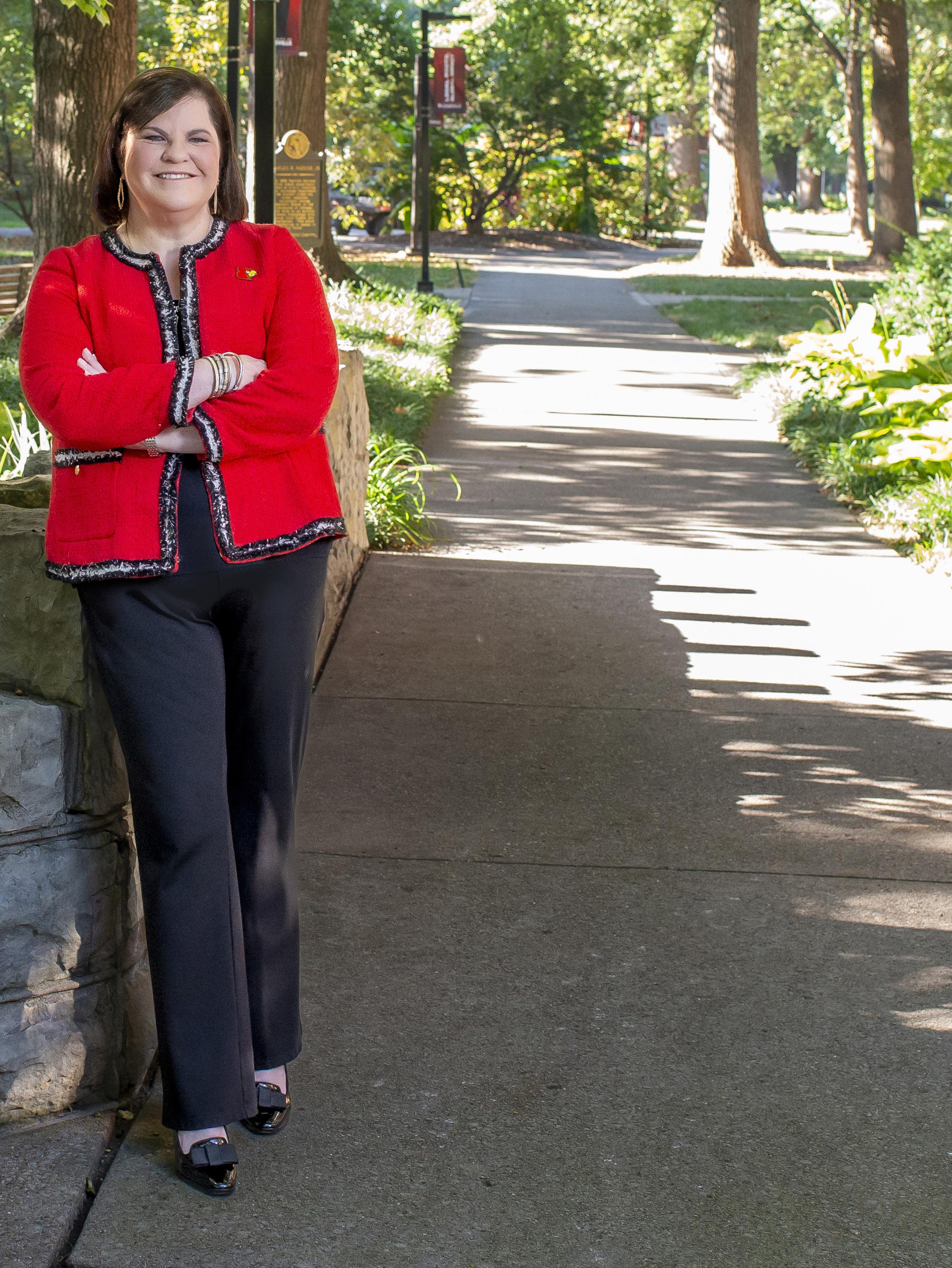
The vintage piece was a heartfelt gift from her husband, a history professor, who discovered it in a historical auction catalog. The necklace once belonged to Elvis’s bodyguard, Dave Hebler, a member of the “Memphis Mafia.” Its authenticity is reflected in its craftsmanship—made as a continuous strand of gold without a clasp, just like the originals Elvis commissioned for those closest to him. Her husband recognized that the necklace’s meaning—“Taking Care of Business in a Flash”—beautifully symbolized both her father’s memory and her own role as a business dean dedicated to serving her college community.
Beyond sentiment, the necklace also connects Henley to her southern roots and the values of resilience, hard work and humility that shaped her. Proud of her Mississippi heritage and inspired by Elvis’s rise from modest beginnings to global influence, she wears the TCB symbol as a daily reminder to “take care of her people” and to lead with purpose. For Dean Henley, the necklace isn’t just jewelry—it’s a reflection of family, legacy and leadership in action.
at the table and observe how decisions were made in the corporate world. As a young analyst reporting to a CFO, she was often the youngest voice in the room, but that didn’t keep her from noticing when things didn’t sit right. “Seeing how people were treated in the justification of finances didn’t make sense to me,” she recalled. “I thought, ‘Well, here are these C-suite executives that have 40 years of experience, [and] I’ve got four months. Surely they know what they’re doing better than I do—but how do they not see that?’”
The dissonance was apparent when it came to valuing employees. “Somebody would come in and want a $5,000 raise, and they would say, ‘Okay, we can do $3,000,’ and they would still lose the person. Then, they would…hire a brandnew person, and they would end up paying more than the original person wanted anyway,” she said. “They lost all that experience that is invaluable. That’s what I couldn’t understand as a 25-yearold.”
While she appreciated the technical skills she gained—especially in accounting and budgeting— it wasn’t enough to quell the growing fire inside her that was pulling her toward service to others. “I wasn’t making the difference that I wanted to feel like I was making,” Henley said. “I knew what higher education had done for me and the doors it could open, particularly for first-generation [and] low-income students. I just really wanted to make that difference.” Eventually, the repetition of corporate life became a wake-up call. “I remember telling one of the people in the accounting department at my corporate job, ‘I don’t want March 11 to be the same as July 10, and every day to be the same.’ She said, ‘Well, that’s life, Amy. That’s just called having a job.’ I said, ‘But it doesn’t have to be.’”
That drive to make a difference eventually led Henley back to the world that first sparked her imagination: higher education. However, returning to campus didn’t mean leaving behind high-stakes challenges. If anything, they only got bigger. As Dean of the University of North Dakota’s Nistler College of Business and Public Administration,
Henley faced the greatest challenge of her professional career: raising $70 million for a new building. Despite having no fundraising experience, she didn’t flinch–at least, not on the outside. “It was a little intimidating and [I thought,] ‘Okay, how do we do this? Where do we start?’” she admitted. Still, she took the challenge head-on, ultimately raising $118 million toward the project.
Little did Henley know that her leadership would once again be tested with the rise of COVID-19. This time, she wasn’t responsible for a brick-andmortar building, but the well-being of an entire community of students, faculty and staff. “When people are uncertain or frightened, they’re looking for direction,” she said. “I remember at one point telling the staff, ‘I don’t know these answers. Nobody really knows these answers right now. But what I can promise you is there’s a lot of hardworking, good people trying to figure out these answers.’”
Perhaps the most profound example of her heart-forward leadership came during the quiet, difficult summer of staff layoffs resulting from the pandemic. With moral support from her husband, current UofL Professor David Cason, Henley focused her energy on providing as much aid as possible to impacted employees. Spending hours in her home office, she crunched the numbers to help everyone stay afloat. “I calculated out what their breakeven point would be,” she explained. “I figured out how many hours every employee could work and still net out the same amount of income as they had through other sources,” she explained. “That was something I was really proud of because that’s something nobody saw…the way that I was able to determine that everybody stayed whole.”
Upon her arrival at UofL, it didn’t take long for Henley to sense the heartbeat of the college—and it wasn’t quiet. “I was pleasantly surprised by how many impassioned people are doing great things,” she said. “I was at the Cardinal Challenge [my] first week,” she said. “It was infectious, the passion people had, and that’s continued to be true.”
Now, Henley’s vision is focused on cultivating that passion into something more collaborative–
nurturing a sense of community within the college and developing a better means for departments to connect and interact more with one another.
“We have the foundation of community,” she said. “[However,] we’re a little more siloed…There’s a lot of great people doing a lot of great things, but they don’t necessarily know what the other ones are doing. If we engaged more directly and intentionally with one another, we would know where those pieces all fit together.”
That clarity of purpose also extends to how she defines success—not in titles or accolades, but in possibility. “Success for me in higher education is helping a kid believe that there are endless possibilities—helping a student dream a dream they never knew they could because maybe they didn’t have an example.” Henley knows from experience how transformative higher education can be—especially for those who’ve never been told they belong in the room.
As dedicated as she is to providing avenues for learning and growth, Henley also knows that opportunities for UofL business students could not happen without staff behind the scenes.
“[They] are the backbone of what we do,” she said. “They allow us to be faculty, and they allow us the luxury of getting to teach.” Ultimately, Henley’s goal for the college’s campus community is clear. “I want staff, faculty and students [to] always feel valued. That’s most critical to me. If [they] don’t feel valued, I have failed at my job.”
Henley finds meaning at home and off-campus in everyday rituals that remind her who she is beyond her role as dean. “I love nothing more than being a mom [to Collier and] a wife and partner to David,” she said. “He always says he runs the house, and I run the college, and it’s very true.”
With a family dynamic that is both supportive and strategic, she explains that, “as a working mom… I know how lucky I am that…[David’s] got his teaching schedule set up so that he can pick up our son and drop him off every day, and they have an amazing relationship.” That structure allows Henley to pour herself fully into the college, knowing her nine-year-old son is cared for, and
that he’ll be waiting at the end of a long day with news about caterpillars, not emails.
While Cason runs the home, he also provides her with continued encouragement and constructive feedback. “He’s not afraid to tell me, ‘Well, you overreacted to that,’ or ‘Do you think they would’ve treated a man that way?’” Henley said. It’s insight she’s learned to take seriously. “A lot of times, it’s what we put on ourselves,” she said. That internalized pressure is something she’s witnessed in the women around her and has worked to release.
Henley believes emotion in leadership isn’t weakness—it’s wisdom. Not one to shy away from the nuances of being a woman in a space that hasn’t always made room for sensitivity or femininity, she explained, “My associate dean of research back at Nistler always got a kick out of me. One day, he said, ‘You are just a spitfire.’ I said, ‘Don’t you know about southern women? We’re whiskey in a teacup.’” For Henley, that image isn’t a metaphor but a mission statement. Strong but graceful. Complex but clear. She is ready to lead, learn and advocate for those around her through every obstacle with empathy, precision and the insistence that doing the right thing matters. Just like her iconic necklace, each day Henley’s goal is to take care of business–even when no one’s watching.
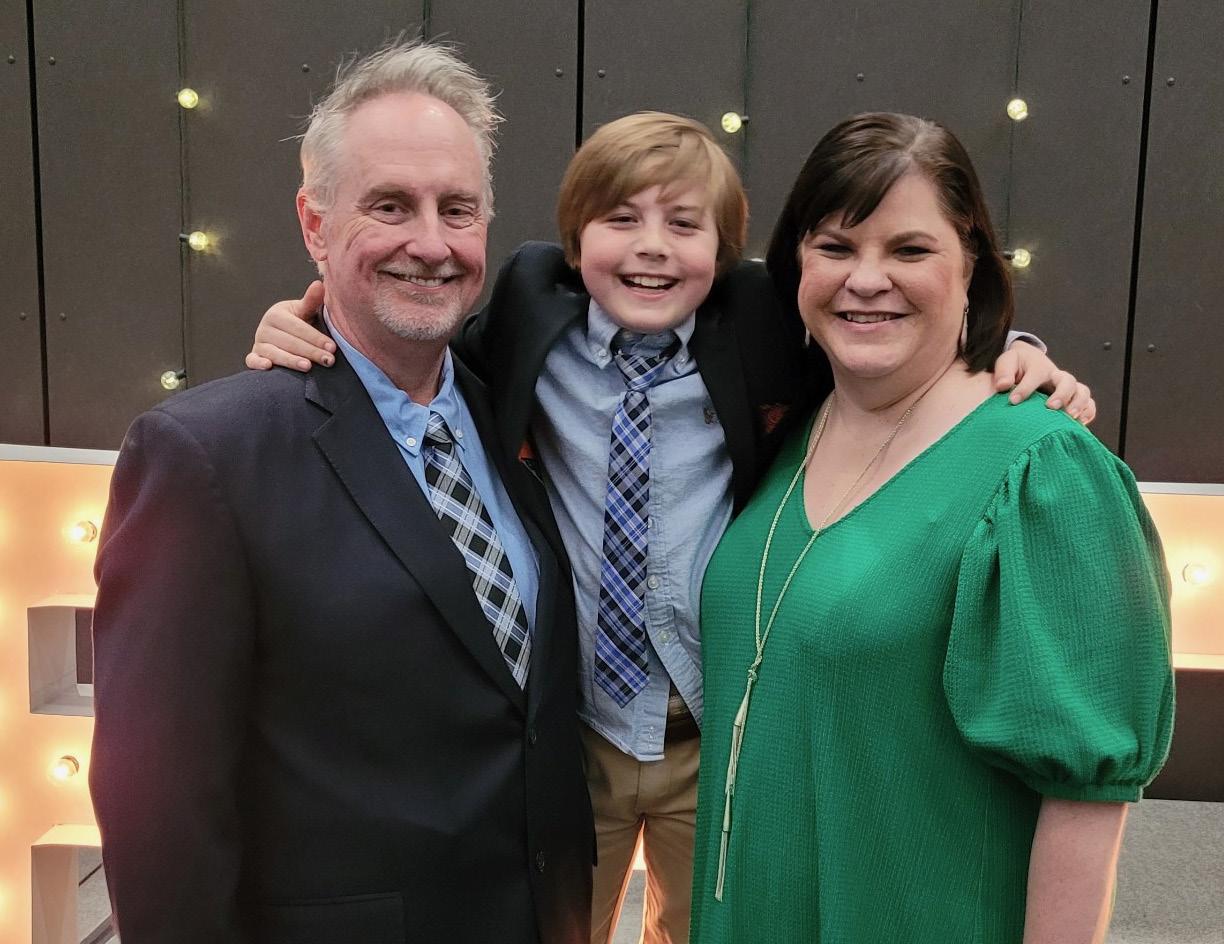





What emoji best represents you?
The smiley face with the tongue sticking out.
What’s your favorite color? RED of course!
Favorite book?

The Great Gatsby.
Favorite movie?
Steel Magnolias.
Favorite music genre?

That’s hard because I have such wide variety of music on my phone



Snoop Dogg, to Eric Church. If I have to pick one, it would be country.
Do you have a hidden talent?

I don’t cook often, but I cook a great Thanksgiving dinner (my dressing is especially good).
What food could you eat daily?
Chocolate ice cream.
What’s your guilty pleasure TV show and snack?

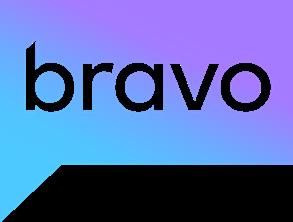
Anything on Bravo, especially Southern Charm, and a chocolate milkshake.
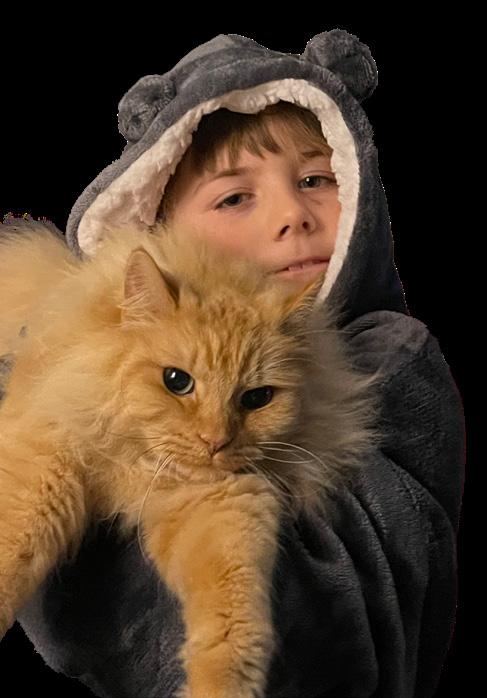


What are your top 3 bucket list items?

Any pets?
We have a clingy cat named Nugget, who my son and husband wanted. We also have the sweetest Goldendoodle, Maggie

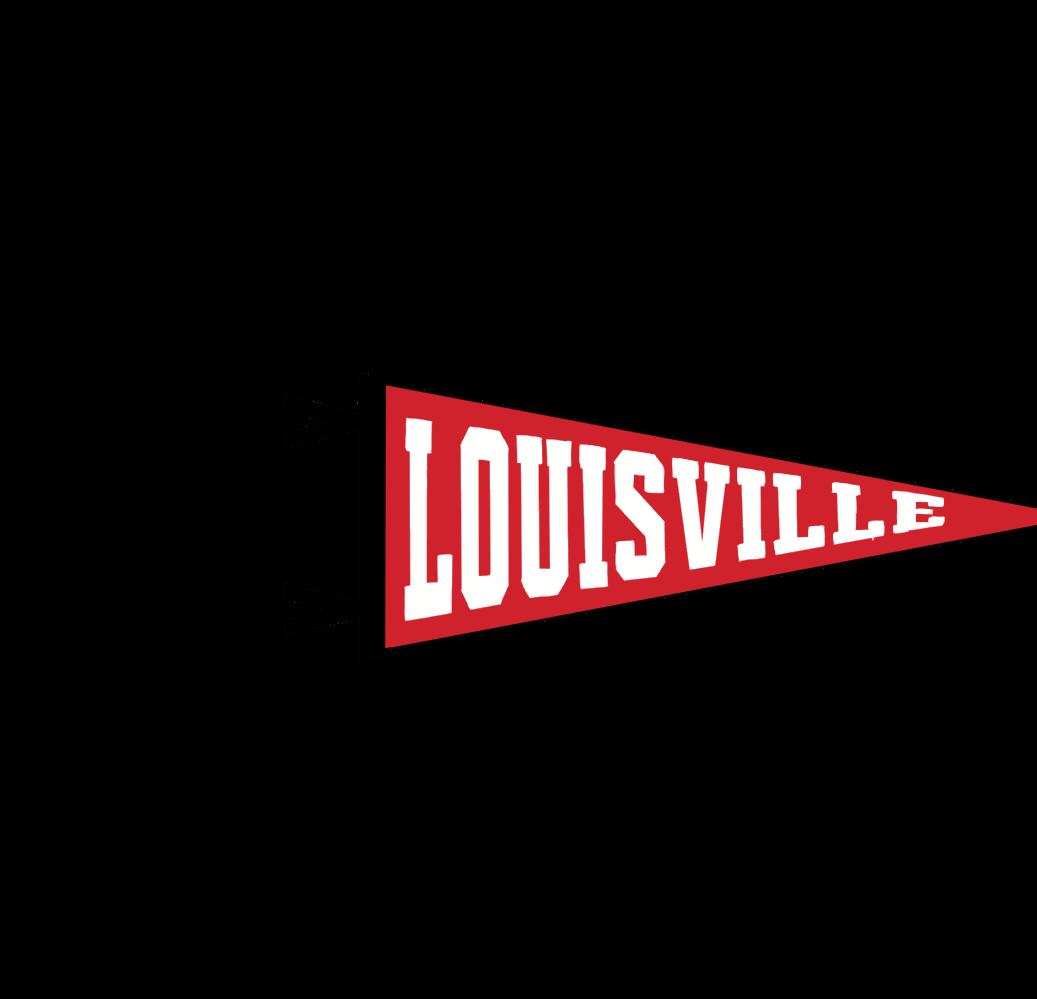
Spend Christmas in NYC and see Hamilton on Broadway • Travel through Italy
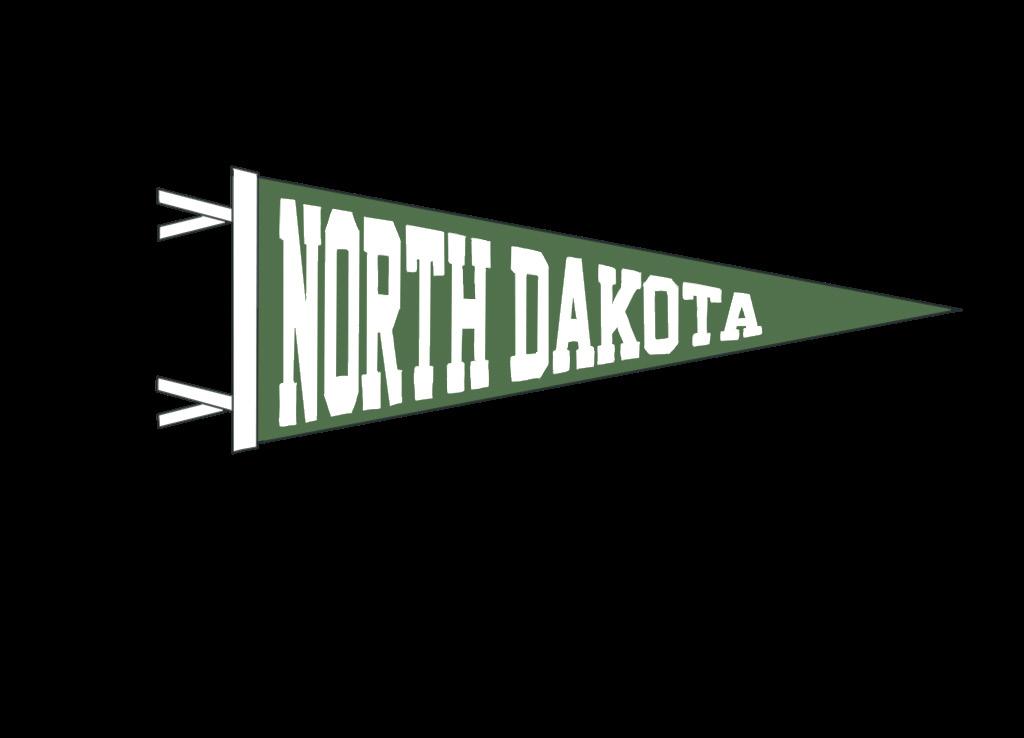
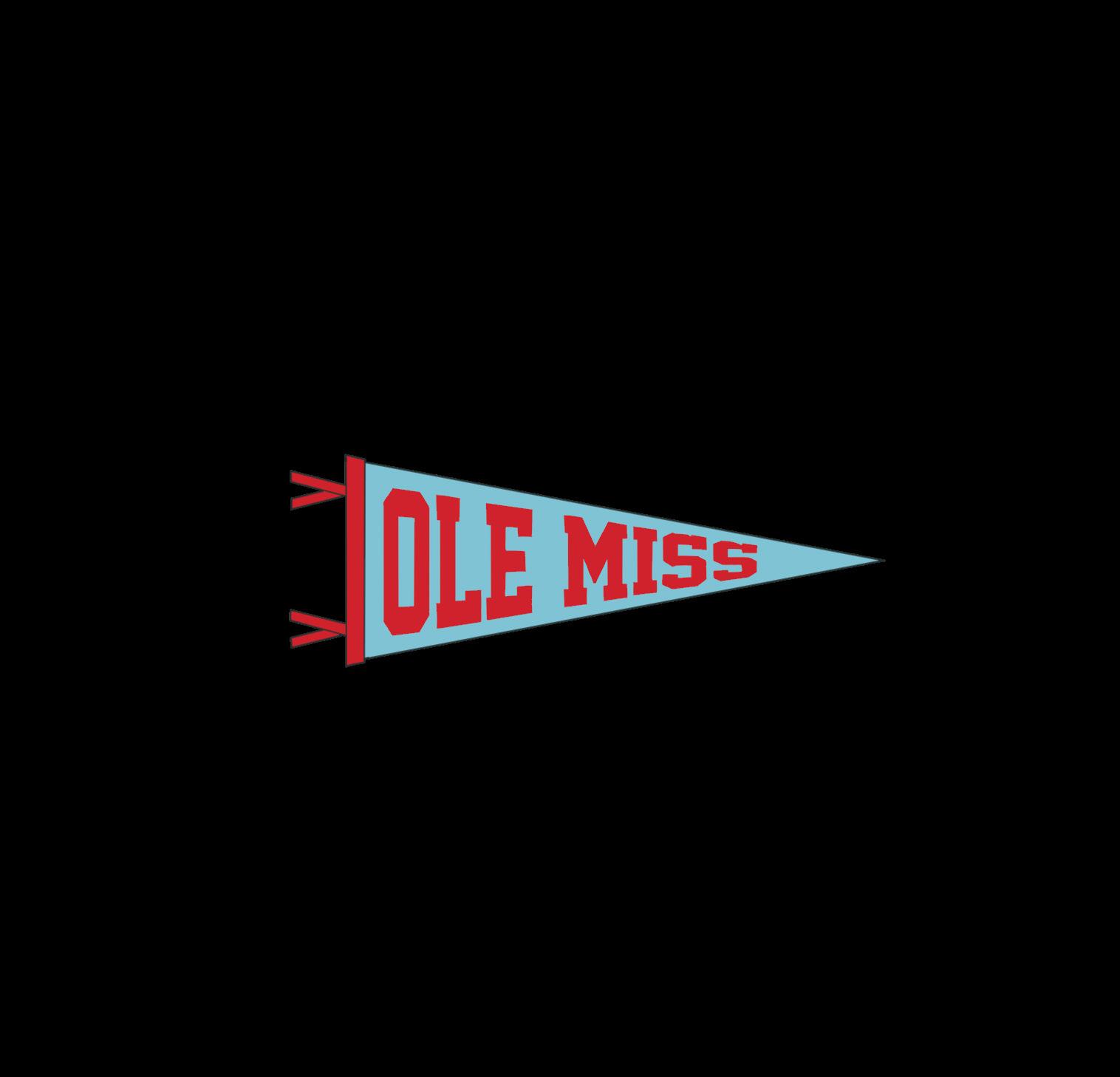

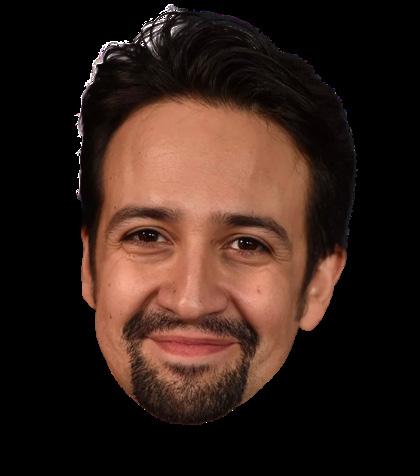
• Go to the Rose Bowl
If you were stuck on a desert island, what five things would you want with you?
Diet Coke, a good pillow and blanket, my phone, favorite pajamas and a stuffed Ewok that my son gave me.
How do you take your coffee?
I prefer an iced sweet tea.



What makes you feel nostalgic?
College football.
What was your first job?
Working as a sales associate at The Limited mainly for the discount).
Morning person or night owl?
Definitely a night owl.


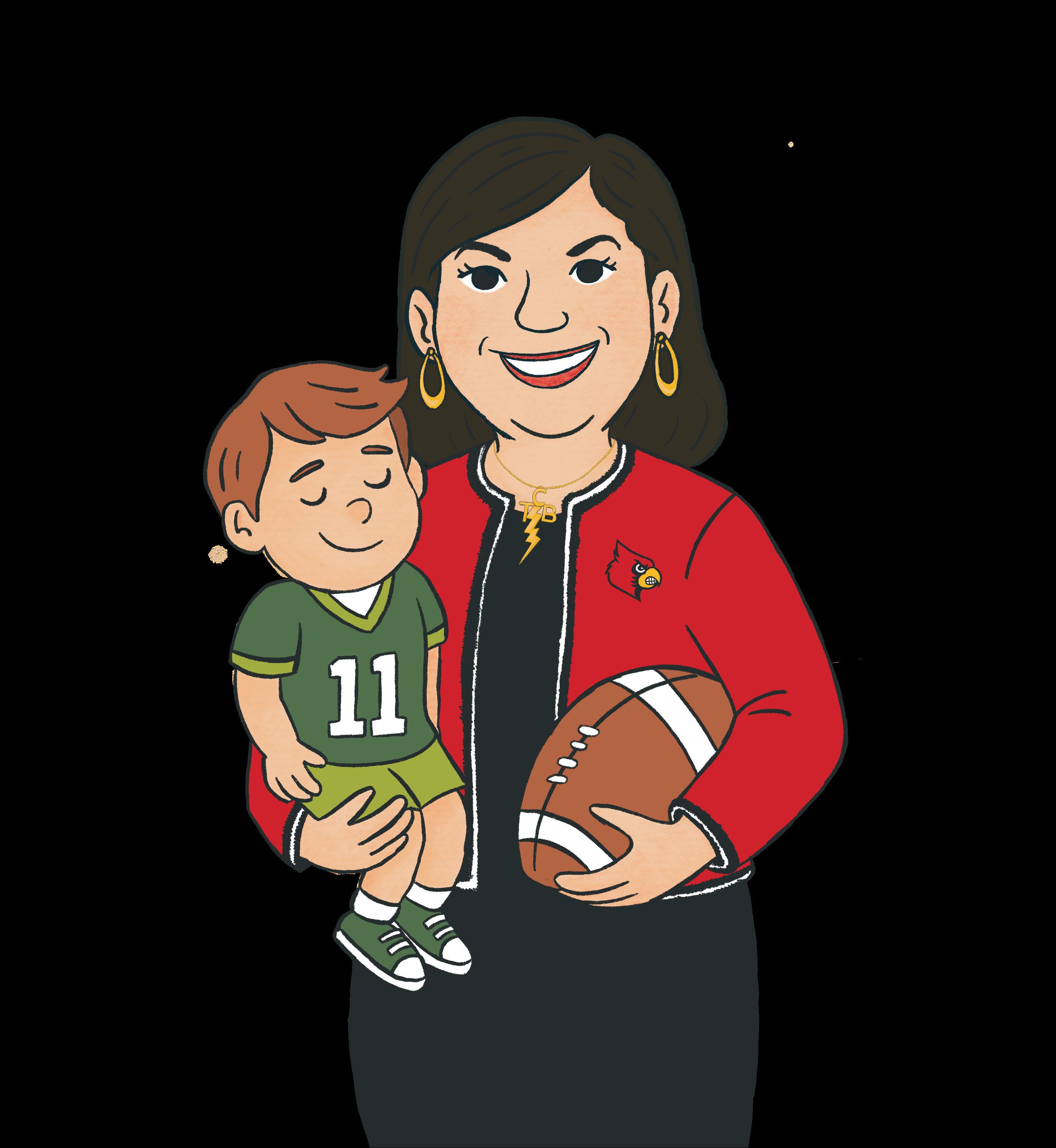


What’s one thing you can’t live without during the work week? My phone.
What’s the most important item in your office?
A picture of Georgia winning the national championship in 2021, a game my husband and I were at and he had waited 40 years for.
What app do you use the most?
The professional answer would be the email app, the personal answer is TMZ.


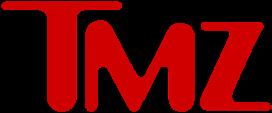
What’s something about you that might surprise students?
I love college football so much that I named my son after my favorite player.



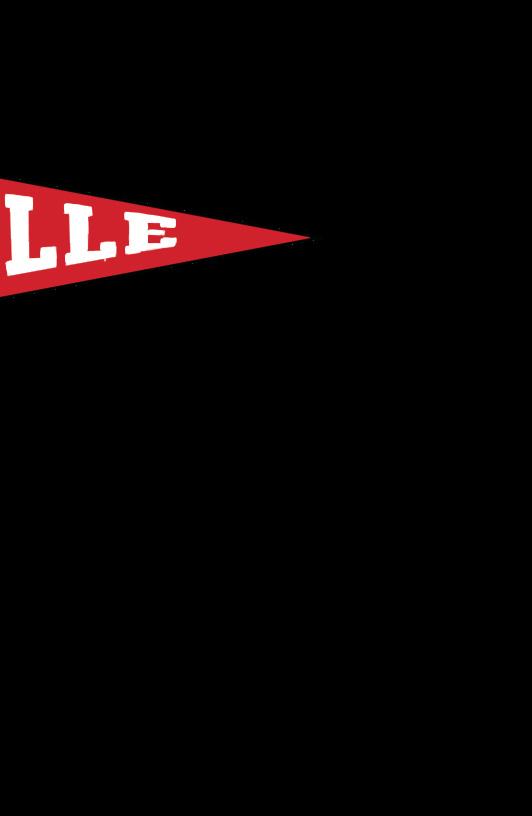

Randall Bufford Named 2025 Wilson Wyatt Alumnus of the Year
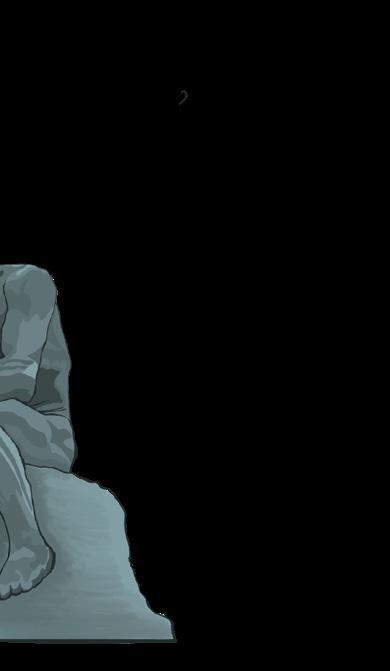
An accomplished entrepreneur and long-time University of Louisville supporter, College of Business alumnus Randall J. Bufford was recognized by the university as the 2025 Wilson Wyatt Alumnus of the Year, receiving his award during the university’s Homecoming Week celebration.
Bufford’s profound connection and enduring devotion to the university stands out as a foundational element of his remarkable journey. While earning his Bachelor of Science degree in Commerce/Accounting in 1981, he served as the head manager for UofL’s 1980
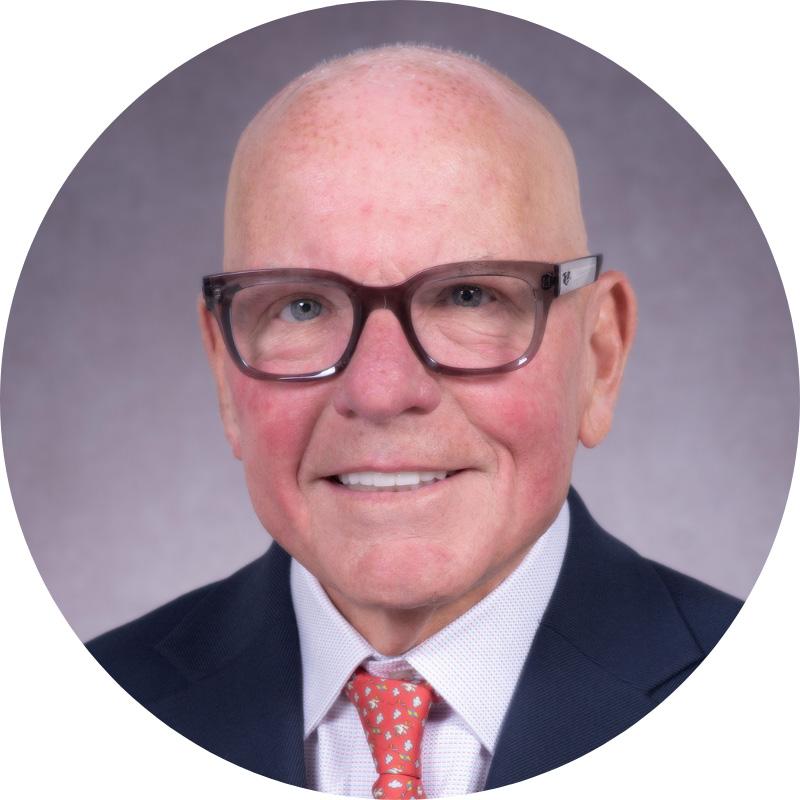
national championship-winning men’s basketball team, learning incredible life lessons from Head Coach Denny Crum, his assistants, team members and other staff.
While his professional achievements are extensive, Randall’s most prized accomplishment is his family, led by his wife, Susan. Their three sons and their families include: David, Rachel, Hayden and Hunter; Jon, Samantha and Beau; and Clinton, Paige and Palmer, with Pamela on the way. Last but certainly not least is Sasha, their beloved fourlegged companion. Bufford’s life work clearly demonstrates that success is not just about financial achievement, but about building legacies through service, both in business and at home.
COLLEGE OF BUSINESS ALUMNI FELLOW
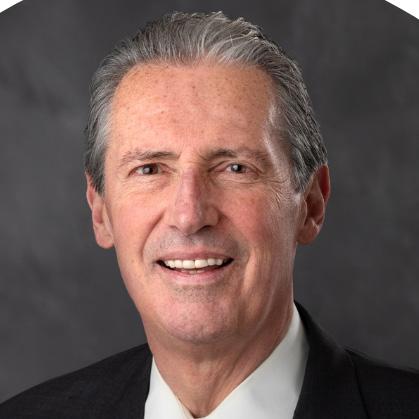
ALUMNI AMBASSADOR AWARD
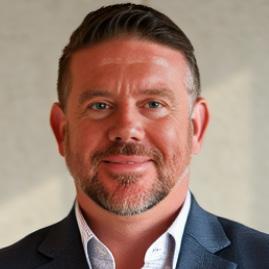
STUDENT AFFAIRS LEGACY AWARD
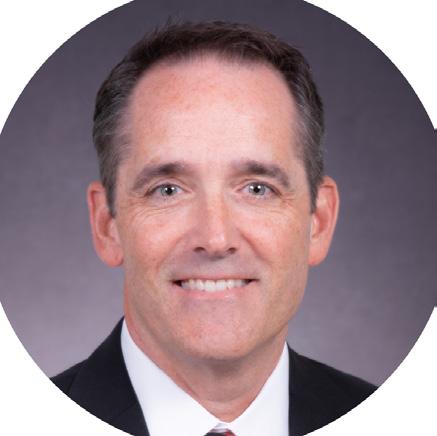
UNIVERSITY LIBRARIES ALUMNI FELLOW
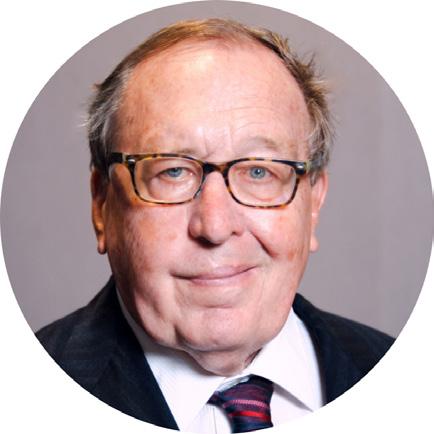
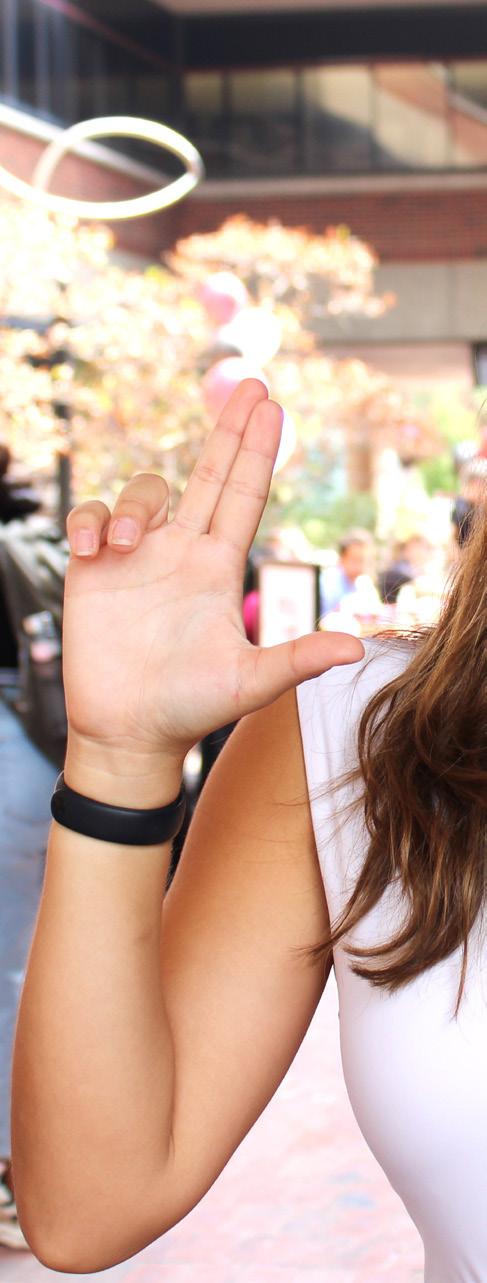
by Erica Hulse
The proof is in the performance of University of Louisville College of Business Student Council President Mariana Meneses, who, in her second year in the role, is continuing to deliver leadership and inclusivity as a supportive and collaborative student leader, producing events such as the college’s annual Biz Bash. With a passion for business inspired by her keto-friendly pastry shop, Meneses is taking the skills she’s developing at UofL and mixing them into the perfect recipe for a sweet future. We had the chance to talk with her about her love for family, adjusting to life in America, how her college experience has helped her develop boundaries and a school/life balance and her goals for her professional and academic future.
UofL: Please share more about your background.
MM: Growing up, my life was full of change. When I was five, my family and I moved from Colombia to Panama, and that shift really shaped who I am. I had to adjust to a whole new culture, a new country and find my place in a different environment. I was so young, but I remember how hard it was trying to make new friends. However, I was lucky enough to have my family supporting me everywhere I went.
When I realized I wanted to leave for college, it wasn’t an easy decision. My family means everything to me; we’ve always been so close. The thought of missing our daily meals together or our Sunday adventures really hit me hard. Those little routines were my comfort, my safe space. I remember sitting with my them and talking about it over and over, but they told me they were proud of me and no matter where I go, I’ll always have a home with them. That gave me the courage
to start this new chapter. As the older sister, I’ve always felt a responsibility to set a good example. It means a lot to see my younger sister looking up to me and following my path in her own way.
UofL: Why did you decide to earn your bachelor’s degree at UofL?
MM: Back home, there’s an exchange program where students can study for two years in Panama and two years at UofL, which makes it more affordable and accessible for international students. I decided to apply, and I was lucky enough to receive the Grawemeyer Scholarship for four years! After that, I visited campus and got completely lost. But what stood out to me was how many students helped me in that movement. That showed me how welcoming the UofL community is. It made me feel like this could be my home away from home, a place where I wouldn’t be judged, but appreciated for who I am.
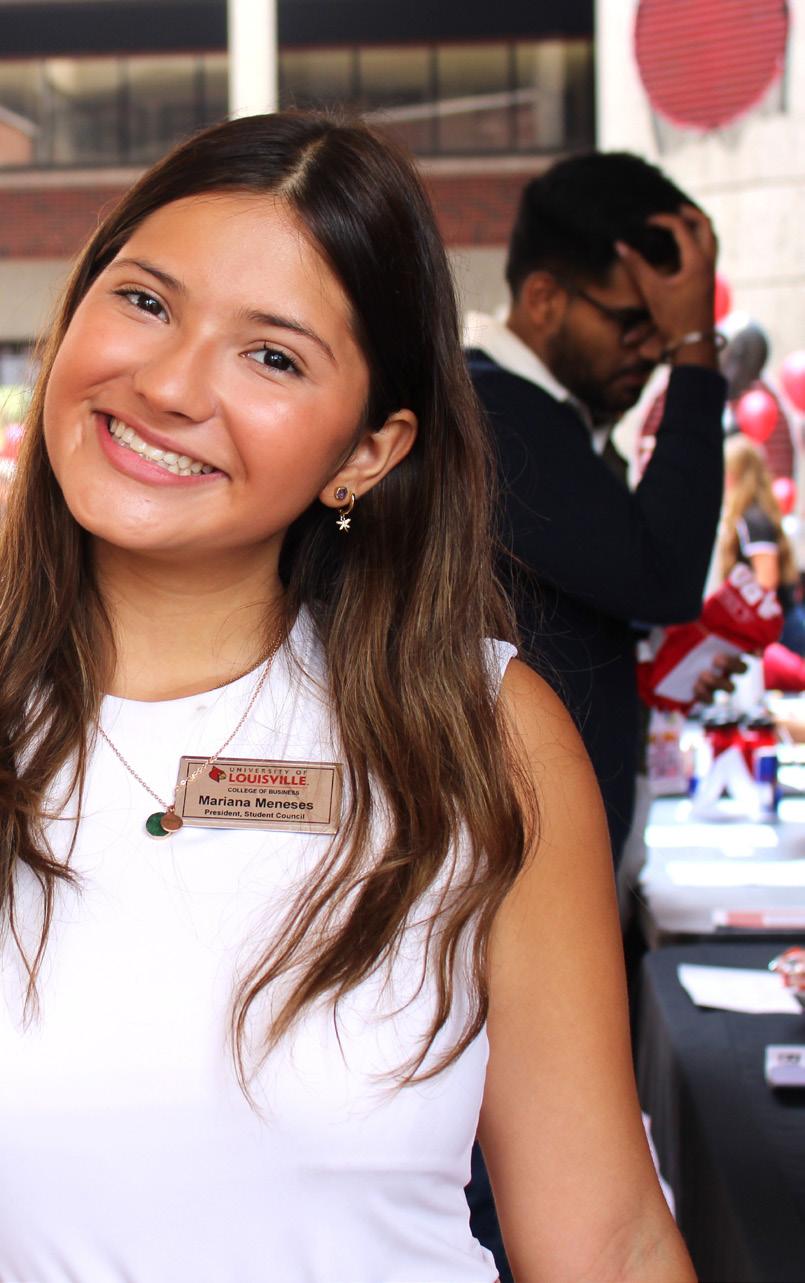
UofL: How did you develop an interest in business?
MM: During COVID, I wanted to do something more than just study, so I started my own business, Keto Bakery PTY. I baked and sold keto-friendly, glutenfree, sugar-free and lactose-free pastries through Instagram. I was running around delivering pastries myself, going on radio shows to talk about the business, and learning how to interact with customers. That whole experience made me realize how much I enjoyed the business world, and inspired me to major in it, as well as have a future in the corporate world.
UofL: What challenges have you overcome as a student here at UofL?
MM: One of the biggest challenges at UofL was balancing school with all the opportunities and leadership roles I wanted to take on. When I first got here, I was so excited to be involved, I wanted to join every club and say yes to every event. But before I knew it, I was stretched way too thin, and my academics started to be affected by my involvement. This past semester was tough, but it taught me a lot. I started using planners, Google Calendar, daily to-do lists and understanding that saying no is okay. I realized I had to be more intentional with my time and energy and focus on the things I’m passionate about. I also learned the importance of taking care of myself and setting time aside to relax and rest. Thanks to this, I got much better at managing multiple responsibilities and found a healthy way to balance my involvement and academics.
UofL: What are some of the most impactful experiences you have had at UofL?
MM: Some of the most impactful and personal experiences I’ve had at UofL have come from the people around me. I’ve built friendships that
have truly shaped my college for me, friends who support me, listen to me, and are always there when I need them. Just hanging out with my roommates, ranting about our days, or laughing over the little thing, those moments have become the highlight of my day. Furthermore, being part of such a diverse and welcoming community has also made a huge impact. I’ve felt like I belonged here from the beginning, and that sense of inclusion really matters, especially being far from home.
On a professional level, I’ve been the most impacted when I get to plan events and help students connect with industry professionals. Seeing how something I helped put together can make a difference in someone’s path feels amazing. Those moments have been so significant because they showed me that I made the right decision on coming here and getting involved.
UofL: What made you decide to run for the CoB Student Council as president, and what were you hoping to accomplish when you stepped into this position?
MM: I never actually planned to run for CoB Student Council, until Alexis Mowen, the president before me, encouraged me to get involved. She believed in me and saw potential in me that I hadn’t fully seen in myself yet. Thanks to her support, I decided to run and was elected VP. A little later, when Spencer Adkins, who was president at the time, graduated, he passed the torch to me. Having two people I really looked up to trust me with this role meant everything, and that’s what gave me the push to officially run for president.
When I stepped into the role, my biggest goal was to help others grow professionally and to show that true leadership is kind and inclusive. I also wanted to make college more fun and build a sense of community within the CoB. So far, I’ve hosted several fun events for students, I’m working on creating new traditions for the CoB and I’ve organized panels with diverse industry professionals to show that anyone can be successful.
UofL: What experience as president impacted you most and why?
MM: Seeing how the events I helped plan made a difference for others. For example, during the CEO Panel, students had the chance to network with the CEOs and build valuable connections. After the event, I received several emails from students thanking me, and even some from the CEOs saying how impressed they were with the students and the conversations they had. Knowing that something I organized helped open doors for other students has been the most rewarding and impactful experience as SC president.
UofL: As president, what is the greatest challenge you worked to overcome, and how did you find that solution?
MM: Honestly, the biggest challenge I’ve faced as president has been understanding the importance of communication and understanding others’ ideas. I’ve always been a bit of a perfectionist; I like when things are done right and done well. So, at first, I tried to take on everything myself and make sure every little detail was perfect. I started feeling overwhelmed, and that’s when I knew something had to change. I started having more honest conversations with my team just asking for help, creating committees so everyone could participate on something and being clear about expectations and creating space for everyone to contribute. That small shift changed everything. Once I stopped trying to do it all alone, people showed up, supported me and even brought in ideas I hadn’t thought of.
UofL: What else are you hoping to accomplish during your time at the CoB, and what are your goals once you graduate?
MM: While I’m at the CoB, I really want to make the most of every opportunity available. Whether that’s connecting with industry professionals, gaining hands-on experience through internships or helping other students grow professionally through student council events. After graduation, I’m hoping to pursue my master’s in business and eventually work in corporate strategy or for a multinational company where I can keep learning and making an impact.
UofL: Would you encourage prospective students to choose the UofL College of Business for their business degree and if so, why?
—Mariana Meneses
MM: Definitely! A business degree opens doors in nearly any career field. At UofL, you’ll have the opportunity to connect with industry leaders, expand your professional network quickly and gain access to exclusive opportunities that can jumpstart your career while still being in undergrad.
UofL: Is there anything else you would like to share with our readers?
MM: If there’s something you’re passionate about, just go for it. Don’t wait for the right moment or for everyone else to believe in you. Not everyone’s going to get it at first, and that’s okay. If it matters to you, that’s enough. Trust yourself, take the risk and figure it out as you go. You may fail but you can always get back up and you will never know what you can do if you don’t try.
I’ve grown as a leader due to overcoming this challenge; I realized that’s just not efficient, and more importantly, that’s not what being a leader is about. I’ve learned that I need to communicate with others and count on their support. I’ve learned how to be more understanding with others when things don’t go as planned, and more forgiving with myself, too.
Looking for a business program you can tailor to fit your goals? Learn about our wide variety of undergraduate business majors, minors and certificates at business.louisville.edu
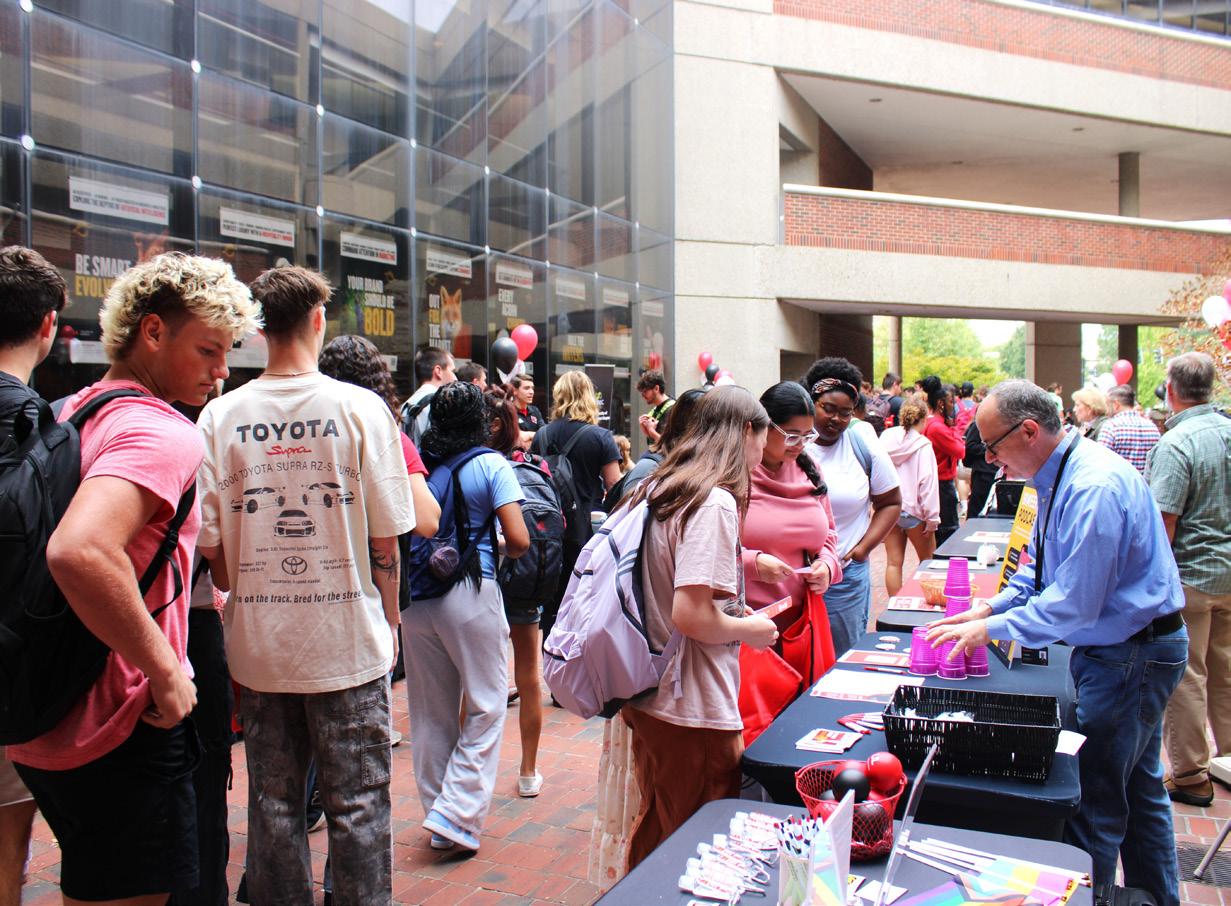
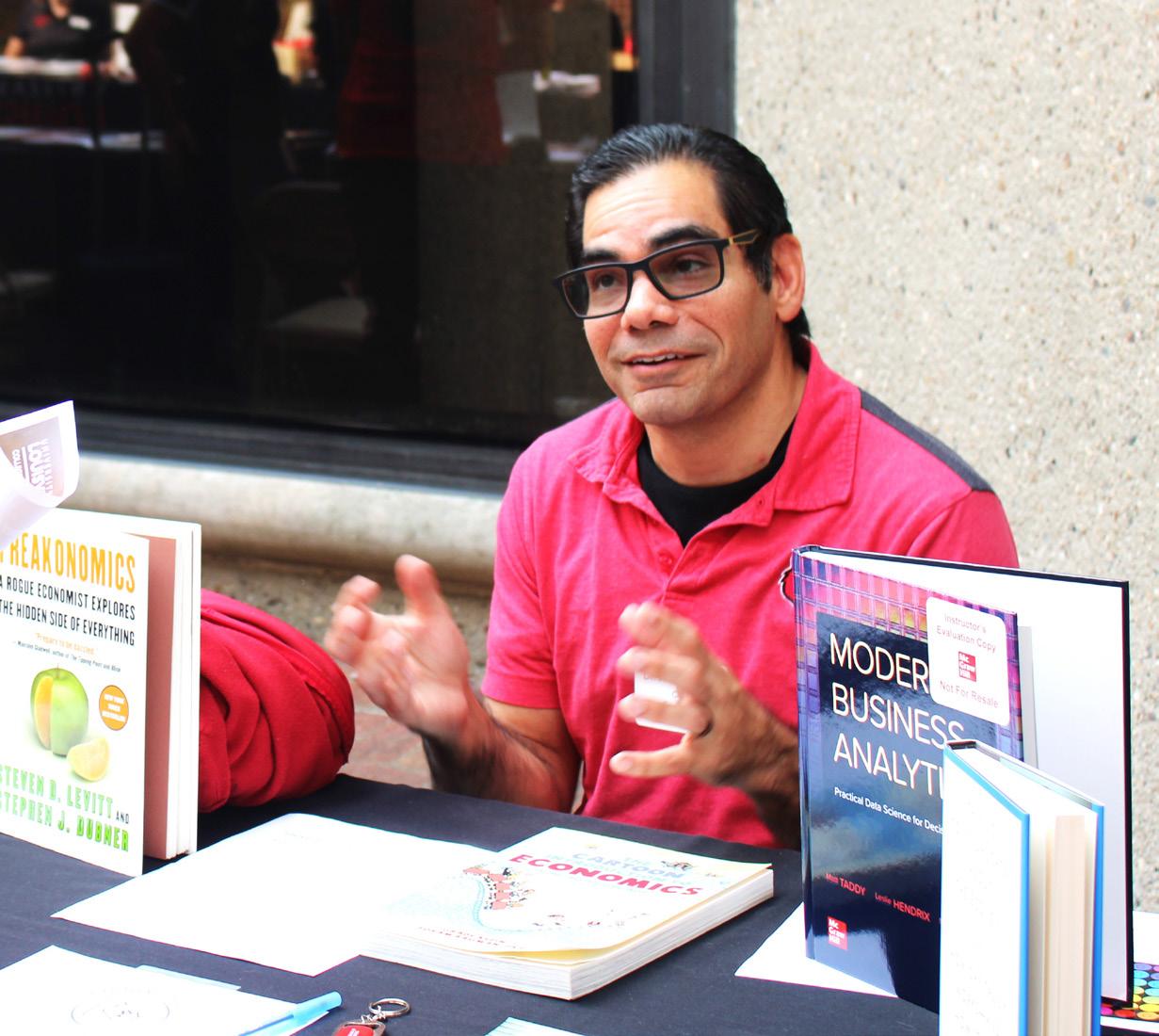
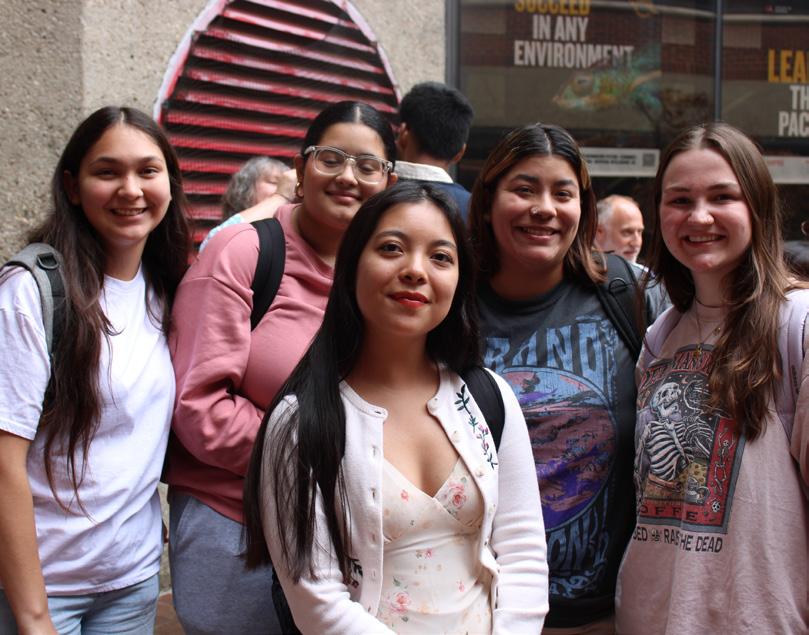
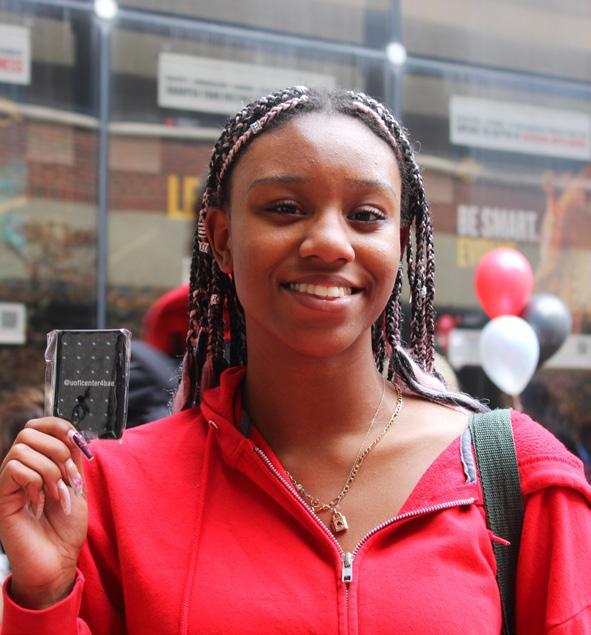
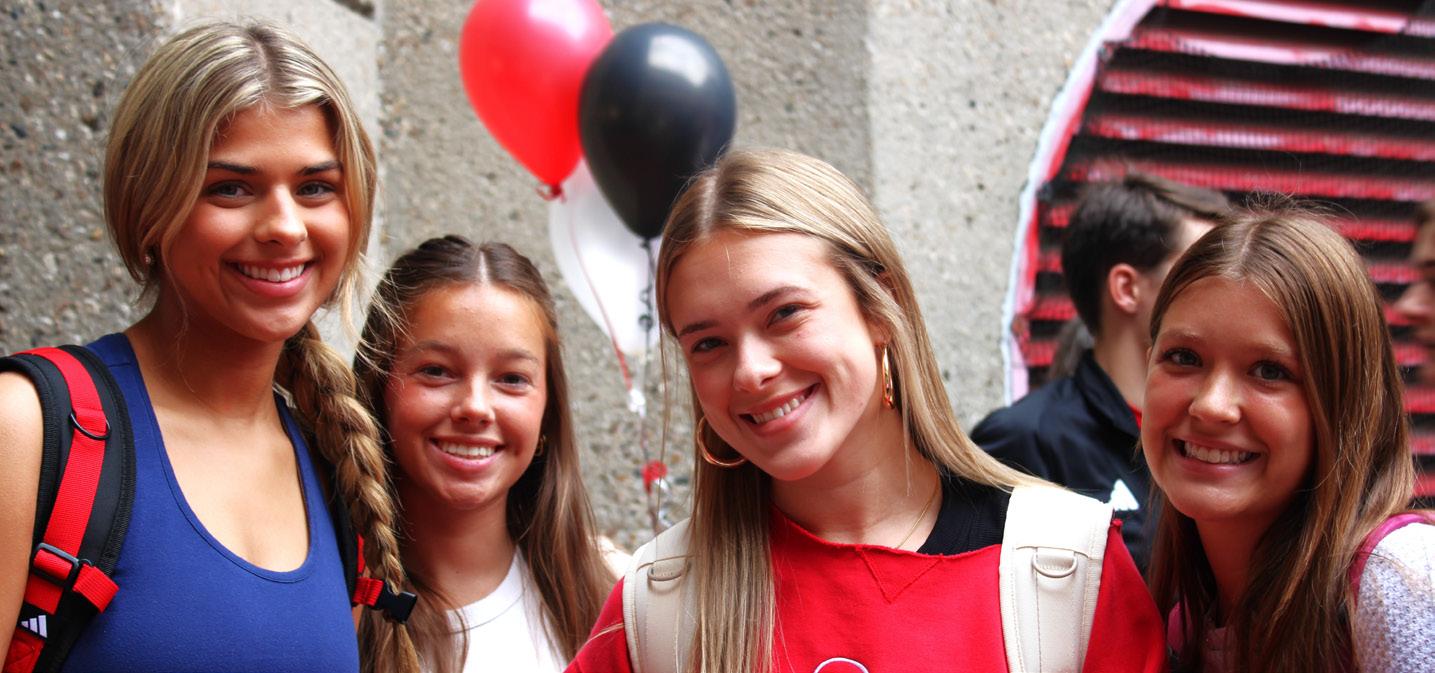
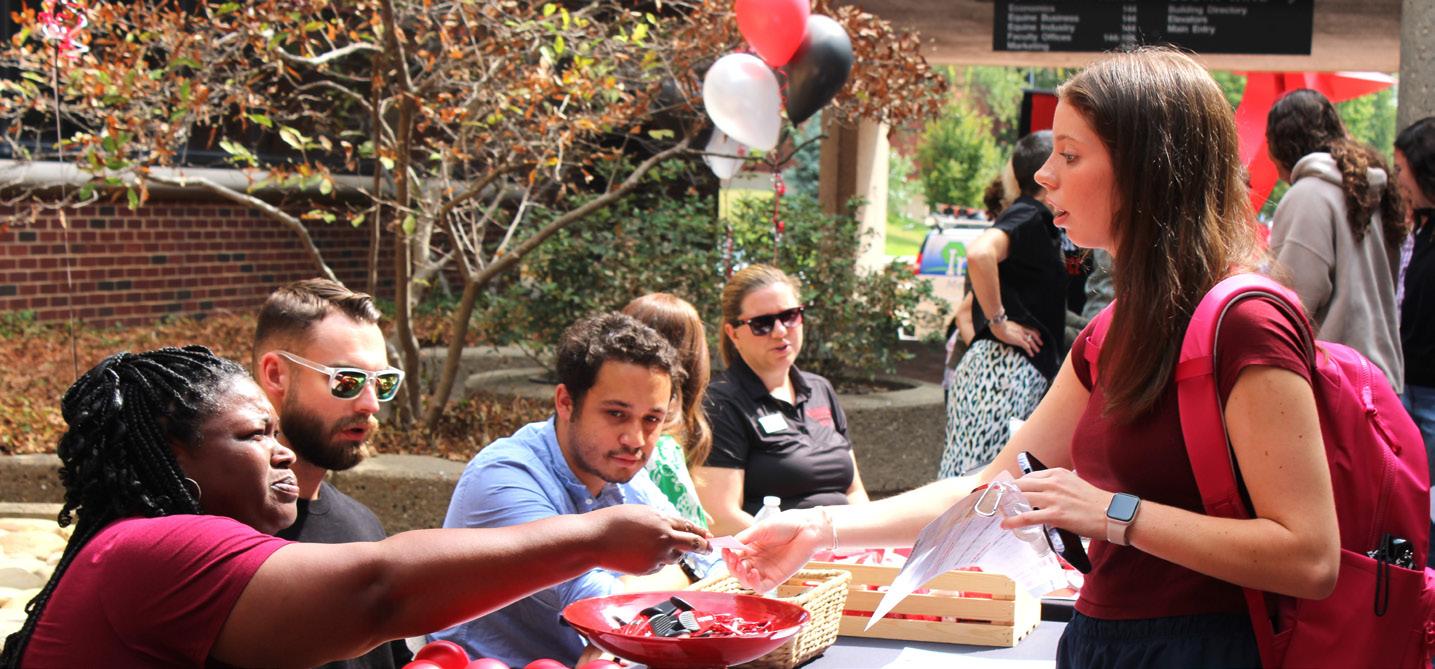
To kick off the semester and welcome new business Cardinals, Biz Bash—a resource fair hosted by the University of Louisville College of Business Student Council—brought together more than 20 booths offering information, resources and ways to get involved across UofL’s campus. Students enjoyed free burgers and hot dogs while connecting with representatives from academic departments like economics and marketing, support services such as the Ulmer Career Center and student advising, and peer organizations including Beta Alpha Psi and the National Association of Black Accountants. University-wide resources like REACH, the Center for Belonging, Access and Engagement, and UofL Libraries also participated.
by Erica Hulse
GRADUATE TAYLOR PRICE GROWS FROM EXPERIENCES WITH THE CARDINAL BRIDGE ACADEMY, FINDS FORTITUDE AMIDST OBSTACLES
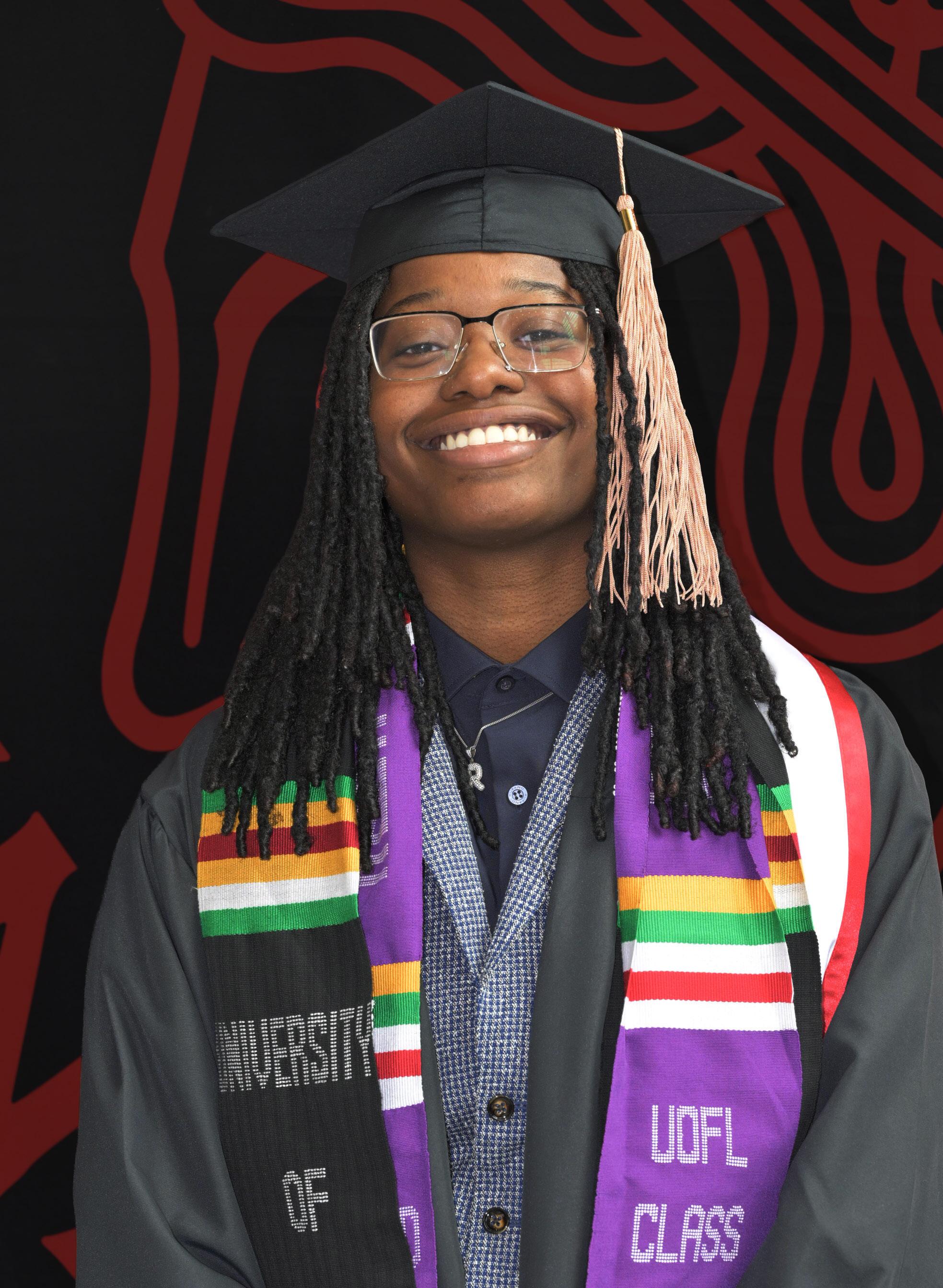
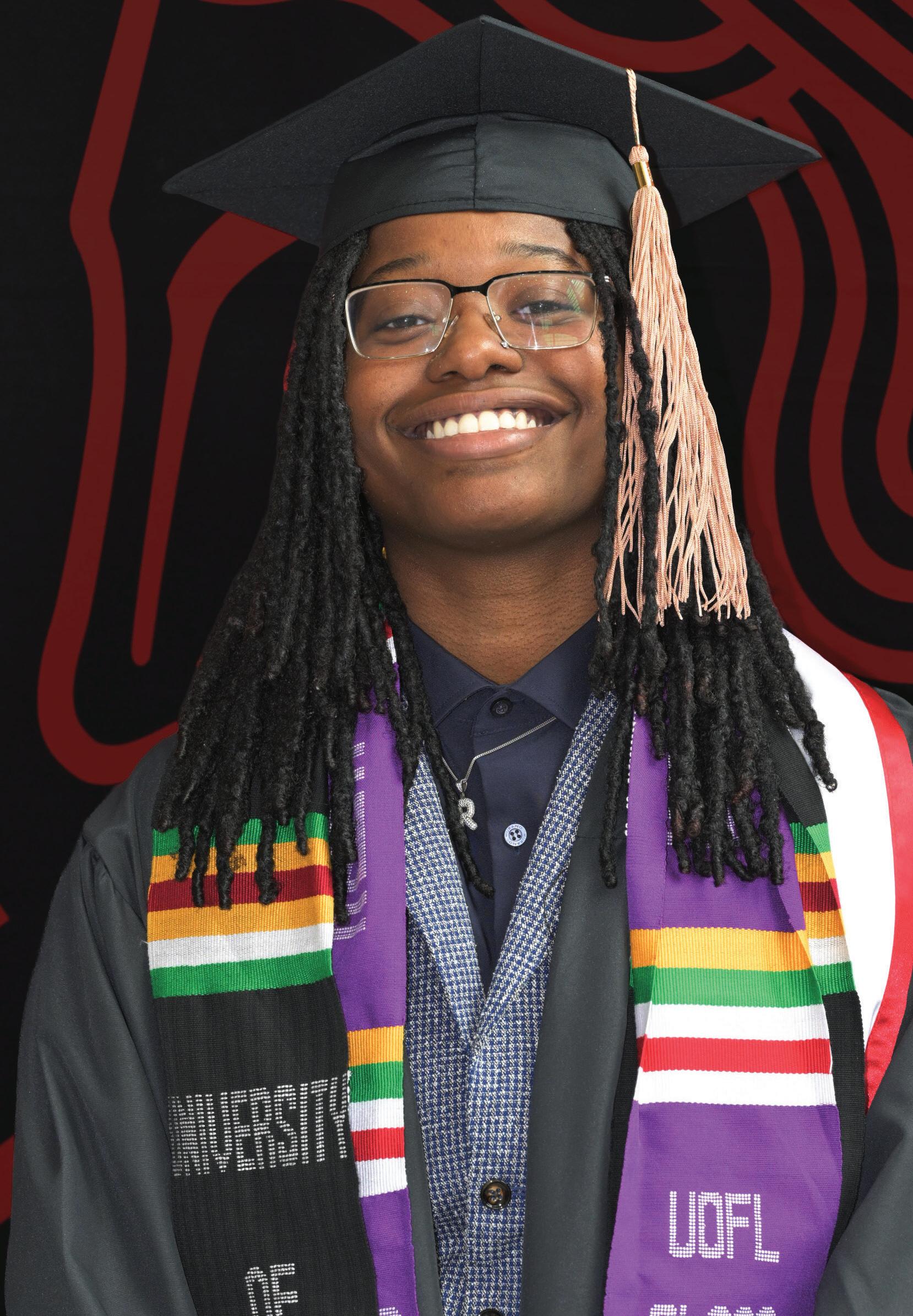
Before graduate Taylor Price walked across the stage in May 2025 with a business degree and a job offer in hand, she was a child who loved homework. “I’ve always been a school person,” she said. “Even when I was in first and second grade, I would spend my summers doing fifth grade work.”
That deep-rooted love of learning—paired with a natural drive to do things well—followed her from the classroom to the basketball court and eventually to the College of Business at the University of Louisville. However, the real transformation happened between those milestones, when motivation wore thin. Now, with a full-time position already secured at Republic Bank, Price is reflecting on the real story behind her success—and how her experiences with Executive Director of Undergraduate Programs Raymond Green, the Cardinal Bridge Academy, a basketball injury and one college course helped her overcome personal and academic challenges and build resilience that has resulted in her success.
Price first connected with Green as an eighthgrade student when he reached out to her family about some unique academic opportunities as she advanced into high school. Always driven toward educational challenges, once Price began her academic journey at Central High School, where
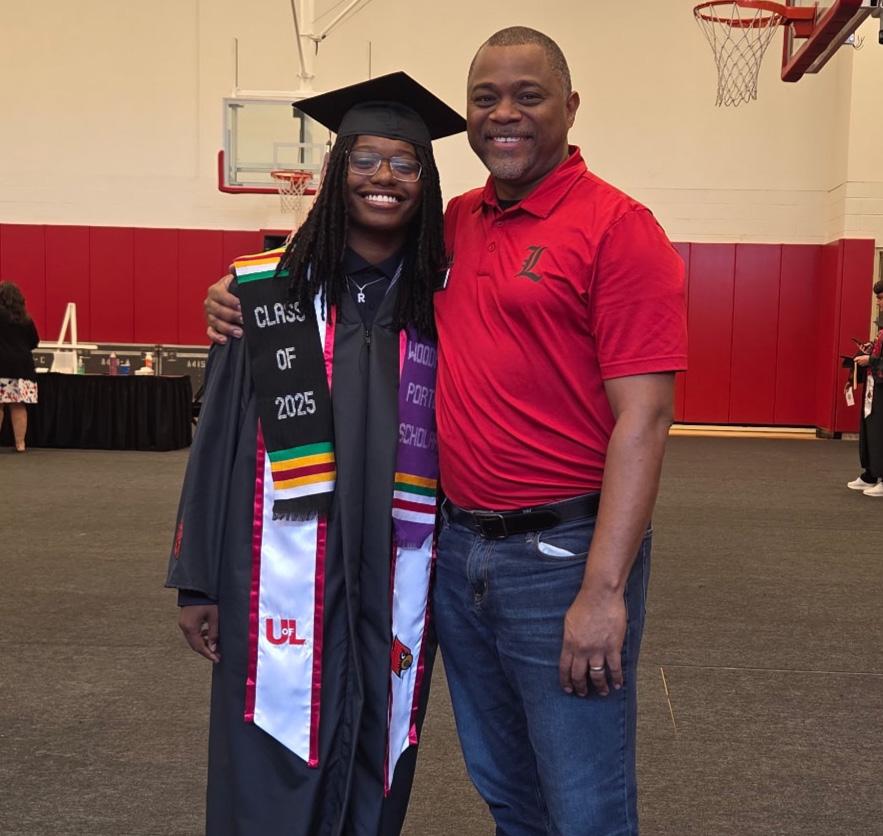
Green served as principal, she was informed of the launch of the Cardinal Bridge Academy–a CoB program which brought together her desire to challenge herself academically and get ahead on earning college credits while completing her high school degree. “I had been interested in going into business because both my parents have a business administration degree,” she shared. “What made the CBA interesting was [that] I
TAYLOR BEGAN HIGH SCHOOL LIKE HER PEERS, EAGER TO EXCEL. HOWEVER SHE STOOD OUT IN HER DISPOSITION, HER COMMITMENT TO EXCELLENCE
—Raymond Green
would get actual college credit. I thought, ‘this is a way for when I come in on my freshman semester, I can ease into it rather than taking a full load.’ I was able to take 13 credit hours during my first semester of college and I’m still graduating on time–that’s thanks to the CBA, because I earned those three credits from there.”
Green, reflecting on his experience as Price’s mentor during her high school years, explained that, “Taylor began high school like her peers, eager to excel. However, she stood out in her disposition, her commitment to excellence and her overall approach to interacting with teachers, coaches and peers.” Green’s academic mentorship with Price evolved in ways that allowed the mentor and mentee to connect not just outside the classroom, but inside as well. “I had the privilege of teaching Taylor in Management 305, our Intro
to Human Resources class. In this one semester, I saw Taylor rely less on her talent, and more on her work ethic.”
Building resilience didn’t just happen in her high school classrooms; for Price, the ability to become a self-starter and self-motivator and to hold herself accountable, happened from her experiences on the basketball court. “I had dreams of playing in college through elementary, middle and partially high school. But my senior year I injured my ankle and it tanked my confidence completely,” she explained. While difficult for Price, the event served to prepare her for collegiate life in ways she had not expected. “I think not playing basketball has benefited me more in college than hurt me. I feel like it’s taught me more lessons, especially about accountability and discipline,” she shared. “In basketball you always had someone keeping you accountable. When I got to college, it was all up to me. So that was really an eye-opener for sure.”
Leaning into the fortitude and resilience Price had developed became necessary during her first semester due to a particularly challenging course–microeconomics, which caused her to approach not just her learning but self-care with purpose and dedication. “I remember my first test was a 67% and I [said], ‘I have to find a way to fix this, because I just can’t live with this.’ So immediately I started being more intentional about my work,” she said. “I wasn’t just following along with the professor and doing the work–I was making connections. If there were any opportunities within the homework for me to practice, I would do that. In doing that, I was able to create discipline in a lot of other areas of my life.”
The effort she poured into that course created a positive domino effect in her world. “I tell people a lot of times, it’s hard to be two different people. When you have habits in one place, they’ll probably carry over in others. Building those habits in class allowed me to get better with my health and nutrition. I started going to the gym and being more disciplined about things like
that–even just small things like self-care and day-to-day routines. College courses actually helped me with that because I was building the accountability and disciplinary habits that I needed.”
As she graduates and begins a new position in auditing for Republic Bank, Price reflected on the experiences both the CBA and the college have had on her academic and individual growth, and encourages those considering the organization take the chance and get involved. “It allows you to get ahead and prepare for what’s coming next,” she explained. “I really feel like the CBA provided insight for what college life looks like, [with] seeing the workload, how college functions, how to properly communicate with a professor and how professors communicate with you. I think that’s super important.”
Launched in 2020 by Green and Professor Nat Irvin, the CBA aims to give underserved area high school students “access to higher education through pathways other than traditional test scores [by] providing the opportunity for students to show they can do [the] work taught by our faculty,” Green said. With a focus on holistic support, including academic preparation, scholarship writing and mentorship, the program has grown exponentially, with over 300 students participating during the 2024-25 academic year.
While the CBA aims to aid as many high school students as possible, Green explained the necessity of financial donors and professional mentors to sustain this innovative program. “Although we have a robust program in place, we cannot do this alone. Taylor and her colleagues are proof that the program works.”
If you have a passion for programming like the Cardinal Bridge Academy, please reach out at raymond.green@ louisville.edu. Our region is an untapped surplus of talent. The CBA helps us identify the next Taylor and the next leaders of our city, commonwealth and nation.
From polos to hoodies, we’ve got everything you need to show off your Biz pride. Mix, match and make it yours!
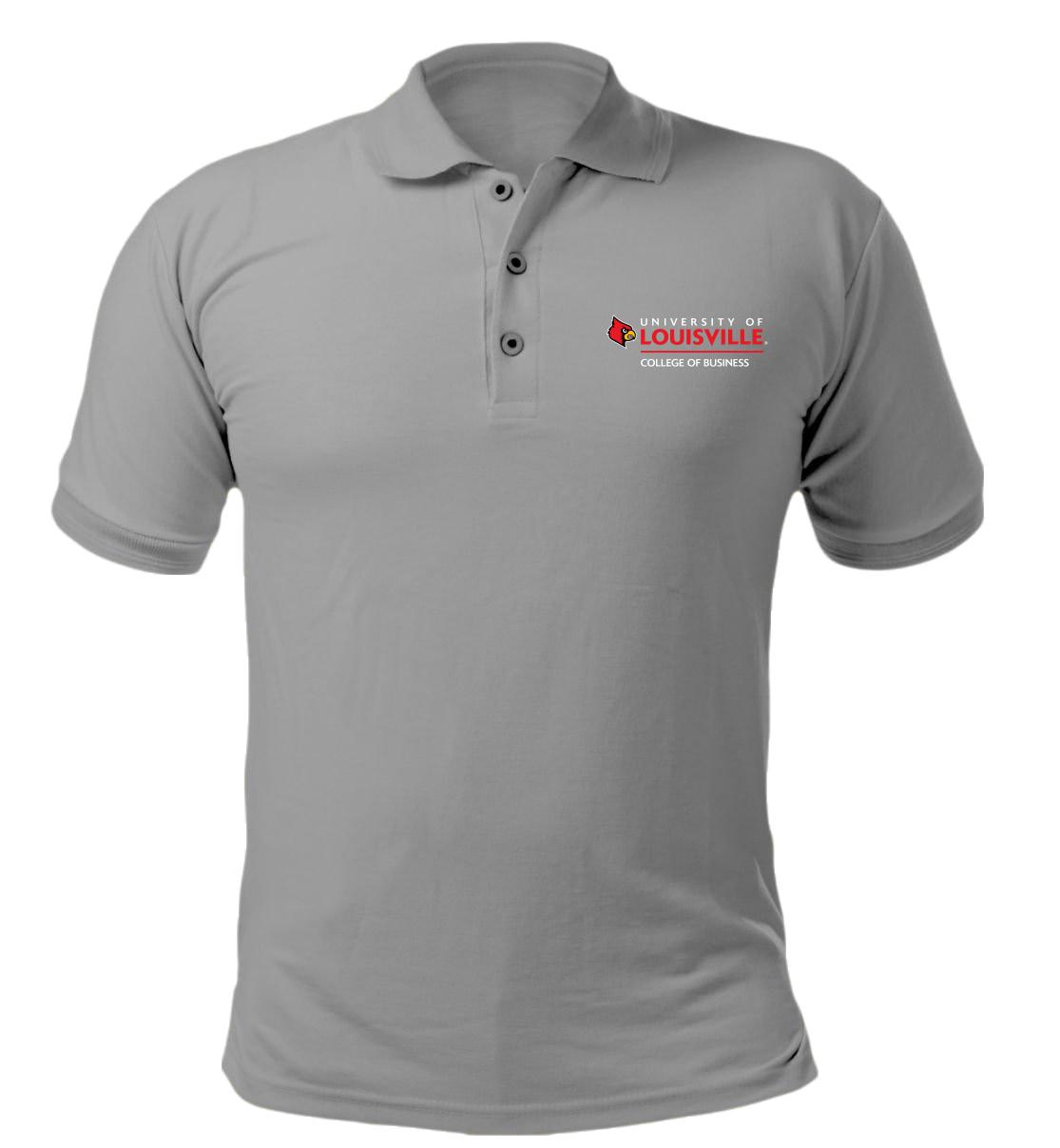
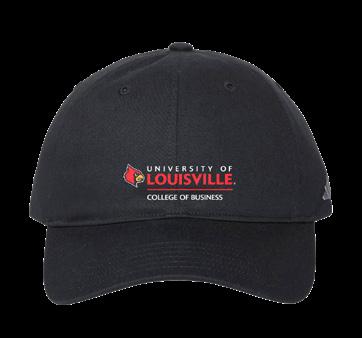
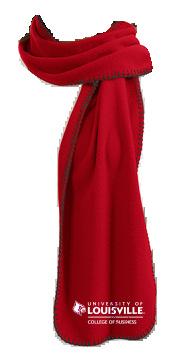
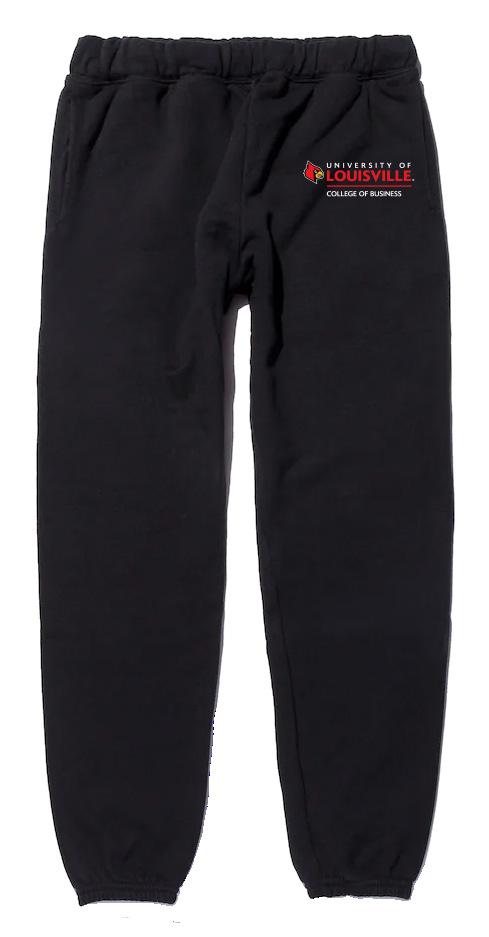
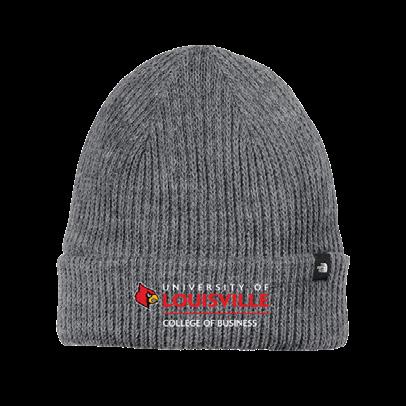
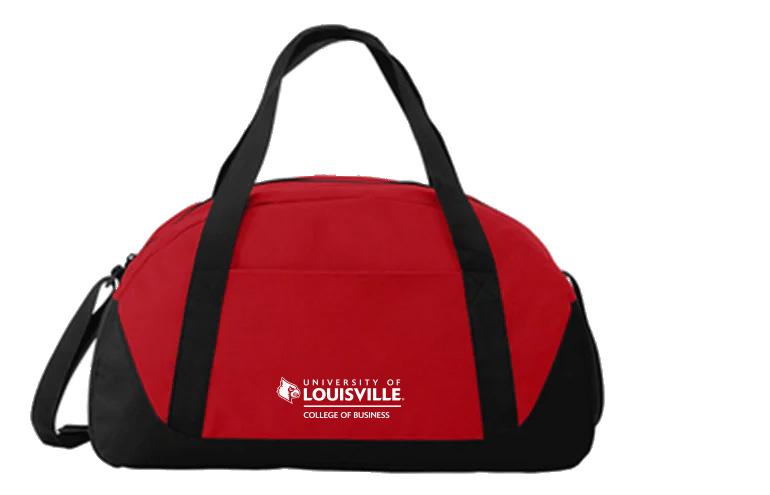
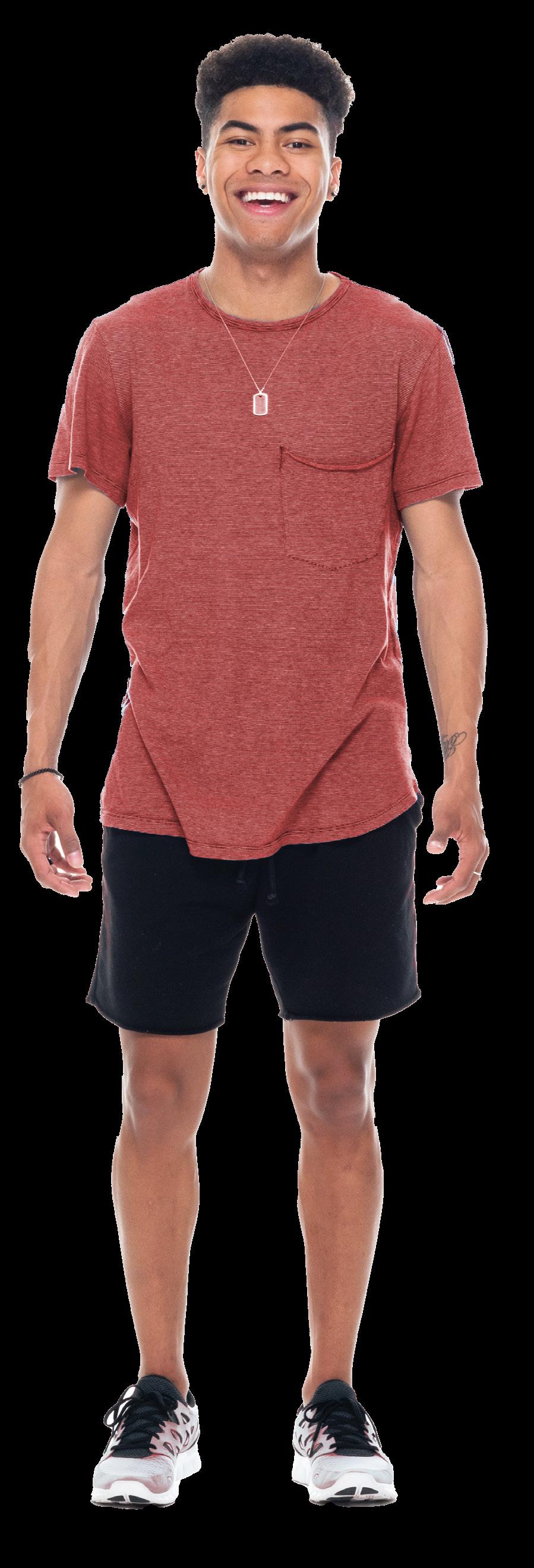
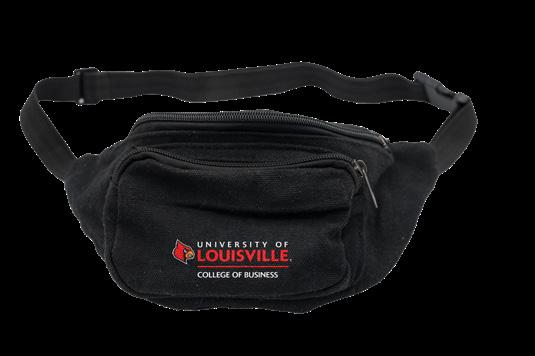
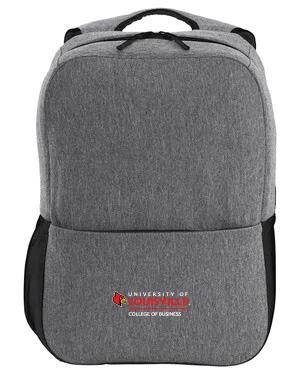
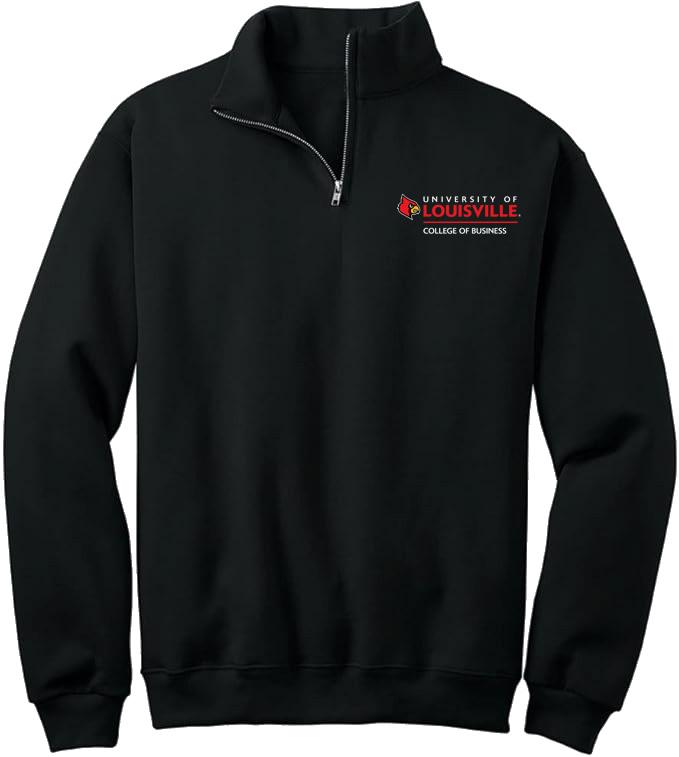
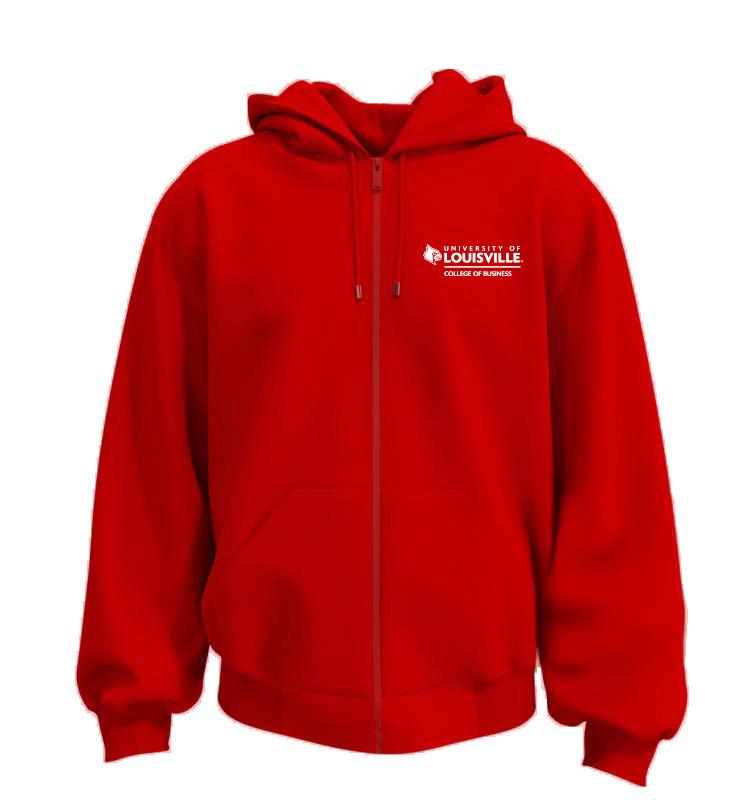
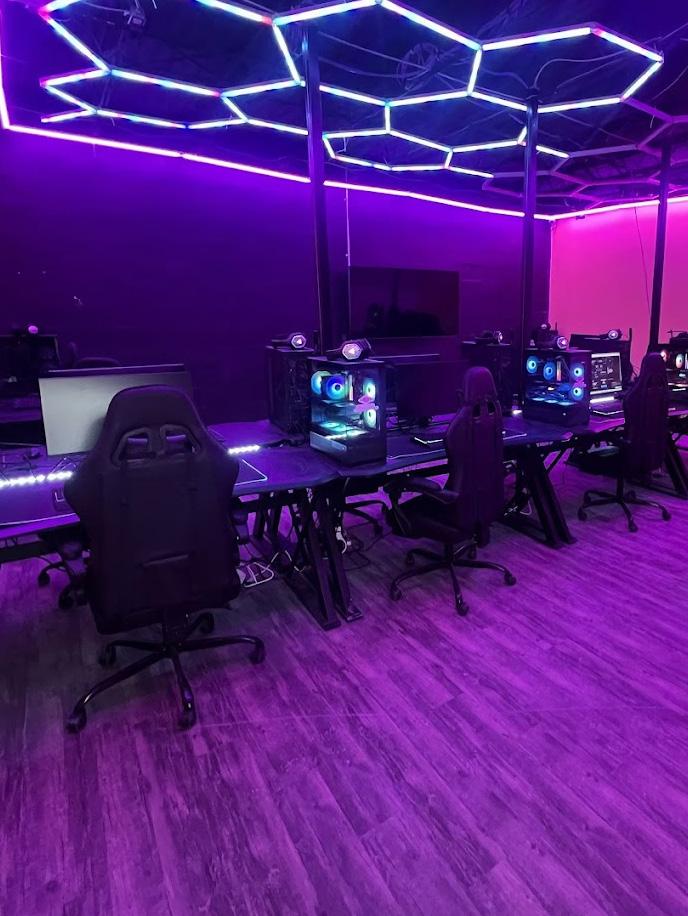
by Erica Hulse
For Nima Asgari, gaming as a young boy wasn’t just a pastime—it was a lifeline. From the arcades of Iran to after-school meetups in suburban America, he found connection through competitive play. Now, the University of Louisville College of Business alumnus is channeling that same sense of belonging into the Olympus Gaming Lounge–a space where esports meets community and everyone’s invited. Asgari shared with us how his UofL experience, entrepreneurial spirit and love for gaming are reshaping Louisville’s social scene—one controller at a time.
UofL: Please share with us more about your background and your life growing up.
NA: I was born in Tehran, Iran, and growing up, I had the unique opportunity to witness both ends of the spectrum—what it means to struggle and what it looks like to live lavishly. That contrast shaped me early on. At age nine, my family and I moved to the United States, where we lived a lower-middle-class lifestyle. Even then, I knew I wanted to experience life on the other side, not just financially, but in terms of freedom and opportunity. That desire has fueled everything I’ve done since.
UofL: How did your interests in biology and business first develop, and what made the University of Louisville the right place to pursue those academic goals?
NA: Like many Middle Eastern kids, my interest in biology wasn’t entirely my own—it was influenced by my parents. Culturally, becoming a doctor or a lawyer is often the expectation, and I didn’t yet have the courage to go against the grain. So I majored in biology, hoping to eventually pivot. At the same time, I picked up business management as a second major—something that actually excited me. I structured my schedule so that biology filled my Mondays, Wednesdays and Fridays, while Tuesdays and Thursdays were my “business days” which was something to look forward to and balance out my week. UofL offered me the perfect opportunity to explore both paths and ultimately find the one that truly aligned with who I am.
UofL: What sparked your desire to focus on franchising and real estate while studying business management?
NA: For franchising, the answer is simple: Dr. [Kathy] Gosser. Her passion and knowledge were contagious, and she opened my eyes to the

power of franchising in a way I hadn’t considered. Real estate, on the other hand, has always been in my blood. In Iran, it was my uncles, cousins and especially my dad. After moving to the US, I’d see older Iranian men—50s, 60s even 70s talking about real estate at gatherings. They got into it after long careers in other fields. I kept thinking, “Why wait?,” so I decided to start early and see where it could take me.
UofL: What was the most impactful moment you experienced as a student in the College of Business, and what effect has that event had on your career?
NA: I can’t point to just one moment. My entire experience was transformative. Each professor brought something unique, and the concepts I learned became tools I still use daily. I often say my education didn’t just give me knowledge–it sparked my curiosity. That curiosity led to action, and that action turned into success. The College of Business laid the foundation that helped me build everything I’ve done since.
UofL: What were some challenges you faced as a student, and how did you work to overcome those obstacles?
NA: Balancing it all was tough. I took on three semesters of 21 credit hours, and worked two jobs. One as a program coordinator for LSAMP and another as an academic coach at REACH. I remember hardly sleeping. I treated school as an investment, not an obligation. I knew it was temporary and that the payoff would come later. When things got hard, I reminded myself of the life I was working toward, and that future vision kept me going.
UofL: How did you develop an interest in becoming an entrepreneur, and how did that evolve into the launch of Asgari Enterprise?
NA: I’ve always had this want for more. Whether it’s for myself, for my family or for my community. In 2020, I launched Asgari Enterprise with the idea of flipping houses to pay my way through dental school. After that dream perished, I landed a high-paying job after college, but it felt
empty. Something was missing. One random February morning, I woke up and said, “I’m done settling.” By then, I had 2.5 years of real estate experience. I wasn’t particularly passionate about the transactional side, but I loved the research and financial analysis. That’s when it clicked. I should be consulting. So I pivoted Asgari into a real estate consulting firm. Fast forward a year, and I had advised on over $10 million worth of projects. Then I took a chance on an opportunity a past investor passed on. That opportunity became Olympus.
UofL: What have been some of the most surprising lessons entrepreneurship has taught you, about others or yourself?
NA: Your IQ is not the most important part of your life–it is your EQ. I highly believe that success isn’t about intelligence–it’s about emotional intelligence. The people who win aren’t the smartest, they’re the best at managing relationships. They know how to add value, build trust and bring others along for the ride. Also, I’ve learned that the brain can only handle so much— burnout is real, and balance is key.
UofL: What have been the most rewarding parts of being an entrepreneur, and what advice would you offer someone just getting started?
NA: Knowing everything I’ve built came from love, trust and action— the core
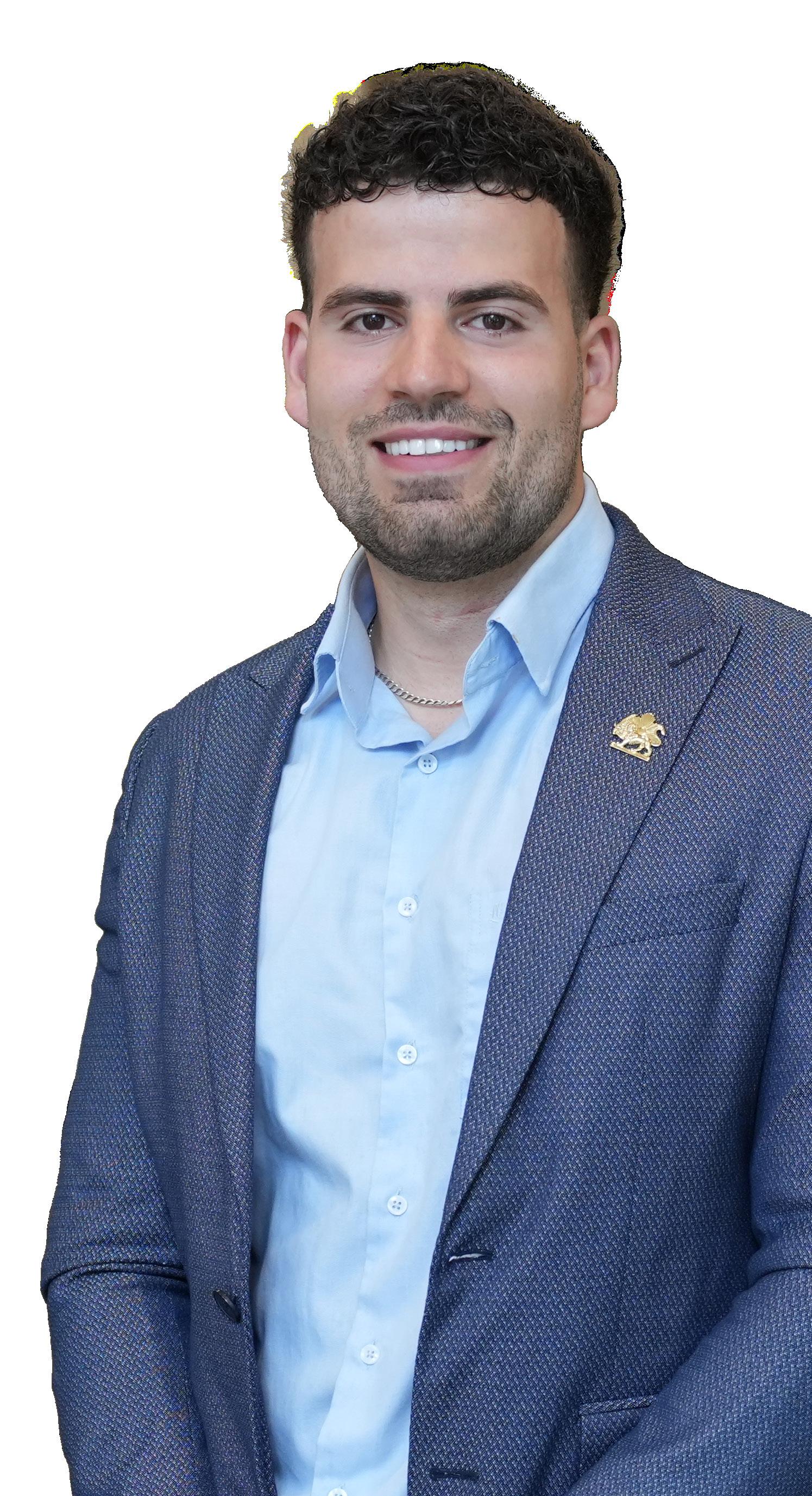
of my brand, LTD (Love, Trust, Do). Love what you do. Love people. Trust the process. Trust yourself. Then go do. Whether it’s answering one email or knocking out ten appointments and a dinner meeting, it all counts. The wins, the lulls and the chaos—it’s all part of the journey.
UofL: What led to the launch of Olympus Gaming Lounge, and what excites you most about today’s esports experience?
NA: The concept of Olympus was brought over from Iran. I had one growing up. It was great. We went there after school, played, ate and we all turned out okay. It was a good, safe environment that my friends and I enjoyed going to. When I was studying Dixie Market reports, I couldn’t believe there was nothing like it, so I had to do it. The most exciting part of the esports experience is seeing the opportunity it gives everyone. Anybody could pickup a controller and play–that is what I love most about it.
UofL: How do you envision Olympus shaping the social gaming experience in Louisville?
NA: I envision Olympus being the pioneering establishment for anything esports related–not just in Louisville, but in the region. That is why I built it the way I did. I want this to be the Slugger Field of esports–for the community, for Louisville and for Kentucky.
UofL: Why would you encourage prospective students to choose UofL for their business management, entrepreneurship or real estate education?
UofL: What is on the horizon for Asgari Enterprise and the Olympus Gaming Lounge?
NA: Asgari Enterprise is doing great things. We have helped with numerous projects that are already up and running and are working on more. While I can’t mention all of them, some include a brand new unique café, a science company, a media studio, a new concept restaurant and many more. Soon enough, Asgari Consulting will help Louisville become the destination to have new cool experiences like you get in Los Angeles and New York.
As Olympus grows, I plan on doing wonderful things with it when it comes to the community and the esport space. I envision Olympus as the hub for not only gaming, but a hub for technology to flourish–somewhere that has it all for the community that it is destined to serve. From day one, Olympus was built and has everything it needs to be a competitive regional player in the esport and tech world scene and it is just a matter of time when that comes to fruition.
UofL: Is there anything you’d like to leave our readers with about your journey?
UofL DOESN’T JUST TEACH YOU BUSINESS. IT SURROUNDS YOU WITH PEOPLE WHO CARE.
—Nima Asgari
NA: UofL doesn’t just teach you business. It surrounds you with people who care. The support system, the faculty and the resources are unmatched. Whether you’re exploring franchising, real estate or launching your own business, the College of Business gives you the knowledge and the space to grow into who you want to be.
NA: My journey has had sacrifices and lows that I don’t wish on my worst enemy. Obviously, when you talk about your journey, those aren’t often shared because they are just part of the process of doing something big. The cliché stuff is cliché because it has truth behind it–so remember that next time you are faced with a hardship. You have a 100% chance of getting through it because you have done it until now, so keep pushing, and try to find that golden balance.
Are you ready to level up your career? Our real estate minor equips you with the foundation you need to turn bold ideas into a community legacy. Begin your academic quest at business.louisville.edu/academics-programs/undergraduateprograms/business-minors/#real-estate
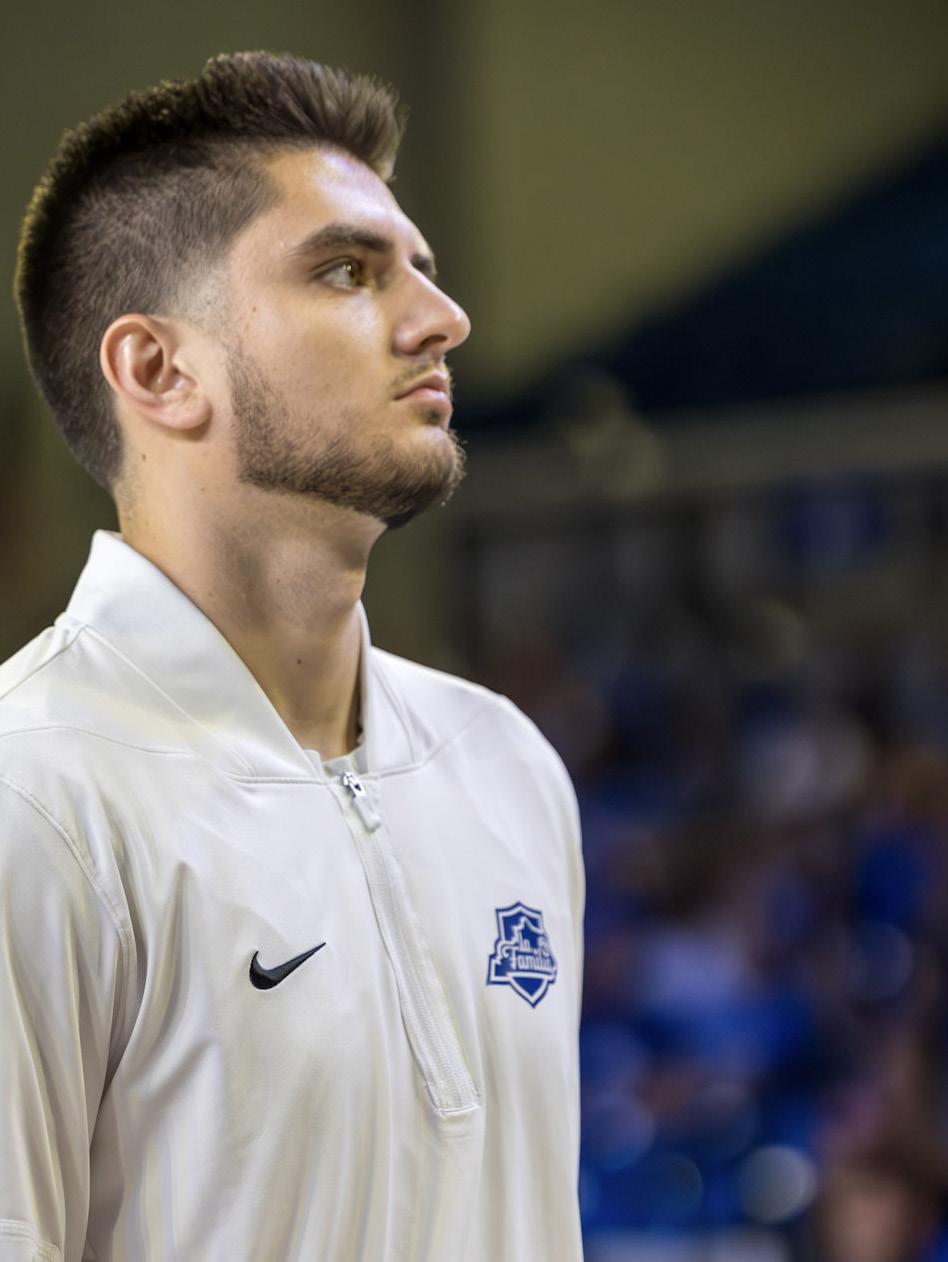
by Erica Hulse
For University of Louisville Online MBA alumnus Ethan Coury, basketball was never just a sport—it was a family affair. From Amateur Athletic Union courts across the country to packed UofL and University of Kentucky stadiums, every game he watched or participated in was a lesson in teamwork, drive and connection. Today, the graduate turned EZ Sports Group agent and Director of Operations for UK’s La Familia, part of The Basketball Tournament, has learned that his truest talent isn’t in making shots—it’s in making sure others get theirs, whether that’s a college athlete navigating professional opportunities or Kentucky legends chasing tournament glory. Coury recently shared with us how his UofL business education shaped his approach to athlete representation, the strategic thinking behind managing tournament operations and why investing in others’ success has become his pathway to professional growth.
UofL: Please share with us more about your background and your life growing up.
EC: I was born and raised in Louisville, and basketball has been a part of my life for as long as I can remember. My family has always been a big part of that passion, whether it was taking me to games, encouraging me to play or supporting my goals on and off the court. I spent a lot of my childhood attending Louisville and Kentucky basketball and football games with family and friends. Growing up in a city and state with such a strong basketball culture shaped not only my love for the game, but also my appreciation for how sports can bring people together and create a lasting impact.
UofL: What led you to pursue both your Bachelor of Business Administration and MBA at the University of Louisville?
EC: I originally chose to attend UofL for its sports administration (SPAD) program, which is widely regarded as one of the top programs in the country. Early in my college career, I decided to shift my focus and changed my major to business administration, while still earning a minor in sport administration. That combination allowed me to strengthen my business and leadership skills, while also keeping a strong connection to the sports industry. After completing my bachelor’s degree, pursuing my MBA at UofL felt like a natural next step. It gave me the necessary tools, network and perspective needed to succeed and advance in the fast-paced world of sports management. The Online MBA program at UofL was also great for my work schedule, allowing me to balance work and school, along with everyday life.
UofL: How have your UofL business degrees prepared you to lead and manage sports branding and talent in this demanding, fast-paced industry?
EC: My UofL business degrees gave me the skills to make smart decisions, work with others and understand how the sports business really works. I personally think that besides the degrees and the education itself, the biggest value came from the experiences outside the classroom and through the network I built. Seeing how business works
in the real world, connecting with mentors and understanding how athletes’ careers are managed behind the scenes are all things that you couldn’t put a price on in my position. Keeping that perspective has been crucial in helping me advise athletes, build their brands and navigate the fastmoving world of sports.
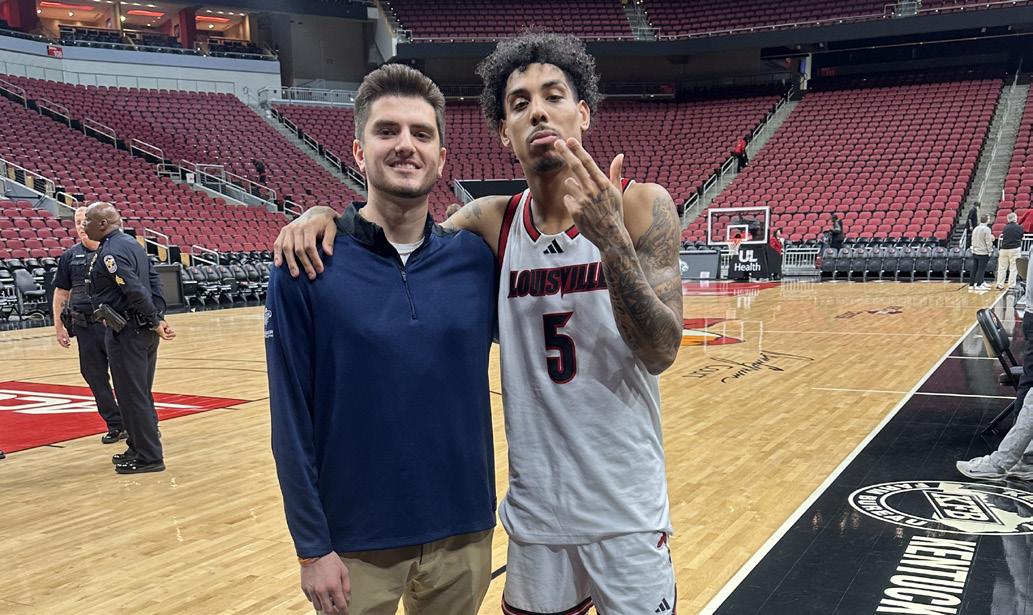
UofL: What has been the most rewarding part of working with a team like La Familia TBT?
EC: The most rewarding part has been contributing to a professional team environment where everyone is fully locked in on the same goal. Whether it’s managing logistics, assisting with preparation or coaching on the bench, playing a vital role both off and on the court has been a one-of-a-kind experience. Helping the players relive that camaraderie while competing for a championship, the prize of $1 million, and being trusted to help manage that environment is incredibly rewarding.
UofL: What lessons from this year’s tournament experience have shaped how you approach leadership and team management?
EC: This years’ tournament experience came with a ton of lessons to carry forward, but the biggest one for me is the importance of preparation. In a tournament like TBT, where the stakes are high and every game could be your last, being fully prepared in every area from logistics, scouting, communication and execution can really make all the difference in the outcome.
I also learned how important it is to stay adaptable, because no matter how much you plan, unexpected challenges will always come up in life. How you respond in those moments sets the tone for the team.
UofL: You’ve had the opportunity to work alongside some seasoned professionals—what’s the best piece of leadership advice you’ve received?
EC: The best piece of leadership advice that I’ve received is that nobody’s path in life is the same. It’s really easy to get caught up in what other people are doing with their lives, especially with how much social media influences us today. However, the biggest thing is staying locked in on your own journey and growth. If you stay true to yourself and loyal to your goals and your craft, the results will come, often when you least expect them. Leadership isn’t just about managing others, it’s also about how you carry yourself and set an example for those around you.
UofL: What’s your long-term vision for your career in basketball operations and agency work?
EC: I want to have a lasting, positive impact on everyone I come across and work with. Continuing to represent athletes at the highest levels both in college basketball and in the NBA is a big goal of mine. I eventually plan to represent more coaches in the future as well. Over the years, I’ve built strong relationships with college and professional coaches across the country and around the world, and I want to help my colleagues and clients find the best opportunities for success.
Ultimately, I aim to serve as more than just an agent for the athletes I work with, guiding them through their entire careers, from grassroots to college, into their professional journeys and through retirement. A big part of that is building and maintaining a reputation for putting athletes in the right situations where they can thrive both on and off the court. Prioritizing strong personal relationships, career longevity and holistic support are values I plan to continue carrying with me throughout my career. I hope to have a long-term, positive impact on my community in Louisville and across Kentucky by doing good for others.
UofL: Looking back on everything you’ve achieved so far, what is the most important lesson or insight you hope readers take away from your journey?
EC: Never underestimate the power of relationships in this world. At the end of the day, success in this business, and in life in general, comes down to trust, consistency and showing up for other people. Never let anyone steer you away from your goals. If you can do those things consistently and with integrity, the opportunities will take care of themselves. There will always be challenges and setbacks, but staying committed to your goals, learning from every experience and continuing to push forward is what ultimately leads to success.
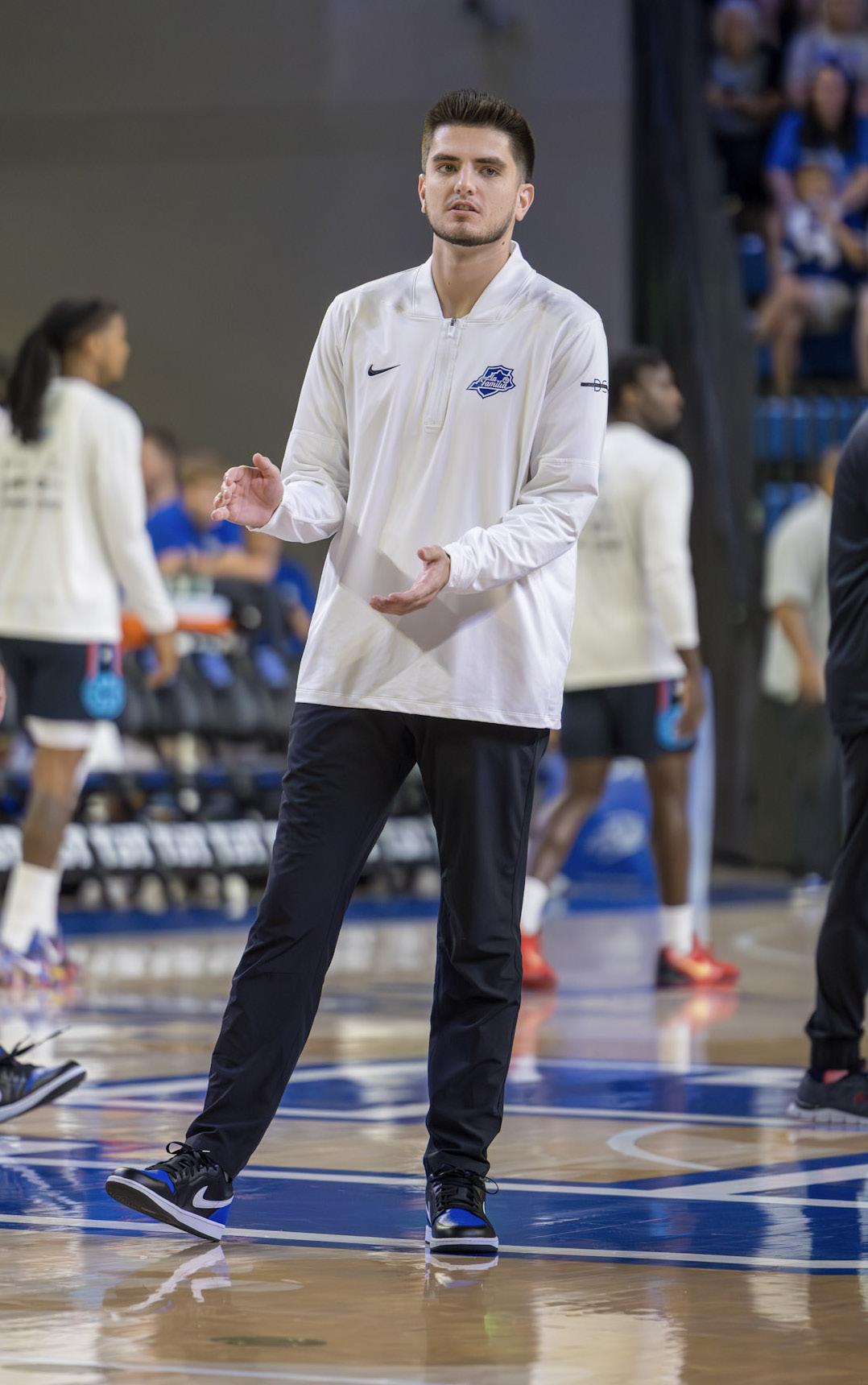
THOMAS ALLEN
by Erica Hulse
In this feature, the former Louisville Business First 40 Under 40 honoree reflects on how an unread book led him to his calling, how his education at the College of Business gave him an edge in his field and how ten years in the insurance industry has deepened his commitment to community.
UofL: Please share with us more about your background and what your life was like growing up.
TA: I’m a born-and-raised Louisville native, mostly from Old Louisville, though I moved around a lot growing up. At the time, I hated it—but looking back, it gave me valuable perspective. Constantly adapting taught me how to make friends quickly, appreciate different viewpoints and truly empathize with people from all walks of life. It wasn’t without challenges, but I wouldn’t trade that foundation for anything.
UofL: What made you choose UofL to earn your undergraduate degree in business administration?
TA: For me, Louisville was never just a choice, it was always the list. Growing up here, I saw the underdog mentality that so many natives share: A drive to prove ourselves, both within and beyond the state. As a Louisville sports fan, I felt that same spirit of always
Some entrepreneurs build businesses; others build legacies. For Thomas Allen, it’s both.
A Louisville native shaped by change and rooted in resilience, he found his footing at UofL before stepping into an industry he never expected—insurance. A decade later his Allstate agency, Thomas Allen Insurance Agency, stands as proof that strong foundations, paired with vision and adaptability, can transform challenges into triumphs.
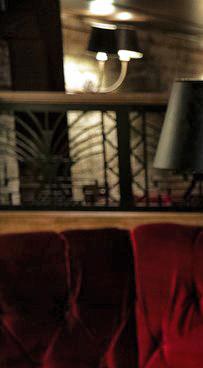
fighting from behind. To me, the city and UofL were one and the same—an opportunity to excel and to prove those who doubt us wrong.
UofL: What moment at the college most shaped your personal or professional growth-and why?
TA: I can’t point to a single moment that shaped me. College is a journey, where every part played a role and the sum of the parts led me to my path today. Looking back, it was the combination of those experiences that mattered. Every interaction, every deadline and every time I had to think critically or solve a problem, I was being taught a lesson. Those same lessons shape how I approach challenges today.
UofL: How did your business degree help prepare you to launch your agency?
TA: I’ve learned that much of the wisdom you develop in business takes a long time to acquire. In my industry, many business owners have no formal business background. My degree gave me a foundation that most don’t have. Foundational elements like organizational leadership and interpersonal communication continue to guide
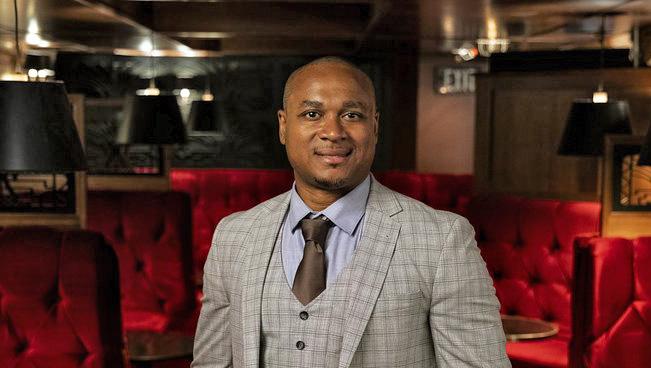
how I run my agency, develop my team and build lasting relationships with clients.
UofL: How did you first develop an interest in the insurance industry, and what inspired you to launch your agency in 2015?
TA: Honestly, insurance was never on my radar. I graduated from Louisville in 2011, when the job market was still reeling from the financial crisis. Stable opportunities were scarce, but I kept seeing insurance jobs posted. Around that time, I remembered an insurance book I had bought years earlier but never opened. That was my turning point. I left my assembly line job, spent two weeks studying in Ekstrom Library, and passed the licensing exams. What started as a choice out of necessity has since shaped my career, my family’s future and the lives of the people who have worked with us along the way.
UofL: You’ve reached a major milestone—10 years in business! What have been the biggest challenges and triumphs your agency has experienced over this past decade?
TA: The first hurdle that always seems like the
biggest one, is just fighting to stay in business during your first year or two. In my business, your phone has to ring. If your phone doesn’t ring, you won’t be in business for long. Once you get past that and your business starts to elevate, you then have the problem of growth. That is, you have to deal with the many issues that arise out of a business in rapid growth mode. In many cases you need to react and execute plans quickly to take advantage of favorable market conditions. Problems related to growth, though challenging, are always the better of the two hurdles.
UofL: What sets your agency apart in the insurance market today, especially in a competitive city like Louisville?
TA: Our advisor model sets us apart. We provide a personal approach with every client. Insurance can feel complicated, and people don’t want to just be sold a policy. People want someone who will guide them, explain their options and make sure they feel confident in their decisions. Our team is built around that philosophy. We do insurance reviews, spend time educating clients and make sure their coverage matches their needs. We believe an educated client is an informed client. That focus has served us well.
UofL: You’ve built a strong reputation for being deeply rooted in the community. What does that connection mean to you, personally and professionally?
TA: The relationships that I have built here mean the world to me. Professionally, I’ve had some of the most thought-provoking conversations in my life with other members of the business community. Many of those same professional relationships have grown into personal relationships as well. My network of friends and family is vast and more than I could have ever imagined. This city and its many communities have been kind to me and I cherish that deeply.
UofL: Can you share a story that captures the kind of long-term relationships you’ve built with your clients?
TA: One of my clients first found us by accident. Her son clicked an ad on her phone, and she ended up calling our office by mistake. Nearly a decade later, I’ve had the privilege of walking alongside her family through so many milestones: Her son learning to drive, college graduations, an adoption and now she and her husband preparing for early retirement. Insurance was the reason we connected, but the real reward has been witnessing their life’s journey and playing a small part in it.
UofL: What about your upcoming 10-year celebration are you most looking forward to and why, and what can attendees expect from the event?
TA: More than anything, I am just looking forward to the celebration of this milestone with my team, clients and community partners. Attendees can expect fun activities, food, a ribbon cutting and some light entertainment.
UofL: What’s your long-term vision for your insurance agency, and are there any other business projects or goals you are pursuing?
TA: My long-term vision for the agency is to continue building a business that lasts—one that provides security for our clients and growth opportunities for our team well beyond me. I want
the agency to be known not just for selling policies, but for being a trusted partner that families and businesses rely on for generations. I also want to continue to mentor agents and emerging leaders. As far any future projects, nothing to announce now, but stay tuned!
UofL: What advice would you offer to current students who are considering starting their own business someday?
TA: My advice is to have a callous mind. Entrepreneurship will test your limits, and no one will truly understand it except for other entrepreneurs. Mentality is what dooms most entrepreneurs. Make sure you are prepared for the worst and when you see success, be pleasantly surprised.
UofL: Where can people follow the agency online or on social media, and how can they contact you to learn more about your upcoming celebration?
TA: We can be found on every platform by searching for Thomas Allen Insurance Agency. They can reach out to our Brand Manager Rensha Allen at 502-548-0700.
UofL: Looking back on everything you’ve achieved so far, what is the most important lesson or insight you hope readers take away from your journey?
TA: The truth is in the middle–this is something that I have learned. In entrepreneurship, you should never get too high or too low. Getting too high opens you up to comfort, which slows growth and leads to apathy. Being too low is a vicious cycle where if everything seems bad, everything is bad. Stay even. Being in the middle means you are prepared for both attacks and you can respond with clarity, make steady decisions and keep moving forward no matter what comes your way.
Your next chapter could be about more than profit—it could be about people. Whether it’s starting an agency that protects families or shaping solutions for your community, our entrepreneurship programs can help your dreams take root. Learn more at business.louisville.edu/academics-programs/ entrepreneurship-programs/
Discover a transformative collaboration opportunity with UofL’s College of Business Corporate Partner Program. By joining, companies gain priority recruitment strategies, direct influence on future educational skill sets and engagement opportunities with our Cardinal Community. Enjoy executive education discounts, prominent visibility and roundtable participation to shape today’s students and tomorrow’s leaders. It is completely free for companies to join.
To become a Corporate Partner, your company will need to commit annually, provide logo permissions, host our representatives once a year and nominate a director-level representative for biannual roundtable meetings. Elevate UofL College of Business at
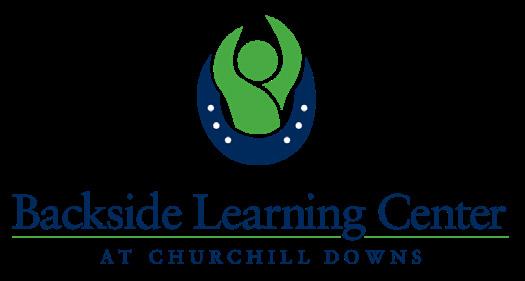



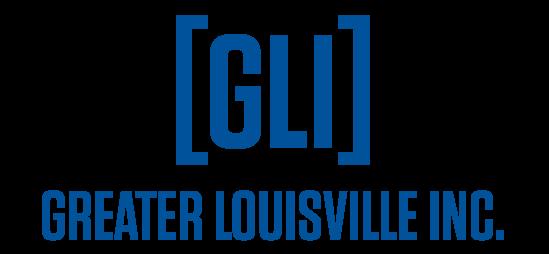


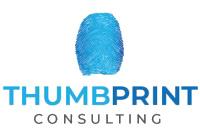
your company as a top choice for hiring interns, employees and executive education.
The College of Business Graduate MS Business Analytics and MS Accounting Analytics programs welcomed approximately 30 new students who will be searching for internships. Graduate interns may work new-to-them part- or full-time roles as long as they can apply what they are learning in the program to the role and will receive coaching and guidance from their direct managers. Internships must be vetted by the graduate internship advisors, and employers must complete a performance evaluation on the intern once a semester.





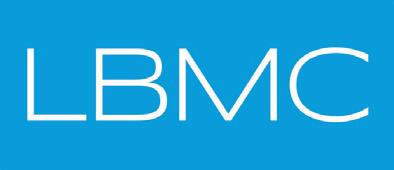




DANIAL MALIK
by Erica Hulse
“The more I learn, the more I will grow professionally [and] the more I’ll be able to contribute to making a meaningful change in this world. That’s the mission. That’s the purpose,” shared lifelong learner Danial Malik, the 2025 recipient of the University of Louisville’s prestigious Outstanding Community Engagement award.
As Clinical and Translational Research Technician for the School of Medicine, Research Mentor for Health Equity Research at UofL’s Health Sciences Campus Compassion Clinic and Master of Science in Business Analytics alumnus, earning this year’s award reinforced Malik’s belief that his mindset, work and goals are well-aligned, and further inspired him to serve the greater Louisville community through the research methods, machine learning and predictive analytics skills gained from his MSBA program. “I think this award doubled down that [I’m] headed in the right direction [and to] keep going.”
Influenced by multiple family members who were driven to help others through public health, as a young boy Malik witnessed the importance of overcoming adversity to help others. “I am a first-generation immigrant from Pakistan,” he shared. “I came [to the United States] at the age of seven. [My family] transplanted ourselves in Birmingham, Alabama.” Eventually relocating to Louisville due to his father’s work with UofL, Malik followed suit, earning his undergraduate degree in biology from the university with plans to become a physician. “My dream, my vision was always to go into medical school, but what that looked [like] for me was maybe very non-traditional–something that I had to carve out myself since
there was no blueprint. My dad was a PhD. My sister finished her master’s in public health. But I said, ‘No, medical school is for me. I’m going to do it.’” However, Malik encountered challenges along that path which benefitted him in ways he had not imagined. “I took a five-year hiatus from my studies, [and] I focused on research, embarking on the School of Public Health Master of Public Health in Epidemiology. During that time, I learned how knowledge is power [and] how we tap into it to break barriers, make systemic changes and define generational success and intergenerational mobility–it was a pivotal moment in my life.”
As a public health liaison for the School of Public Health & Information Sciences, Malik witnessed first-hand the impact that Compassion Clinic Director Karen Krigger had on furthering support of public health initiatives through the Clinic and wanted to join her in supporting the cause. “When I saw the scope of work [she] is doing…providing all kinds of clinics, all kinds of screenings for those that are the most under medically served–that was inspiring, because she did it year after year at no cost to them,” he shared. “You have the mammogram bus [and] colorectal surgeons screening for colon cancer. You have eye exams, cardiac exams–you name it, it’s there. Mental health is there. Arts and therapy…for the kids [and there are] healthy groceries we’re passing out. This serves the bigger purpose.”
Once Malik joined the Clinic, he began something new–collecting equitable data about a group of people with a mistrust of the scientific community. At that time, Malik noted that, “We [hadn’t] collected any data on [those] patients. We [didn’t] know what community we [were] serving.” With a determination to aid Krigger and the Clinic, he set out to


gather information on the population. “We created quality of life, needs and interests [and] some mental health surveys,” he explained. “We just wanted to understand…their biggest needs and interests, [and] also their greatest threats from living a sustainable lifestyle.”
Today, Malik has built a research team for the Clinic comprised of medical students, and he teaches them how to gather, interpret and share data while providing aid to a community in need. “They go in the field, collect this data, interact with the community [and] educate them on what they’re doing and how,” he said. “They envision this is going to change systemic barriers in their community if we present data to the policymakers. I think nothing talks louder than data. How you visualize it and who you present it to could make all the difference.” Even more important than teaching the students on his team how to use data to facilitate social justice, Malik hopes that when they “go on to be future medical doctors, [and] generational physicians and healers…they’ll be able to look at their patient population from another lens–the cultural relativism lens.”
Recognizing the need to further develop his data collection and analysis skills, in 2024,
Malik decided to pursue his MSBA. “I’m thankful because a lot of it was very advanced–I’m talking machine learning [and] predictive analytics,” he explained. “On the health sciences side, people are just now starting to realize that we need to shift towards this research, because the old model of just using lab rats is just not sufficient anymore.” With the goal of developing a predictive analytical model based on machine learning, Malik is working with the organoid project, an assessment model that could revolutionize patient care by using machine learning to predict patient responses to various types of medical treatment. “The reason why it’s so novel is because for the last 50 [or] 60 years, we’ve used animal models–rats, mice, flies, et cetera. This is a model where cells come from that individual patient,” he explained. “Then, based on what kind of treatments you give it, you can figure out whether the patient is resistant or sensitive to certain treatments before giving it to them.”
With each next step in Malik’s journey, he hopes to continue to find ways to provide support to his students and the greater patient community and serve as an example of what anyone can accomplish. “I want to demonstrate how knowledge, compassion and persistence can be passed on from generation to generation, baton to baton to break barriers.”
If you’re passionate about creating meaningful change in healthcare and beyond, our MSBA program can equip you with the analytical skills to lead the way. Harness the power of machine learning, predictive analytics and compassionate innovation. Transform communities—and your career—at business.louisville.edu/academics-programs/graduateprograms/msba/.

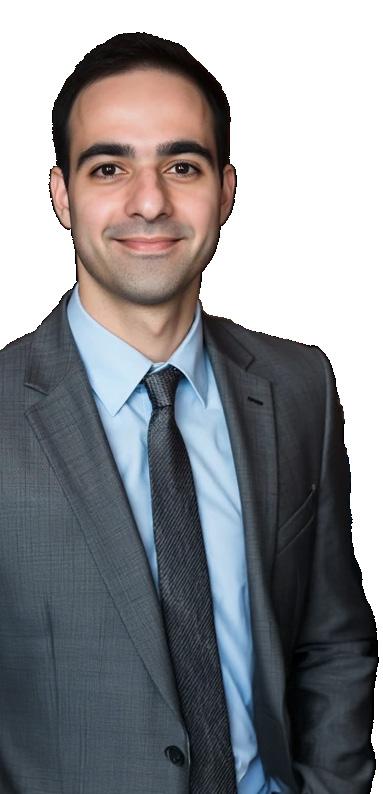
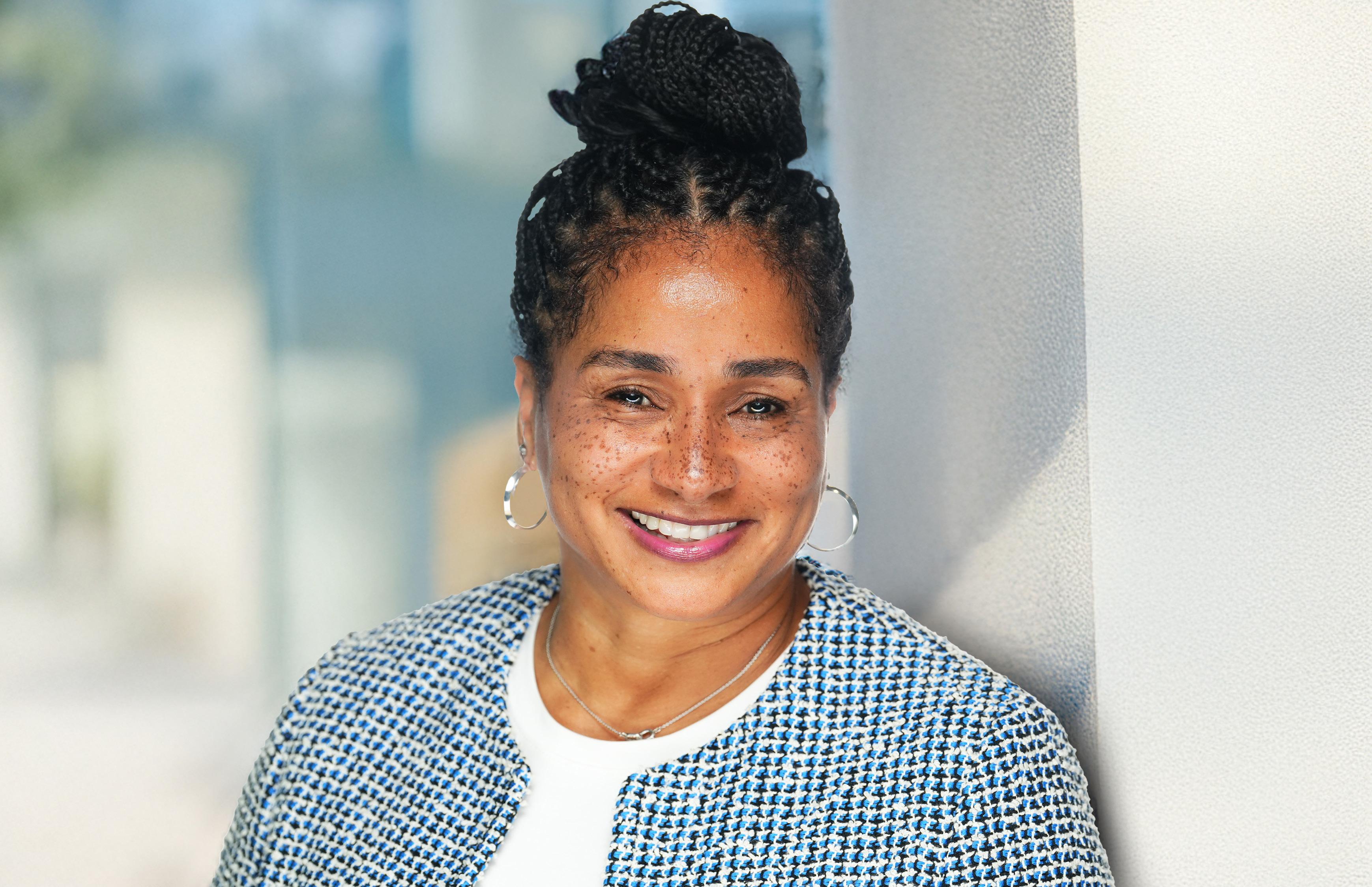
by Erica Hulse
New Directions Chief Executive Officer and University of Louisville Master of Business Administration alumnae Bridgette Johnson’s path to leadership didn’t begin in a boardroom—it began in the heart of Louisville’s West End. Driven by resilience, compassion and an unwavering commitment toward building a better life for her daughters, Johnson channels that same determination into transforming communities in her executive leadership role.
New Directions is a nonprofit organization dedicated to creating affordable housing and building stronger communities across Louisville and Southern Indiana.
Since 1971, the organization has developed and managed rental properties, provided critical home repairs for seniors and people with disabilities and led neighborhood revitalization efforts. At its heart, New Directions is about more than housing—it’s about hope, stability and giving families the foundation to rise, thrive and build a brighter future.
In this interview, Johnson discusses how earning her MBA, and her time in the College of Business prepared her to lead with clarity and compassion, advancing her vision for affordable housing, nonprofit innovation and community transformation.
UofL: Share with us more about your background and what life was like growing up.
BJ: I was born in the California neighborhood [of Louisville] as the youngest of five siblings. We eventually moved to Newburg in central Jefferson County. My childhood was shaped by resilience, tenacity, family and community. The Newburg Boys and Girls Club became my safe haven, and that sense of belonging fueled my desire to dream and imagine a future beyond what I could see. I even had the honor of being crowned Miss Newburg and Miss Black Expo—fun memories that still make me smile.
I became a mother at 18, and again at 32, which gave me responsibilities early on but also fueled my determination to create opportunities for myself and my family. Being a positive role model for my daughters, Alesha and Alana, was always my ultimate goal. Motherhood instilled in me a strong work ethic, deep compassion and the ability to connect with people from all walks of life.
and community needs. Along the way, I pursued my MBA, which equipped me with the tools for strategic decision making. This blend of lived experience, professional growth and education naturally positioned me for the role of CEO.
UofL:: What thoughts or feelings did you experience when you stepped into the role of CEO for New Directions?
BJ:: It was both humbling and exciting! My daughters were so proud, and that meant the world to me. I felt a deep responsibility to honor the legacy of New Directions while also guiding it into a new era. Being entrusted with this role was not only a professional achievement but also a personal milestone. My first thought was gratitude—gratitude for the team that has walked alongside me, for the residents we serve and for the opportunity to help shape the future of housing in our community.
UofL: How did your MBA experience prepare you for leadership in the nonprofit sector?
UofL: What paths or experiences led you to your role as CEO of New Directions?
BJ: I began my journey with New Directions in 2004 as an administrative assistant. From the start, I saw myself in the clients we served—their journey mirrored my own. At that moment, I knew I wanted to grow into leadership at New Directions. My goal was to help provide affordable housing for families and individuals while supporting them on their journeys.
Over the past two decades, I’ve worked my way through nearly every aspect of the organization—from property management to executive leadership. Each step gave me a deeper understanding of housing, compliance
BJ:
The University of Louisville gave me the foundation to lead with both head and heart. My MBA sharpened my skills in finance, strategic planning and organizational management— all critical tools for leading a complex nonprofit. In addition, having my MBA prepared me to attend the Achieving Excellence Program at Harvard University. That experience broadened my leadership perspective, strengthened my ability to drive organizational change and connected me with national peers working to solve similar challenges. Together, these experiences reinforced that strong leadership is about balancing people and performance.
UofL: What advice would you give current students—especially those hoping to work in nonprofit leadership or social impact spaces?
BJ:: Stay curious. Stay humble. And don’t shy away from hard work. Your path may not be linear, but
every experience builds skills you’ll use later. Build relationships, listen deeply to those you serve and embrace innovation. Most of all, remember that nonprofit leadership is about impact, not titles— you lead best when you’re serving others.
UofL: What does being the first Black woman to lead New Directions mean to you
BJ: It’s an incredible honor. I did not reach this role on my own—I am deeply grateful for my predecessors, mentors, coaches, therapist, colleagues, family and friends. It affirms the sacrifices my ancestors made so women like me could step into leadership. Personally, I see it as my responsibility to be a good steward of my resources.
Professionally, it’s a reminder that representation matters and that hard work leads to results. When residents and staff see me in this role, it broadens their vision of what’s possible. My hope is that my leadership opens doors for those who will follow.
BJ: One of the biggest challenges has been balancing limited resources with growing community needs. Rising costs, federal funding uncertainties and aging housing stock all require tough decisions. I’ve leaned on collaboration— building strong partnerships, advocating for policy solutions and developing creative financing strategies. I’ve also worked closely with staff to streamline operations and ensure we maximize every dollar.
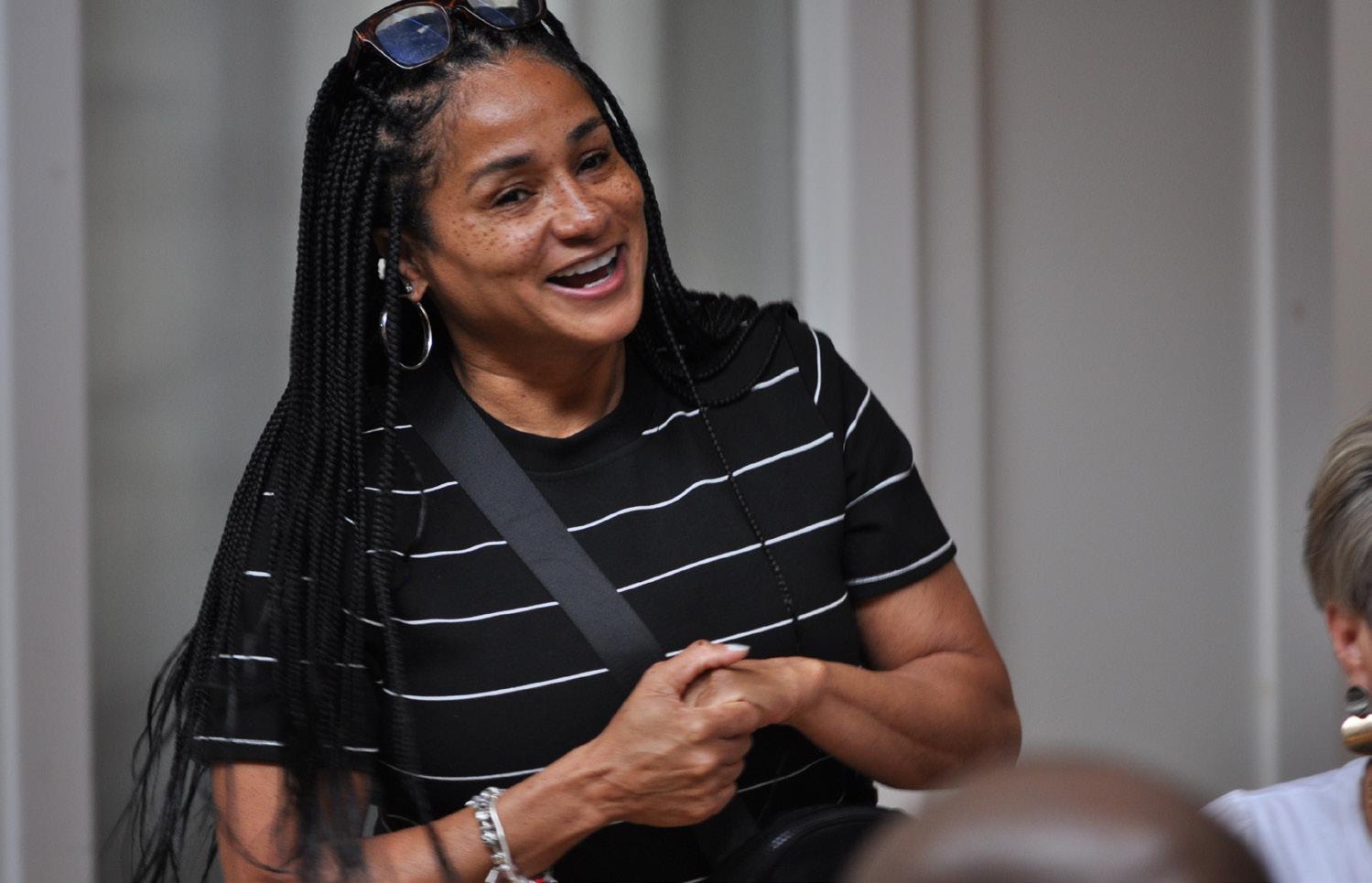
Bridgette Johnson
UofL: What excites you most about the work New Directions is doing right now?
UofL: What have you achieved as New Directions CEO that makes you most proud, and why?
BJ: I’m proud of leading initiatives that preserve affordable housing for families and seniors while also strengthening resident services. Programs like I Rise—our family self-sufficiency program— are helping families build savings and long-term stability. I’m also proud that New Directions has received both local and national recognition for our property management, maintenance, resident services and asset management teams. These achievements show that we’re not only maintaining affordable housing but also improving the quality of life for those who call our communities home.
UofL: What are the most significant challenges you have encountered in this role, and how have you overcome them?
BJ: I’m excited about our redevelopment projects, including Roosevelt Senior Apartments. For aging homeowners, we’re completing critical home repairs with support from partners like Louisville Metro, allowing seniors to safely age in place. Together, we’re transforming our community.
I’m also energized by the growth of I Rise, which demonstrates how housing can serve as a platform for financial empowerment. These efforts reflect our mission—not just to provide housing, but to help residents on their path toward self-sufficiency.
UofL: What are our region’s greatest challenges or opportunities regarding housing access and sustainability?
BJ: Louisville—and the nation—faces a shortage of safe, affordable housing. Rising rents, stagnant
wages and limited supply make it difficult for families to thrive. The opportunity lies in collaboration. By bringing together public, private and nonprofit partners, we can scale solutions that expand housing access, preserve affordability and ensure sustainability for future generations.
opportunities. Their stories keep me grounded and focused on solutions that are practical, not just theoretical. This feedback has shaped me into a leader who listens first, leads with empathy and ensures decisions reflect the voices of those most impacted.
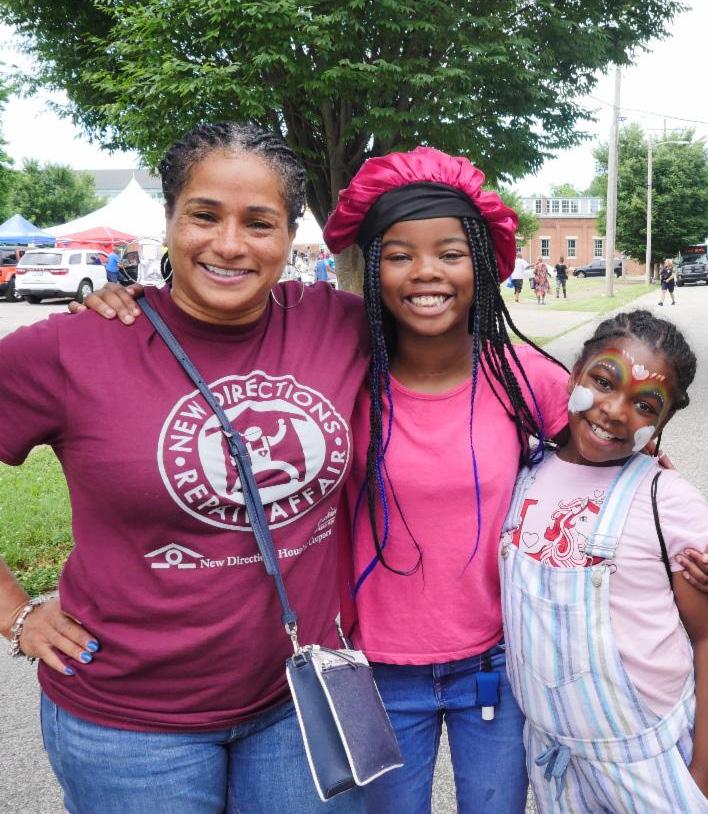
UofL: What role does housing play in the health and future of a community?
BJ: Housing is the foundation of everything. Without safe, stable and affordable housing, it’s nearly impossible for families to focus on health, education or employment. Communities thrive when residents feel secure in their homes. Housing impacts mental health, economic mobility and even life expectancy. That’s why I believe housing is not just shelter—it’s healthcare, it’s education and it’s opportunity.
UofL: What have you learned from the communities you serve, and how does that feedback shape the leader you strive to be?
BJ: I’ve learned the incredible power of resilience. Our residents remind me daily that people can thrive when given the right support and
UofL: What’s your vision for the evolution and growth of New Directions over the next few years?
BJ: My vision is for New Directions to strengthen its role as a leading voice for affordable housing in the region. That means preserving and redeveloping more properties, expanding resident services and deepening partnerships. I want New Directions to be known not only as a housing provider but also as a catalyst for community transformation— where families move from simply surviving to truly thriving.
UofL: For readers wanting to get involved or support the mission of New Directions, where should they begin?
BJ: There are many ways to get involved: Volunteer your time, donate to support or partner with us on housing initiatives. Even spreading the word about the importance of affordable housing makes a difference. Start by visiting our website, https://www.ndhc.org/, attending one of our events or simply reaching out— we welcome every level of engagement.
UofL: Are there any other insights you would like to leave with our readers?
BJ: I believe leadership is about service. Every day I ask myself: Am I creating space for others to succeed? Am I building something that will outlast me? My journey from an 18-year-old mother to CEO is proof that with support, resilience and opportunity, transformation is possible—for individuals, families and entire communities.
With the right tools—like an MBA—you don’t just build a career, you design a blueprint for lasting community change. Discover which MBA fits your path at business.louisville.edu/academicsprograms/get-your-mba-decision-guide/
ERYNN FLOYD

by Madison Kurfirst
Balancing the demand of being a Division I soccer player and obtaining a degree is no easy task, but for University of Louisville College of Business marketing major and women’s soccer goalkeeper Erynn Floyd, the challenges have been just as rewarding as the victories. Growing up in a fiercely competitive family in Connecticut, Floyd was surrounded by role models who set the standard of success on and off the field. That drive carried her to UofL where she’s made her mark as both a student and an athlete. With 23 career wins, five academic awards, being named the Atlantic Coast Conference Defensive Player of the Week and countless lessons learned along the way, Floyd has thrived under pressure—on the field and in the classroom. Floyd reflects on her journey, proudest moments and the skills she will carry long after the final whistle.
UofL: Please share with us more about your background.
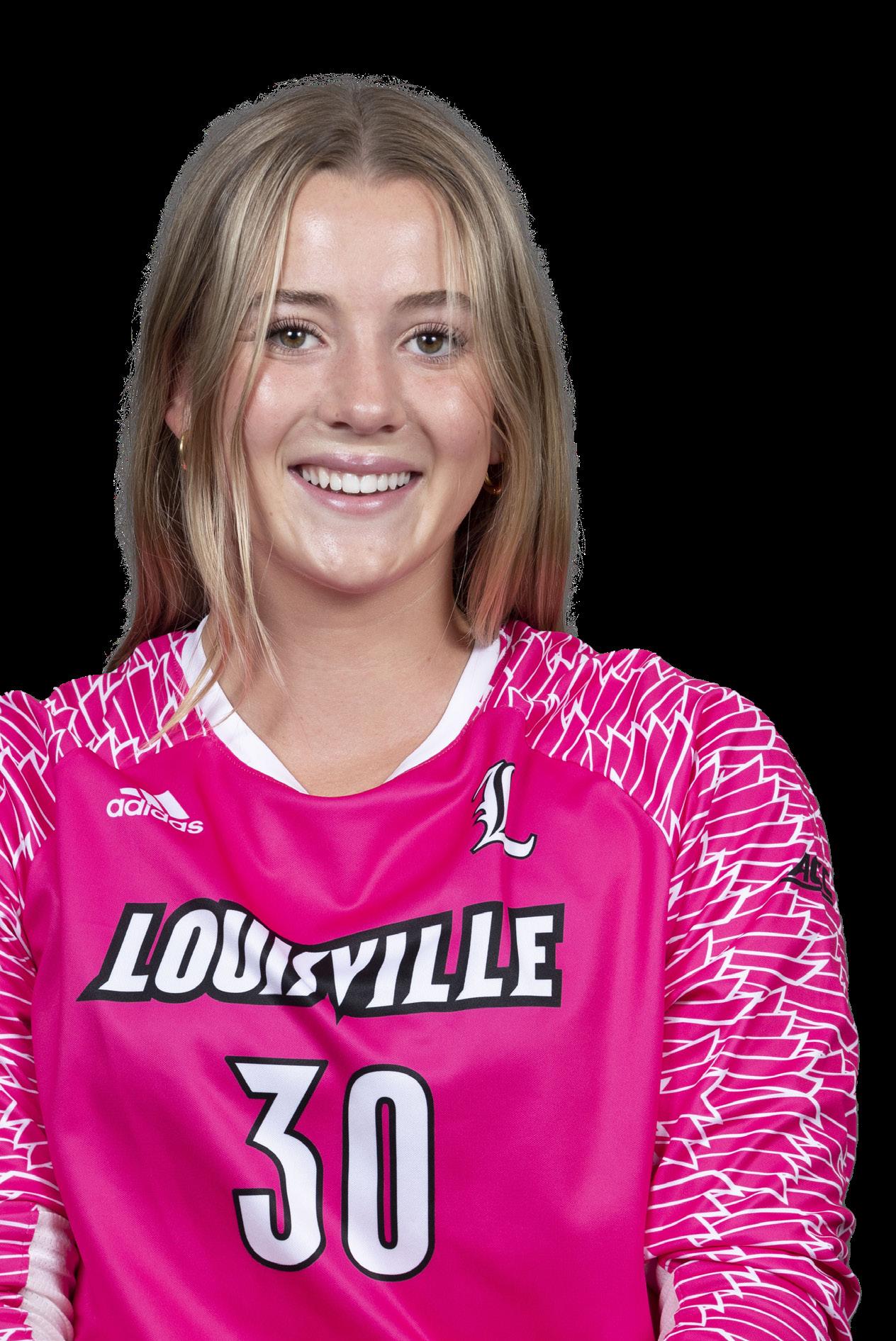
EF: [I was] born and raised in Wilton, Connecticut [and] am the youngest of three. I have an older brother and sister and was raised in an athletic and competitive family. My dad, older sister, many cousins and [other
extended family] were collegiate athletes. I also grew up in [an equally] athletic and competitive county, where it was incredibly common for high school athletes to continue their sports collegiately and even more specifically at Power 4 programs.
UofL: How did you initially get into soccer and why did you choose to continue that passion?
EF: I’ve been playing for as long as I can remember. My parents were both athletes and my older sister loved soccer early on, it was just one of the first sports I had been introduced to. I grew to love the competitive nature of the game and the connections it has given me. Soccer has shaped so much of who I am–it’s pushed me to grow in ways I never expected, both on and off the field. The opportunities to travel, meet new people and build lifelong friendships are things I’ll never take for granted. Being a collegiate student-athlete has truly been a blessing.
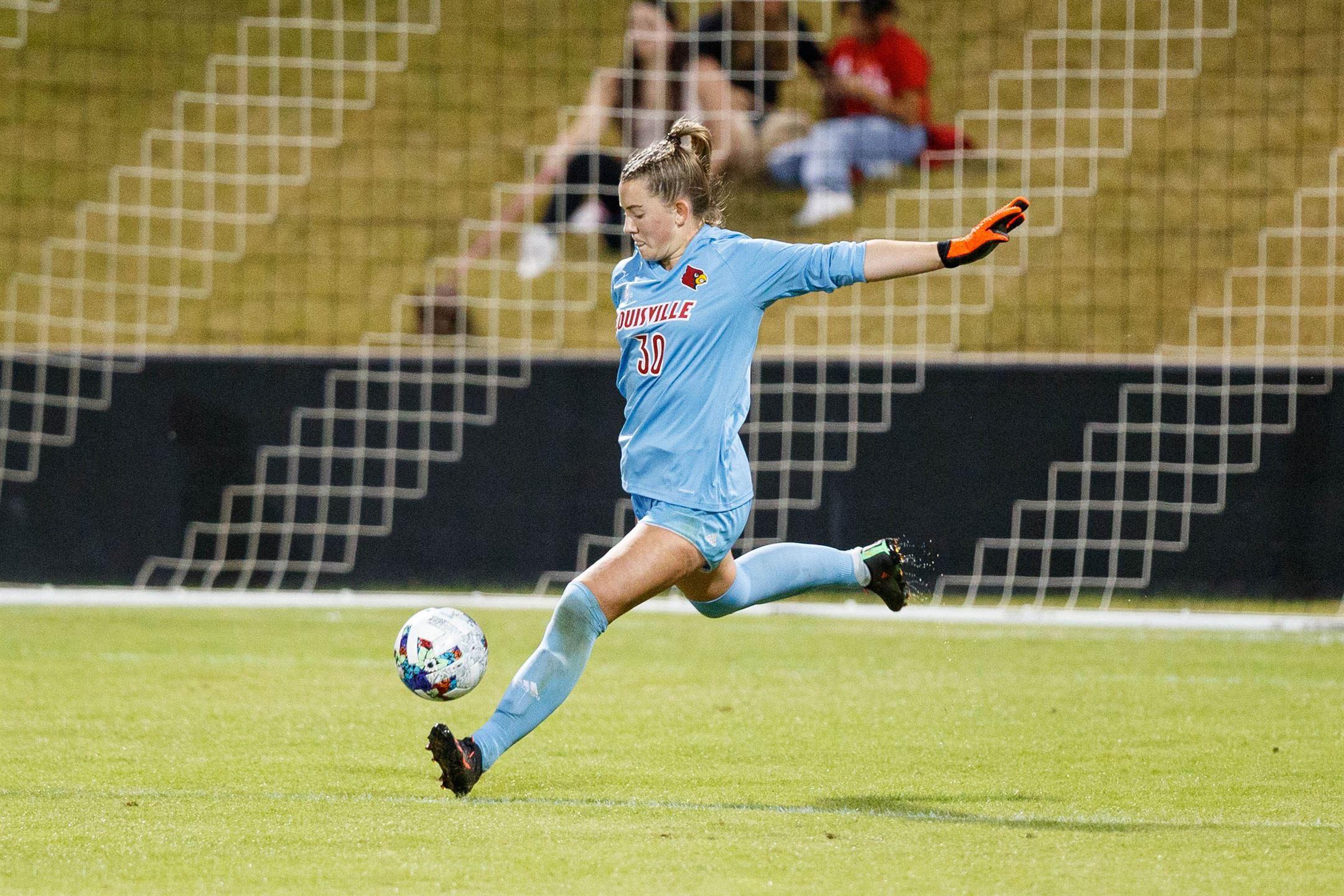
UofL: What led you to choose UofL?
EF: I was looking for both a competitive soccer program and strong business school. Louisville gave me the chance to play at one of the highest levels in the country while also pursuing a degree. I also loved the city–it has been nice to step outside of my northeast bubble and experience the midsouth.
UofL: What challenges have you faced as a student-athlete and how did you overcome them?
EF: Time management is definitely the first challenge every student-athlete faces, especially during the season when travel and games are stacked. For me personally, the bigger challenge has been holding on to my identity outside of soccer. It’s easy to let a sport become your whole world. I’ve had times where I felt like I was only “Erynn the soccer player.” I’ve learned to step outside of that by prioritizing things that make me me, whether it’s reading, going on walks or just taking time to reset. Reminding myself that I’m a student with the opportunity to be an athlete, not
the other way around, has been huge for my balance. [I] always try to remind myself how the position I am in now is one I always dreamed about and not to take it for granted.
UofL: How has faculty and staff impacted your time at UofL?
EF: I’ve loved the small class sizes in the College of Business—they’ve allowed me to really connect with my professors. Professor [Ray] Chastain has been a standout for me, both in business statistics and data analytics. You can tell he truly cares about his students’ success and learning. Alyssa Murphy, our assistant athletic director, has been a rock for me over the past four years. She’s challenged me to have tough conversations about life after soccer and my goals in business.
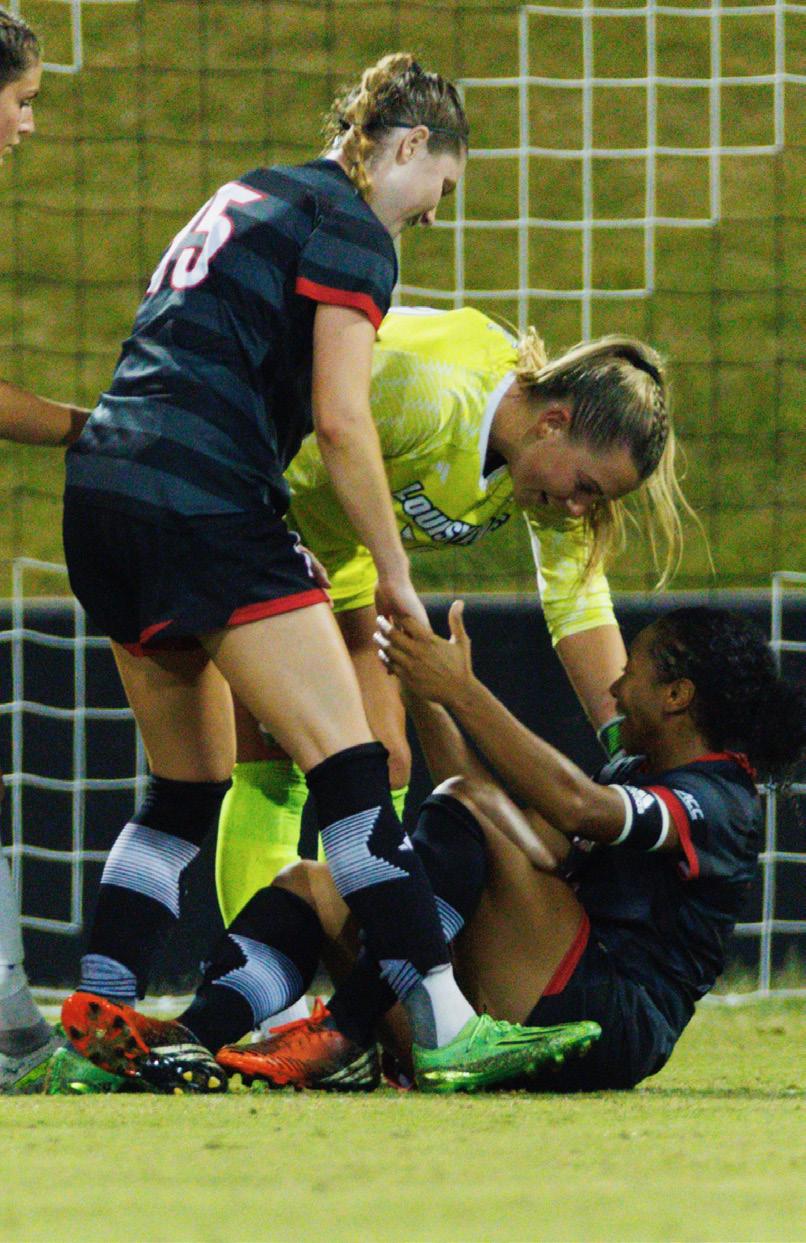
UofL: How do you think your time as a studentathlete has prepared you for post-grad life?
EF: Being a student-athlete builds so many transferable skills: time management, communication, leadership, dedication – the list goes on. Sometimes we feel behind because we miss out on traditional internships, but I’ve realized that sports themselves are training grounds for real-world skills. I had an incredible internship with Her Competitive Advantage, a company that helps female student-athletes showcase those skills in professional settings. It opened my eyes to how much we already bring to the table as we transition into the workforce.
UofL: How do you feel a business degree prepares student-athletes for real world situations, like managing professional agreements and opportunities outside the classroom?
EF: So many classes I’ve taken at the College of Business are directly applicable to real life –like finance courses on taxes and management courses on teamwork. These aren’t just business skills, they’re life skills. The most valuable thing my business degree has given me, though, is the ability to create and foster meaningful connections, which I know will carry me far beyond the classroom.
UofL: Do you have any advice for new or current student-athletes?
EF: Build connections with everyone –professors, classmates, coaches [and] staff. You never know when those relationships might come back around. Most people you’ll meet have either been in your shoes or understand what you’re going through, so don’t be afraid to ask questions or seek advice. [Also] meet with Alyssa Murphy – she’s an incredible resource and truly is in your corner.

This summer, Louisville-area high school students reached new heights in their understanding of artificial intelligence at Flying High with AI, a one-day immersive camp focused on the future of business and marketing. Open to students in grades 9–12, the camp offered an exciting, handson introduction to how AI is reshaping industries through automation, branding and social media strategy.
Through interactive sessions and real-world applications, students learned to harness cuttingedge tools to create their own AI-powered marketing campaigns. No prior experience was required—just curiosity, creativity and a willingness to explore. Each participant walked away with a completed portfolio project, new tech skills, a certificate of completion and a custom camp T-shirt to commemorate the experience.
Your next chapter needs a game plan. Whether it is to score big or you’re just ready to make your own moves, here at the University of Louisville, we can kick start your future in marketing. Learn more at business.louisville. edu/academics-programs/undergraduate-programs/ marketing/
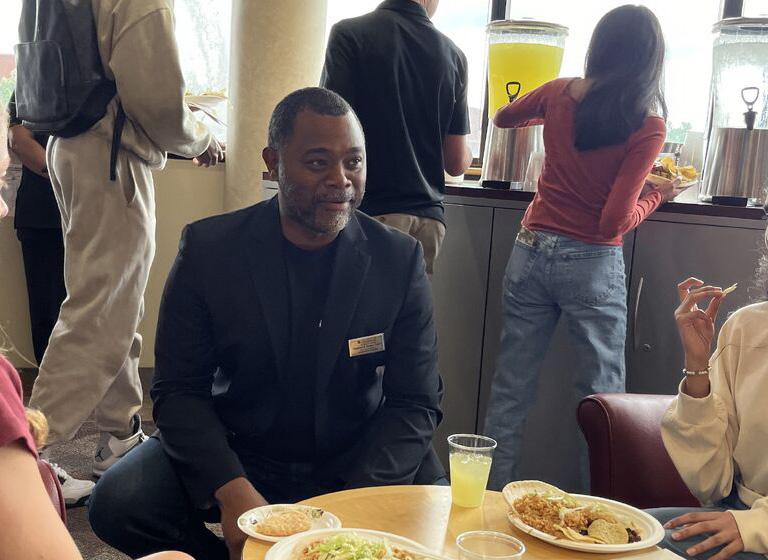
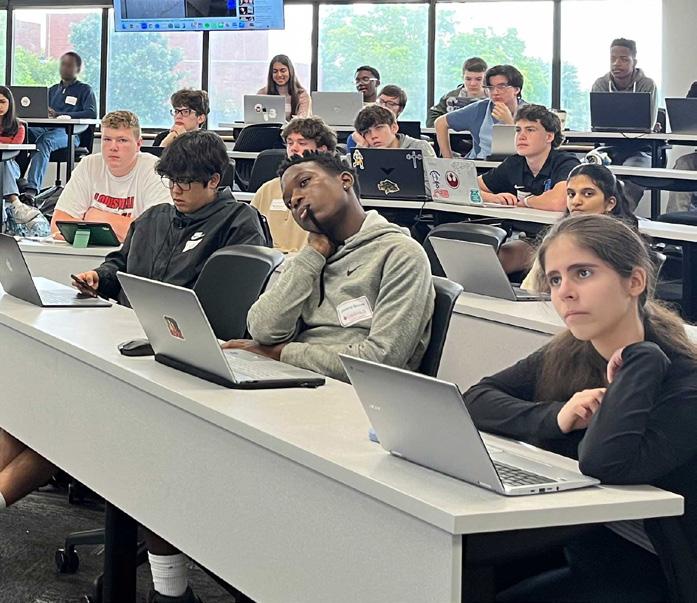


by Betty Coffman
The Yum! Scholars Program, launched this fall through the Yum! Center for Global Franchise Excellence in the UofL College of Business, has welcomed 10 students to its first cohort. Yum! Scholars, who may be from any school and major across the university, receive up to $8,000 in financial support and mentoring within a community designed to help them become the next generation of leaders who drive growth, innovation and success in the franchising world. Successful scholars will embody the spirit of leadership, resilience and community impact.
“Being selected as a Yum! Scholar means having the support and opportunity to turn my hard work and dreams into a future where I can give back to my community,” said Ethan Walker, a junior majoring in business administration.

The program is made possible by a $1-million endowment from Yum! Brands, demonstrating Yum!’s commitment to investing in the next generation of franchise business leaders. The program aims to prepare talented individuals for thriving careers in franchising, business and leadership.
“It’s truly a pleasure to support these amazing students from Yum!
Brands’ home state of Kentucky,” said Kat Abner, senior manager, community impact for Yum! Brands. “It is so rewarding to continue working with the University of Louisville on innovative ways to provide a best-inclass education to those interested in a career in franchising. The industry’s future leaders are being trained today at the Yum! Center for Global Franchise Excellence.”
Yum! Scholars will have exclusive opportunities to engage with franchise industry professionals to help build their professional network and provide real-world franchising insights as part of the scholars’ community, while pursuing the degree of their choice.
“These students will be prepared to become leaders in the franchising industry,” said Kathleen Gosser, director of the Yum! Center for Global Franchise Excellence. “Franchising provides a tremendous entrepreneurial opportunity for students who are driven and focused. This program will help boost their success and accelerate their careers.”
Learn more about the Yum! Scholars Program at business.louisville.edu/about/learning-at-cob/ yumcgfe/yum-scholars-scholarship-program/
2025 Yum! Scholars
Brian Alonso Sophomore, Business Administration
Mohammed Alyaserri Junior, Computer Information Systems
Mateo Barrientos Junior, Public Health Maycee Decker Junior, Biology
Ezra Foote Sophomore, Political Science
Kyleigh Greenwell Sophomore, Accountancy
TaRon Smith Junior, Neuroscience
Key’Shawn Stoner Sophomore, Business Administration
Ethan Walker Junior, Business Administration
Trinity Ziakas Sophomore, Psychology
by Erica Hulse
“It’s what I consider to be a true executive experience,“ shared Senior Executive Director for Corporate and Executive Education Kim Mallory, referencing the week-long residency of the inaugural cohort of the 2025–one of two programs available for aspiring or current professionals in the franchise industry. The College of Business welcomed participating restaurant franchise professionals from around the country to the exclusive in-person event held on the University of Louisville’s Belknap campus to mark the conclusion

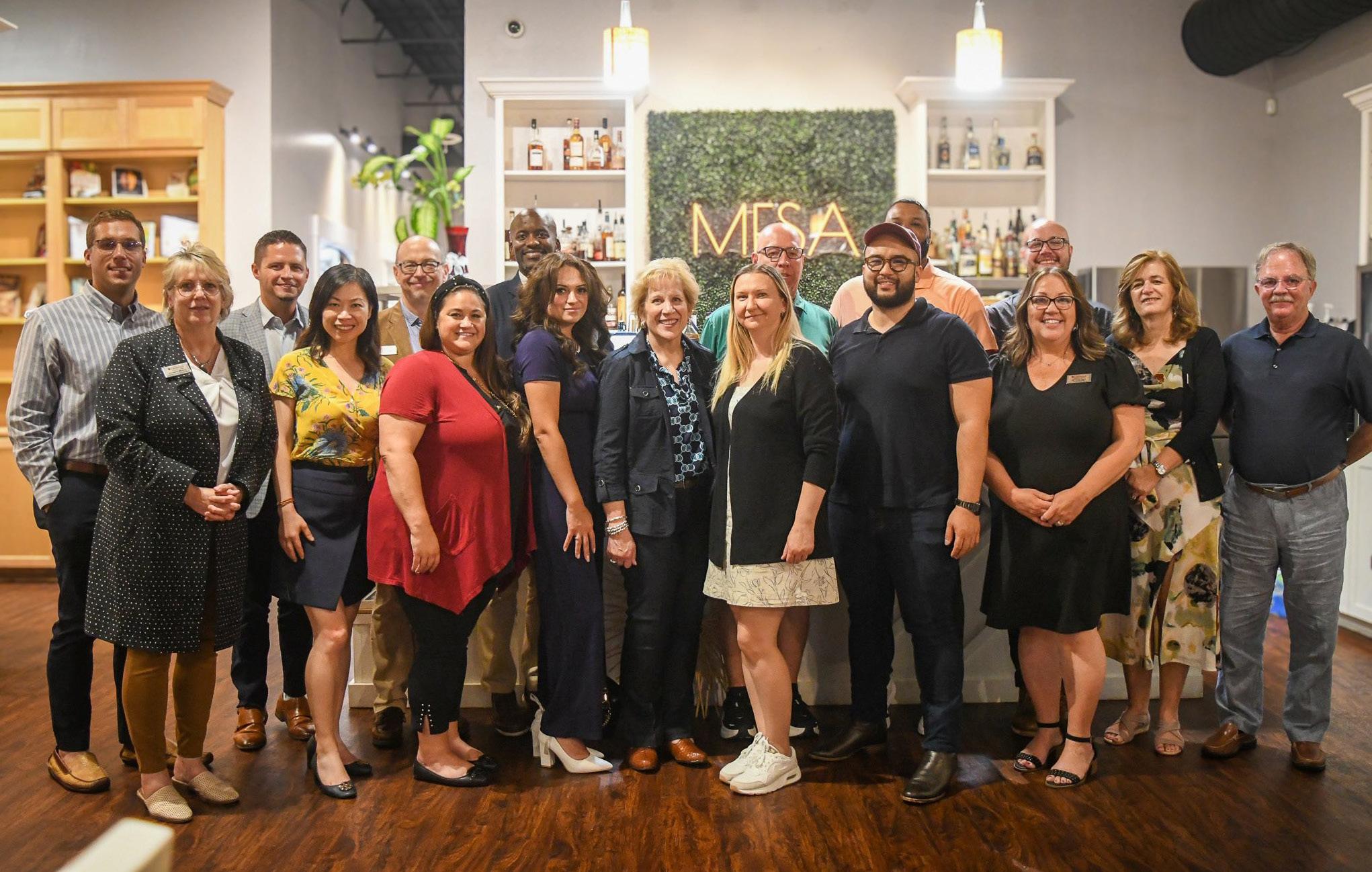


The programmatic collaboration, sponsored by the Yum! Center for Global Franchise Excellence, consisted of six one-month online courses with synchronous and asynchronous components, followed by a three-month applied learning project in which participants individually develop a business plan with one-on-one coaching prior to completing the in-person component of the program. Director of the Yum! CGFE, Kathy Gosser, explained the depth of the partnership between the mutual departments. “It was truly collaborative,” she said. “Executive Education managed the logistics such as venues, meals and seamless execution, while the Yum! Center focused on content and engagement. We [also] secured dynamic speakers, coordinated site visits and prepared participants for their presentations.”
Throughout the week the group had the opportunity to not just connect and network inperson with fellow participants, but also meet programmatic instructors face-to-face, hear from franchise executives, visit innovative greater Louisville-area restaurant models such as MESA, tour the area headquarters of powerhouse restaurant franchises Yum! and Texas Roadhouse and present their business plan projects to fellow cohort members and programmatic instructors.
Woven into the week and arguably the most immersive portion of the residency was a case study developed and taught by Gosser and Department Chair for Management and Entrepreneurship Zac Goldman, which allowed attendees to witness first-hand how roadblocks to progress can occur in real time, and workshop ways in which leaders can overcome those daily issues to productivity and progress. “We wanted to immerse participants in a realistic franchise operations environment,” said Gosser, “so we created a custom case study. Each day, a new
chapter unfolded, introducing fresh challenges.” Goldman shared more about the nuances of the study and his inclusion of realistic events that often require leaders to take initiative or pivot to damage control in times of crisis. “My contributions added multimodal components, [with disruptions like] interactive text messages from characters featured in our case, [such as a surprise text from an unhappy area coach],” he explained, “or creating breaking news updates [generated] with artificial intelligence [about new legislation] that updated the circumstances governing the scenario.”
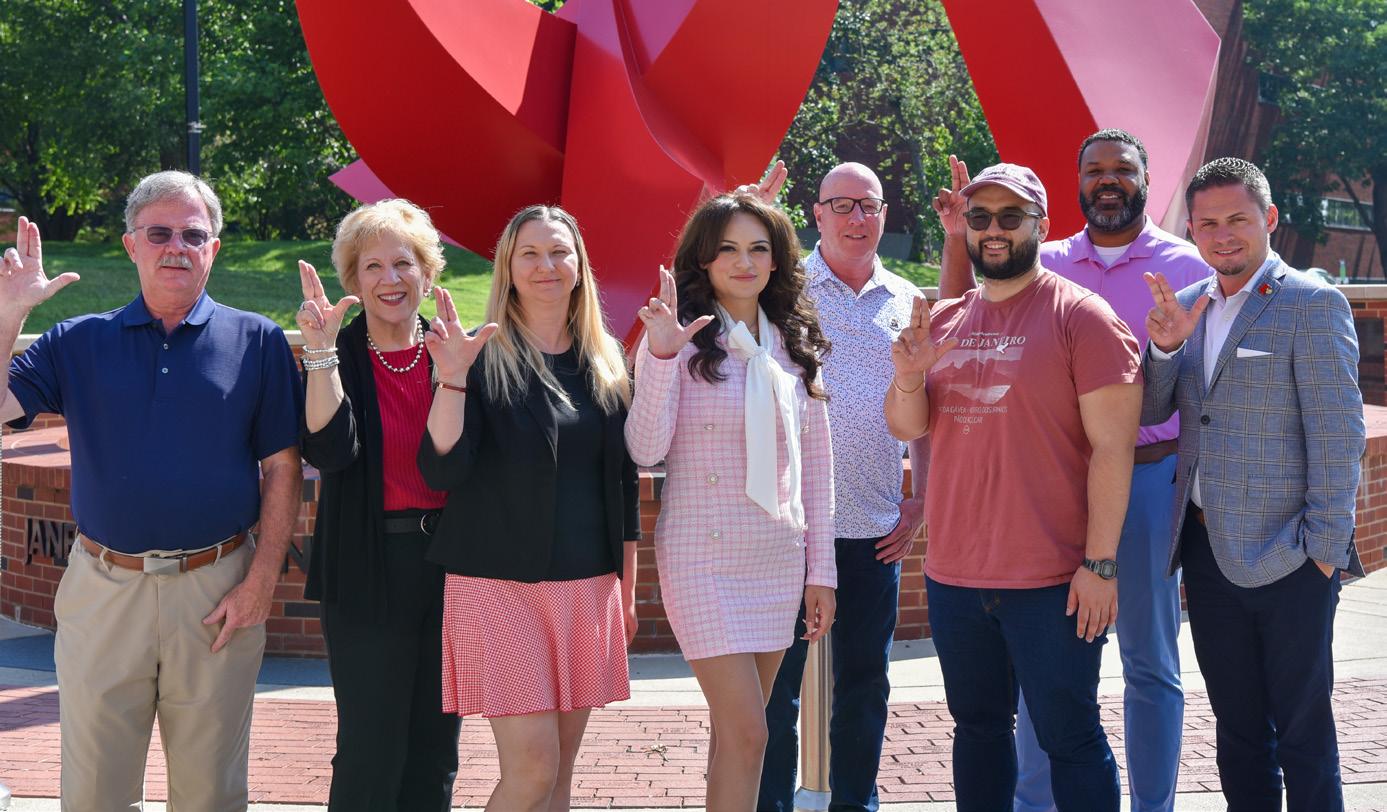
Bridging months of education with residency served as one of the most critical components of the program, providing a truly one-of-a-kind training experience for restaurant franchise professionals. Gosser noted that, “Most senior leadership programs are broad and industry-agnostic. This residency zeroed in on the specific realities of leading at scale in the restaurant franchise sector.”
Looking ahead to future cohorts, both Mallory and Gosser hope to continue to develop and improve the program as they receive feedback from attendees. “We’re eager to incorporate participant feedback,” Gosser explained, ”but already we see opportunities to refine.”

Hungry for leadership growth? The Accelerating Enterprise Growth program serves up executive-level training designed specifically for restaurant franchise professionals. Learn from world-renowned experts, sharpen your strategy and take your place at the leadership table. Learn more at business.louisville. edu/academics-programs/execed/
by Erica Hulse
Online MBA Student Kristina CabañezWinner Balances Multiple Roles as Doctor, Entrepreneur, Spouse and Mother
With a white coat and a business plan, University of Louisville Regulatory Affairs Specialist for the Clinical Trials Unit, owner of Squeegee Squad Louisville-Frankfort and Online MBA student Kristina CabañezWinner proves daily that compassion and ambition can thrive in the same heartbeat. The healer and entrepreneur believes in challenging herself not just to be good enough–but to lead. Cabañez-Winner recently shared with us the strength she draws from her Filipino roots, how the challenges of entrepreneurship help her thrive and how she finds purpose in each trade-off she makes as a mother, student and professional.
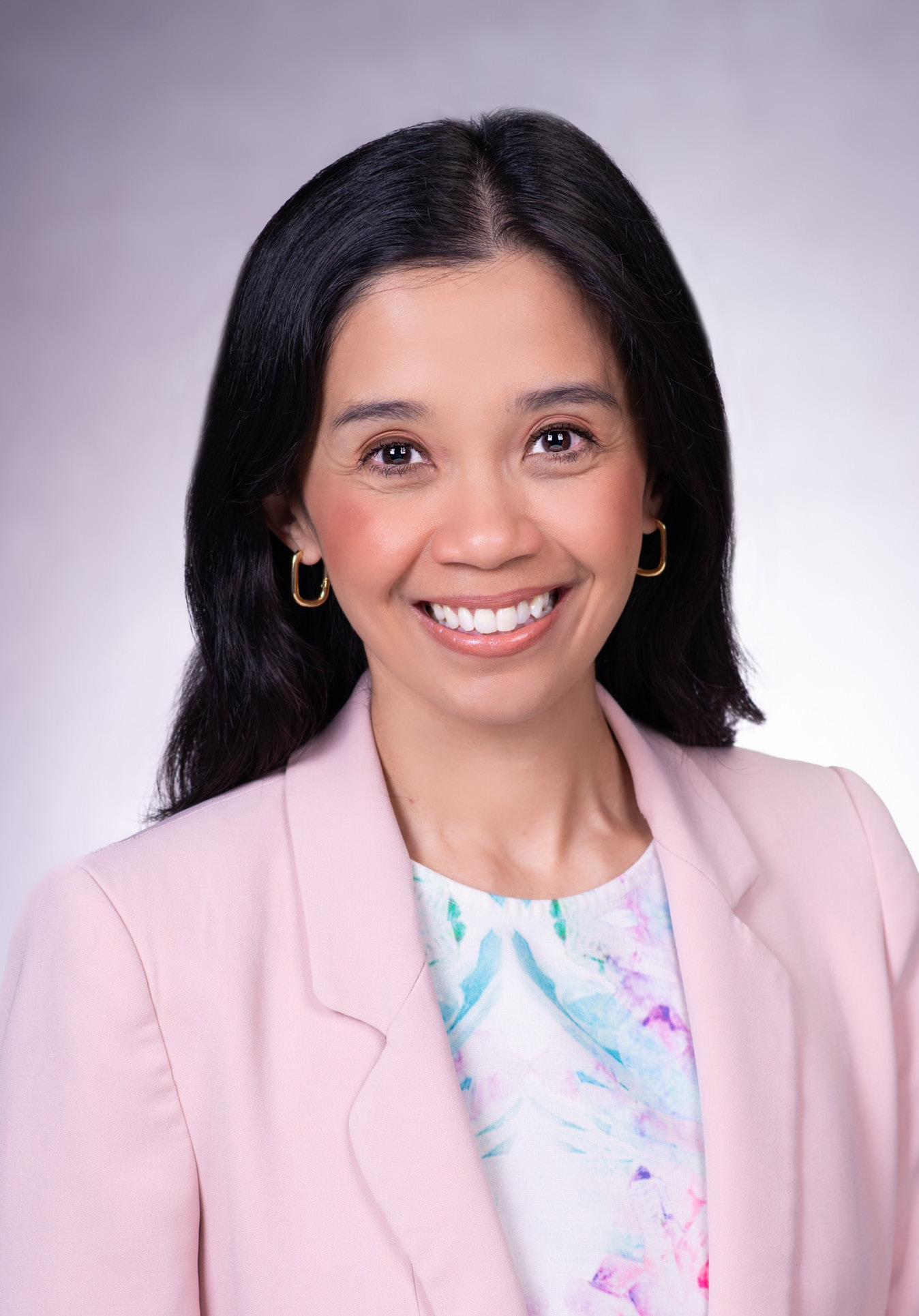
UofL: Please share more about your background and your life growing up.
KCW: I was born and raised in the Philippines–proud Filipino through and through! I grew up surrounded by an incredible family with a lot
of support and love. Culturally, Filipinos are very closeknit and family-oriented. I was very fortunate to grow up in a culture that practices good work ethic, values education, respects elders and our superiors and works very hard. Anytime I run into someone who works with a Filipino or an entire Filipino community, they have nothing but wonderful things to say about their commitment to work, sense of humor, love for food (obviously) and life and that they are just happy people overall.
UofL: What inspired you to pursue a career in medicine?
KCW: The running joke is that my siblings and I only had two career options–to either be a lawyer or doctor. It was instilled in us at a very young age that we needed to pursue a profession that was rewarding but also provided financial stability, and medicine became an easy choice. On top of that, our family was very involved in helping pediatric cancer patients. My sister and I would spend our birthdays at pediatric cancer units at different hospitals, so there is definitely an altruistic element that comes into play when
you make a commitment to earning your MD. My brother is a practicing physician in the Philippines and I have looked up to him from day one. Seeing how he carries himself as a professional, truly cares for his patients and how brilliant he is, made me eager to follow in his footsteps.
UofL: How do you balance your career, personal life and OMBA studies?
KCW: If anyone knows the answer to “balancing it all,” I would love to be the first to know. I don’t believe in balance, but I do believe my life is built around a series of trade-offs. If I am working on my MBA assignments in the evenings or on weekends, that means I am spending less time with my daughter and husband. When I go about completing responsibilities related to my fulltime job, I have to set aside matters related to business for a later time. The truth of the matter is, I never feel like I am actually working. My baseline is having multiple things happening at once without really sacrificing quality. I get up in the morning feeling excited, always. Even on the hard days–and I have a lot of those. But because I genuinely love everything I do, it never feels like I’m working “too hard” or “too much.”
UofL: What led you to develop an interest in entrepreneurship, and how did that evolve into your decision to operate Squeegee Squad?
KCW: I own 100% of Squeegee Squad LouisvilleFrankfort, which is something I really take pride in! I will, however, point out that my husband has provided me with the biggest support throughout my journey as a business owner so far. He has shared many late nights with me trying to navigate through a lot of the kinks that come with running a business, so I have him to thank for that.
Entrepreneurship has always been a recurring theme in my life, which is funny looking back at it now. I started selling stickers and stationery to my classmates when I was nine and drew my own receipts, a gesture I thought made my business “official.” I moved on to selling
homebaked oatmeal cookies when I was 12 and then ventured into starting two more businesses when I was in medical school. As much as I tried to shove my true calling to thrive in the world of business and focus solely on medicine, it just would not leave me alone.
Both of my parents are also entrepreneurs. I probably did not realize it then, but seeing how they dealt with the daily operations of their businesses allowed me to take a peek behind the curtain and passively absorb what they were showing me in a very indirect manner.
UofL: How has your experience as a small business owner shaped your approach to learning?
KCW: My life has been a series of nontraditional routes–the fact that I was presented with an opportunity to pursue my MBA after joining the world of business was a perfect confluence of events and very “onbrand” for me.
I learn best by doing. Each class I take in the program allows me to apply what I’ve learned and better prepares me for the next move in my business. There is no better way to learn business than to get in the weeds of it, and that is probably why I had moments in my younger years when I struggled to stay interested in certain subjects, especially when I was just seated in a room trying to absorb everything. I needed to always find ways to apply these concepts where it made the most sense.
Additionally, I value credibility. When you become responsible for other people’s livelihoods as a business owner and find yourself building a reputation that not only represents your company, but who you are as an individual, your perspective on things shifts. Being part of an MBA program has solidified my “why,” “how” and “what now” as a business owner. At the end of the day, experience builds credibility, but when you pair that with investing in yourself by furthering your education (and maximizing that opportunity), you become unstoppable.
UofL: Which individuals have provided you the greatest support while pursuing your MBA?
KCW: My husband and my daughter have undoubtedly been my biggest cheerleaders. They are witnesses to the panda eyes I get from the late nights and long hours I put into this program. I am also very fortunate to have family that support me even from a distance. My mom, who lives in the Philippines, will remind me every now and then to not just study hard but excel. I have learned to appreciate those little reminders over time, especially with me being away from most of my family. The goals I set for myself mean nothing if I do not have the support of people that genuinely want me to succeed. This same group of people are also not afraid to call me out when I need to be corrected or hit the breaks. It keeps me grounded and really gives me something to look forward to at the end of the day.
UofL: Why would you encourage other busy professionals to consider an online program over a traditional in-person program?
KCW: Have you seen gas prices recently? Kidding aside, the fact that there even exists an opportunity to earn your degree online while being able to work a full-time job is such a luxury. As someone who is a mom to a toddler, works a full-time job and runs a business, the decision to pursue an online program was a no-brainer. The asynchronous learning approach coupled with a solid, supportive leadership team and professors that are experts in their respective fields and walk you through the learning process have been critical in the success of students in this program. I have been able to “attend” lectures and work on my homework during my lunch break, nap times and built a schedule around my days to where I am able to maintain productivity, work on personal development and still have a life outside of it.
UofL: Would you like to share any final thoughts?
KCW: I am a big advocate for networking, connecting with people and building relationships with industry professionals. If you would like to connect, please say hello on LinkedIn at: linkedin.com/in/kristina-cabanez
The College of Business is proud to welcome its newest staff and faculty to the Cardinal Community. These faces will help shape our students’ lives and enrich the University’s knowledge base.
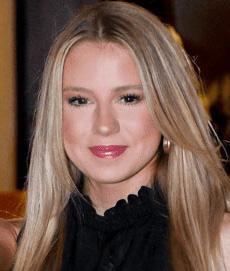
ALEXIS MOWEN
Admissions Counselor, Undergraduate Programs
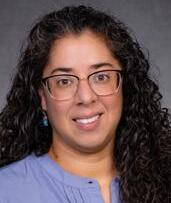
AJ TEMPLETON
Associate Professor, Management & Entrepreneurship
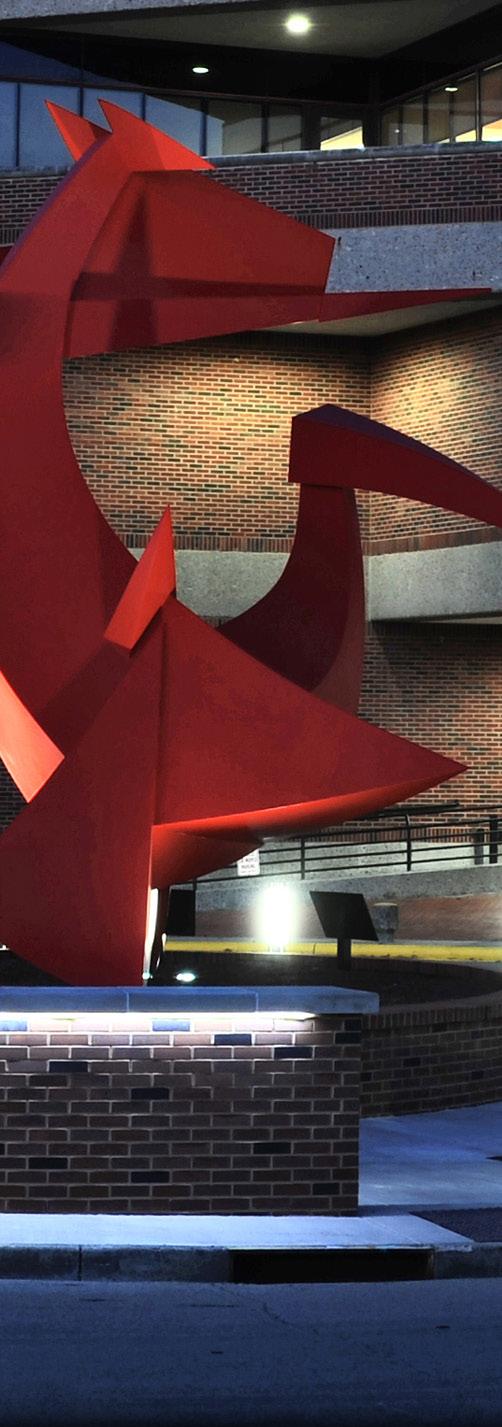
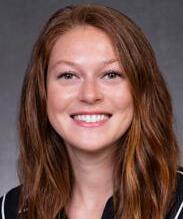
Admissions Counselor, Graduate Programs
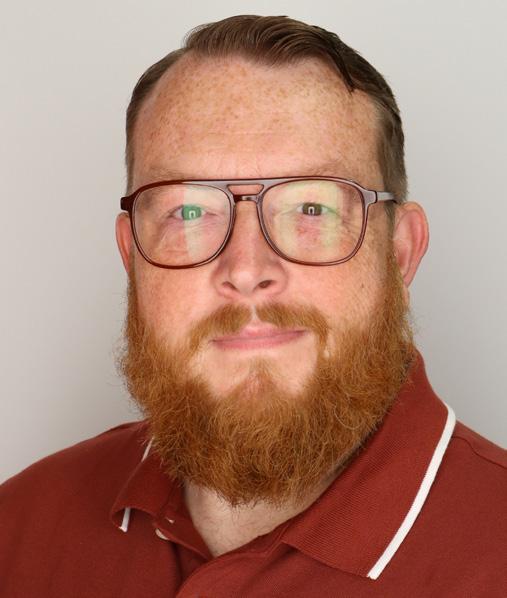
ADAM POTTS
Department Coordinator, Family Business Center
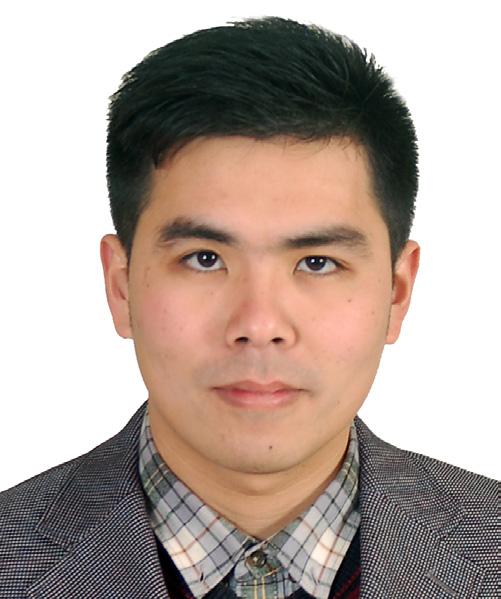
Assistant Professor, Finance
UOFL FAMILY BUSINESS CENTER
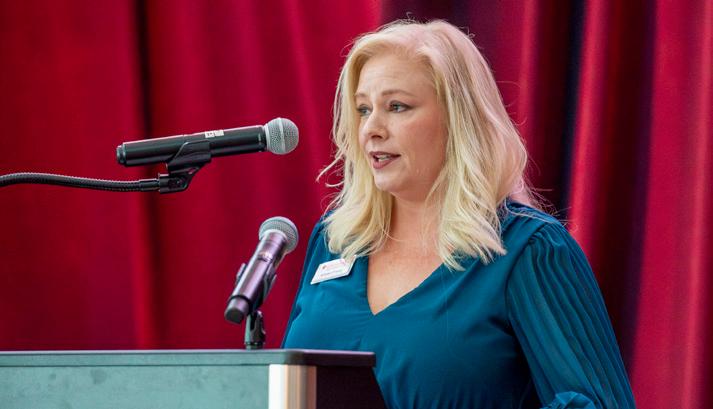
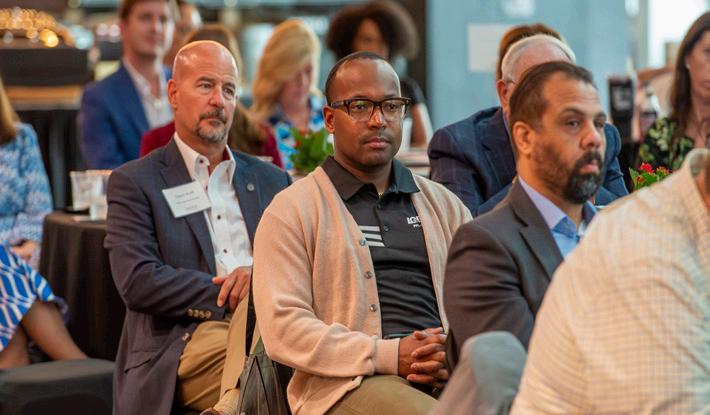
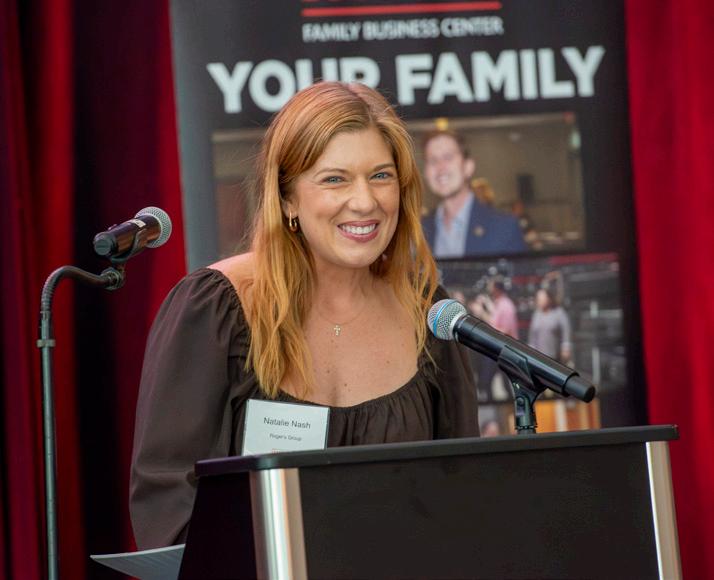
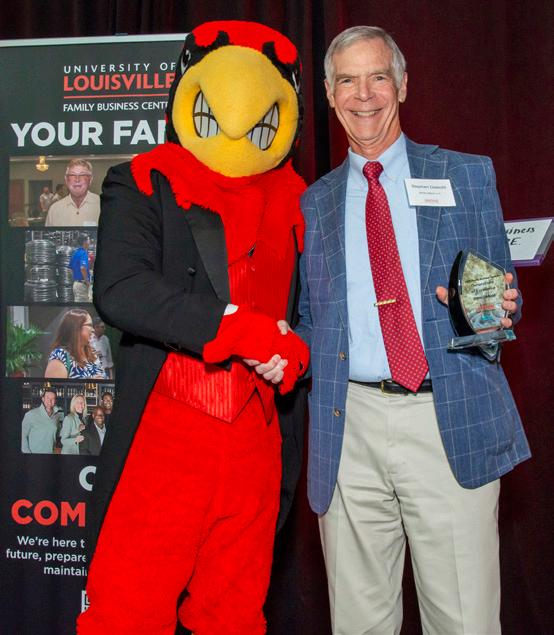
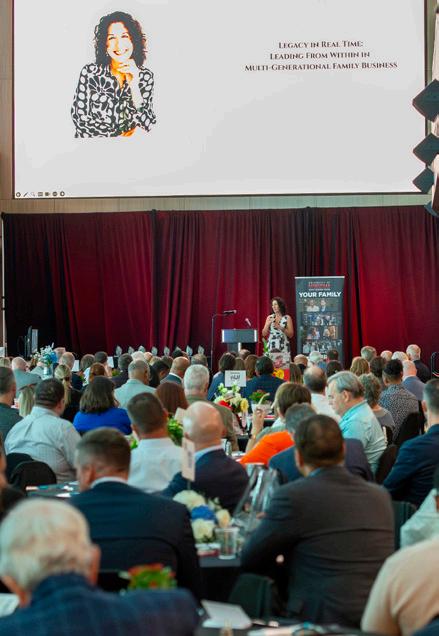
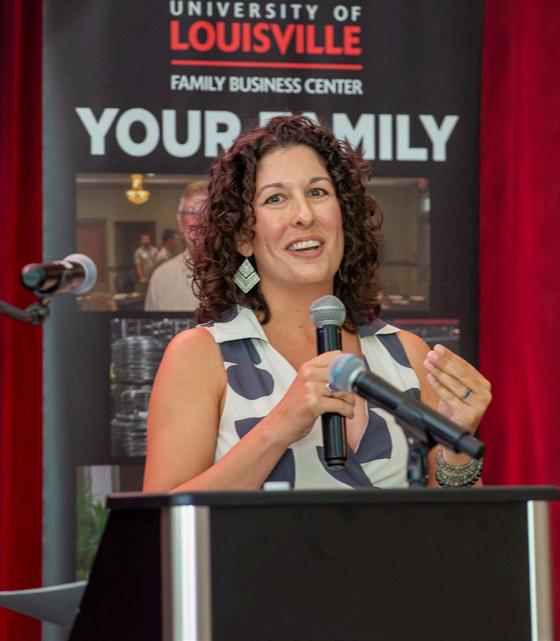
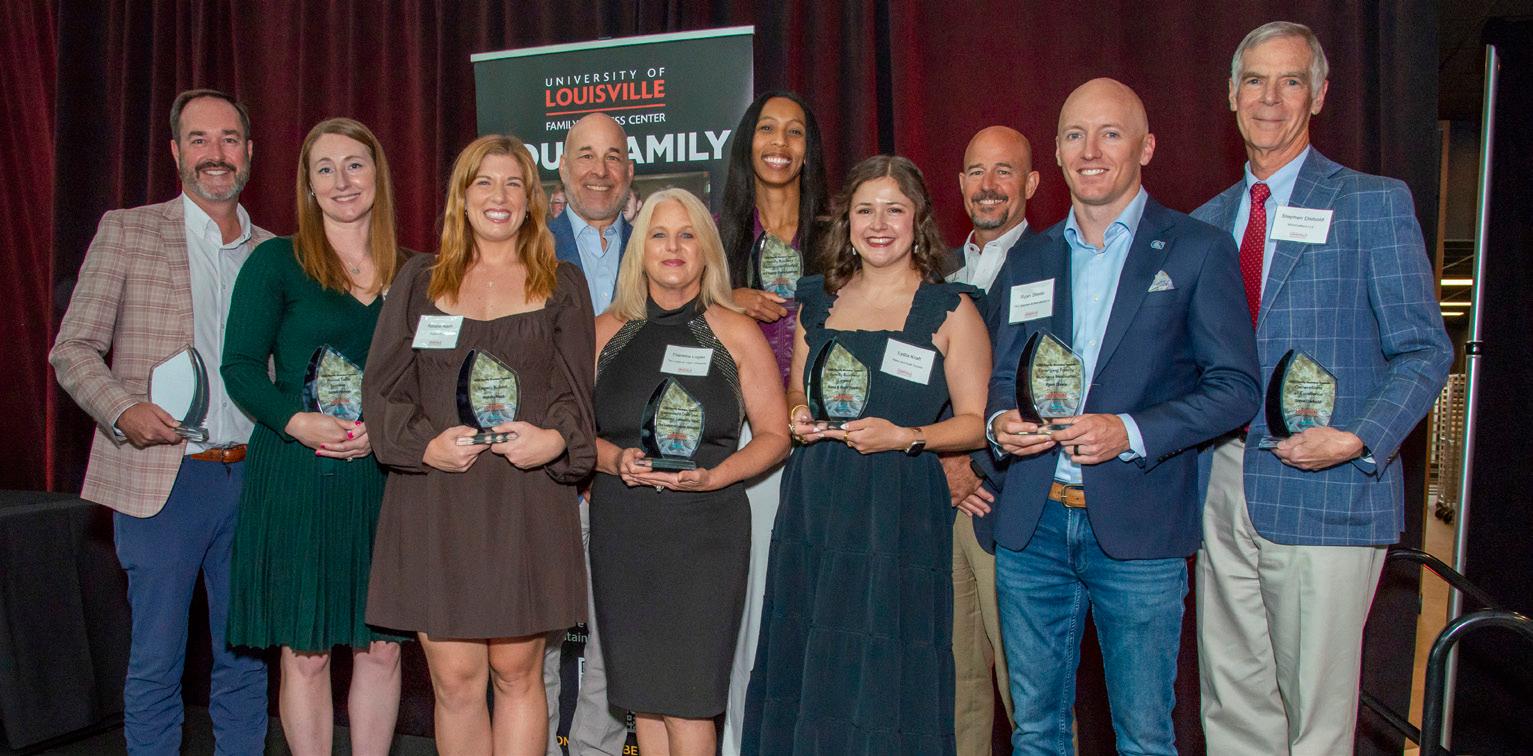
The 2025 Family Business Awards and Summit, hosted by the UofL Family Business Center, brought together two signature events for an afternoon celebrating leadership and legacy in Louisville’s family business community. Held at the Angel’s Envy Bourbon Club at Cardinal Stadium, the gathering featured remarks from College of Business Dean Amy Henley and a keynote address by President and CEO Anne Bauer of Racket. The event concluded with the presentation of the 2025 Family Business Awards, honoring standout achievements in the following categories:
MULTI-ENTERPRISE LEADERSHIP: Kevin Zoeller, Zoeller Company, VW Ventures and Hillerich & Bradsby
GENERATIONS OF EXCELLENCE: Steve Diebold, Wirecrafters, LLC
EMERGING FAMILY BUSINESS INNOVATOR: Ryan Steele, C&S Machine and Manufacturing Corporation
LEGACY BUILDER: Natalie Nash, Rogers Group
ROUND TABLE LUMINARY: Sarah Paynter, Duplicator Sales & Service
COMMONWEALTH CREDIT UNION EXCELLENCE IN COMMUNITY IMPACT: The Lodge at Logan Vineyards
FAMILY BUSINESS COMMUNITY CATALYST: HJI Supply Chain Solutions
FAMILY BUSINESS LEGACY: Nanz & Kraft Florists

by Erica Hulse
Do you want to develop software? Are you driven to initiate societal change? What if you could launch your own business or lead your non-profit organization while earning college credit? If launching a startup or solving a pressing social issue is your goal, this fall, the University of Louisville College of Business will begin providing unique learning platforms for ambitious, forward-thinking undergraduate students to institute real change, be it in tech industry startups or area non-profit organizations and initiatives, before they even earn degrees. Two groundbreaking, 18-hour experiential learning classes–Sandbox and Elevator–challenge undergraduate business students to work collaboratively to tackle real-world issues or address consumer technology needs across disciplines and academic units at UofL. These offerings do more than teach entrepreneurship and leadership—they let students live it.
Though it functions as a class, Sandbox is more like a launchpad. Originally created as an experiment at Brigham Young University in 2020, the two-semester capstone experience is geared toward entrepreneurs with a passion for software technology and is facilitated through the Forcht Center for Entrepreneurship. Students in management, computer information systems or Bachelor of Business Administration programs participating in the course are placed into twoor three-person groups with learners in UofL’s electrical engineering program at the J.B. Speed School of Engineering and graphic design program at the College of Arts and Sciences. The Sandbox platform challenges these small teams to cultivate relationships with their curated venture capitalist network, including mentors and early adopter customers, pitch their products to prospective backers and develop design prototypes. “You have your individual team that’s
building together, but then as you unlock different steps in the Sandbox process, it opens up a whole network of early adopter customers,” shared Ryan Quinn, Department Chair for Management and Entrepreneurship. “You get access to that network, and then you get a little further along, and you get access to a network of founders you can ask for advice about how they created their [products].”
However, the Sandbox experience does not end when courses are completed and a degree has been earned. “You get access to a venture capitalist network where you can learn about how to pitch it, and then there’s also a preferred hire network,” he noted. “Sandbox has a network of companies that have said if a Sandbox student sends a resume, it goes straight to the hiring manager. You get first consideration if you do it. So that’s another network that you get involved in.”
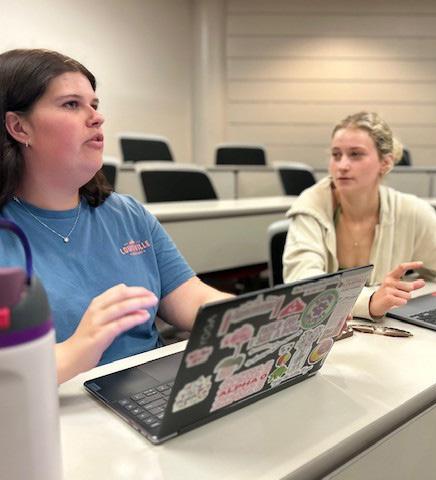
While Sandbox focuses on entrepreneurship, the capstone course Elevator, sponsored by a generous donation from the Bufford family and offered through the Center for Positive Leadership, applies this same model to community leadership and social change. With Elevator, management or BBA students collaborate with learners from other UofL programs such as criminal justice, sustainability, urban studies, sociology and communications, working in interdisciplinary teams over the course of an academic year to address local issues— from elder care loneliness to sustainable green spaces. Projects are community-driven and often sponsored by local non-profits or small businesses. “Elevator is basically change leadership…students are going to be trying to make changes in the community,” shared Quinn. “One is a business where they are going to try to grow DaLat’s Café, a Vietnamese cafe in South Louisville, and a local non-profit is sponsoring students in creating a grow room to help eliminate a food desert.”
With a cross-disciplinary structure, Sandbox and Elevator are revolutionizing the undergraduate educational experience by forming well-balanced teams structured to aid students in showcasing their personal strengths and exposing them to skills across several industries, mirroring the dynamics of real-world project teams. This intentional collaboration encourages communication, innovative thinking and the ability to solve problems efficiently, which are necessary skills employers seek.
enrollment and eventually build additional experiential classes modeled after Sandbox and Elevator—perhaps in fields like the arts, public health or data science, Quinn said that he is hopeful the college can continue “growing other programs like this, whether it’s programs that are entrepreneurial…besides software, [or] similar programs that are non-entrepreneurial, like Elevator.” Recognizing the potential in educating across UofL’s academic units and overcoming programmatic boundaries, he explained, “I would love to see experiential learning become the norm rather than the exception in universities.”
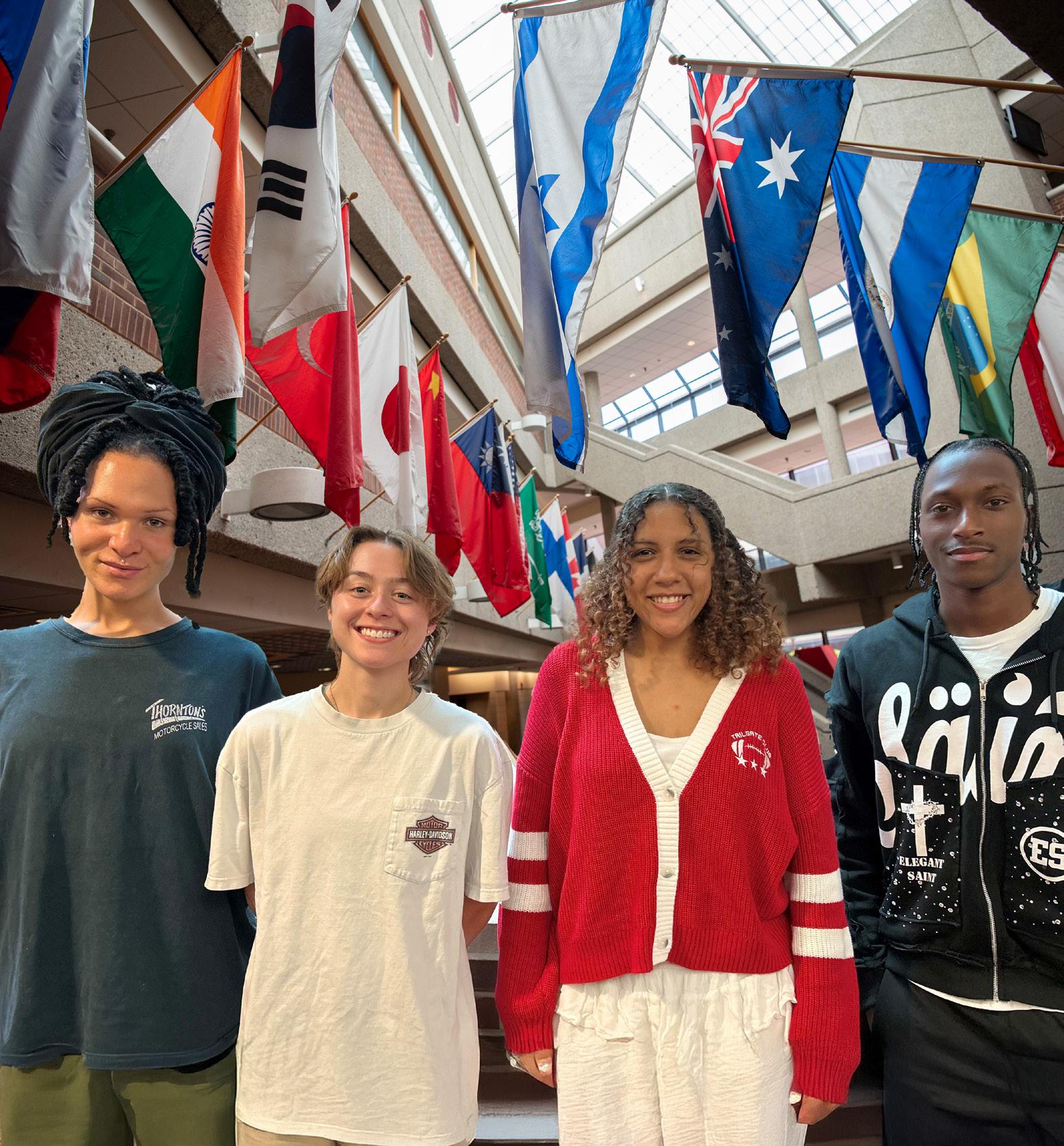
As these programs evolve, so too does the college’s vision. Hoping to expand access, increase

Are you interested in mentoring a team, participating in a customer feedback network or contributing funding to Sandbox or Elevator? For more information or to donate your time or financial contributions to Sandbox, contact Management and Entrepreneurship Instructor Jack Manzella at john.manzella.1@ louisville.edu. For Elevator, connect with Quinn at ryan.quinn@ louisville.edu or 502-852-4873.
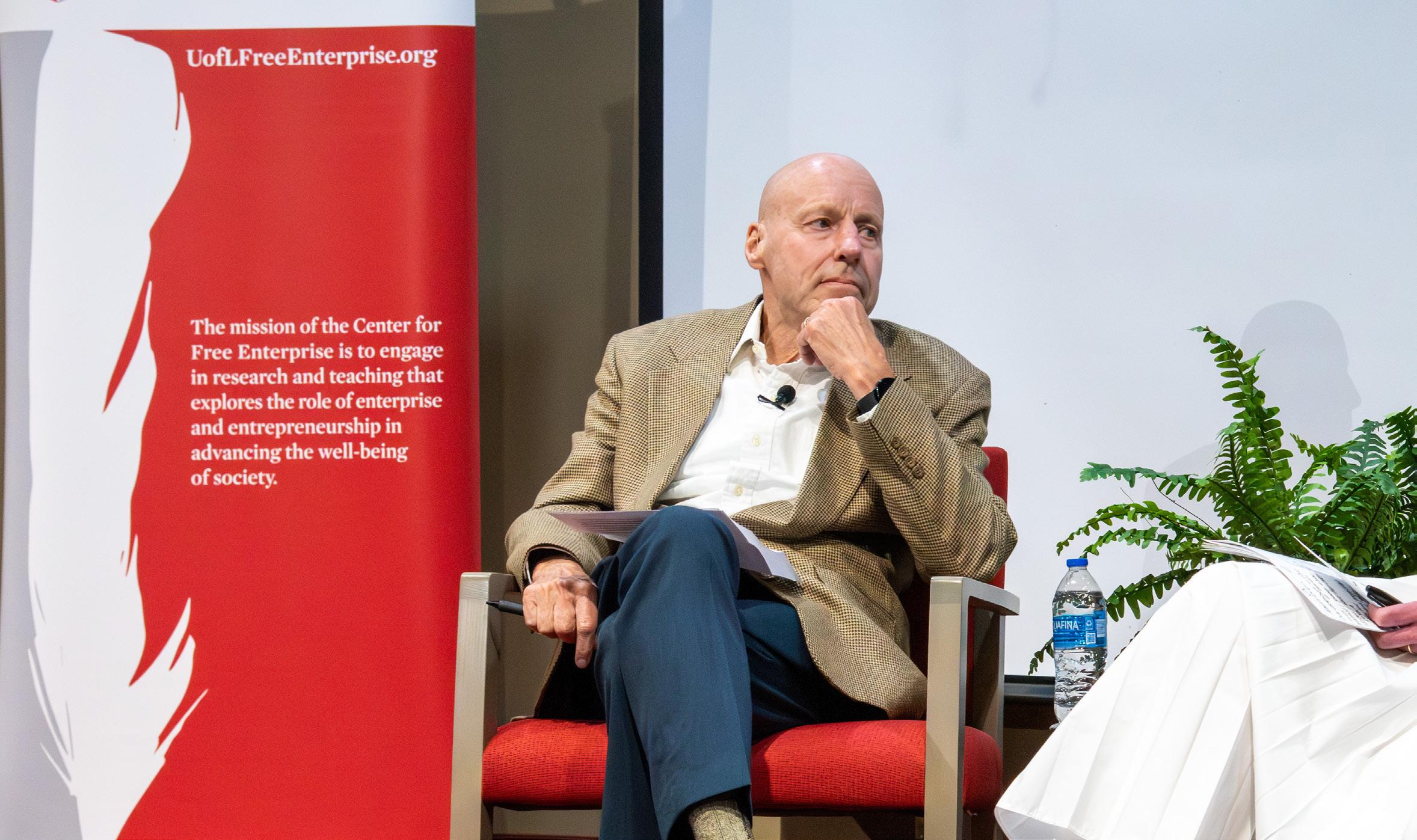
by Donna Zinser
The Center for Free Enterprise doesn’t shy away from provocative topics. In fact, part of what the CFE strives to do is provide opportunities for conversations on topics that may not get much playing time anywhere else on campus. That commitment to the open exchange of ideas is evident in the line-up for the fall 2025 semester. In September, the Center welcomed former United Nations ambassador and Kentuckian Kelly Craft for a conversation with CFE Director Steve Gohmann, as part of its Menard Family Lecture Series. Ambassador Craft spoke openly about her time in the UN from 2019-2021, including her work on the historic Abraham Accords and the current tensions in the Middle East.
Asked what advice she would give students who are entering the workforce, whether in diplomacy,
public service or other leadership roles, Craft encouraged students to remain curious, to always surround themselves with the smartest people and to be engaged, informed and prepared to make mistakes. She shared a revealing anecdote about a meeting with the president of Egypt, who asked about the Grand Ethiopian Renaissance Dam. She said she was caught off-guard and unprepared on the topic. “I wasn’t informed. I wasn’t ready,” she confided. So, she left the meeting and spent several hours preparing for a discussion on the topic. “It won’t happen again. And I hope that you can learn by a mistake like that.”
Following her discussion with Dr. Gohmann, Craft candidly answered audience questions on everything from NATO to the future of diplomacy in Haiti, the Israel-Hamas conflict, providing aid to the Global South and her working relationship with Obama
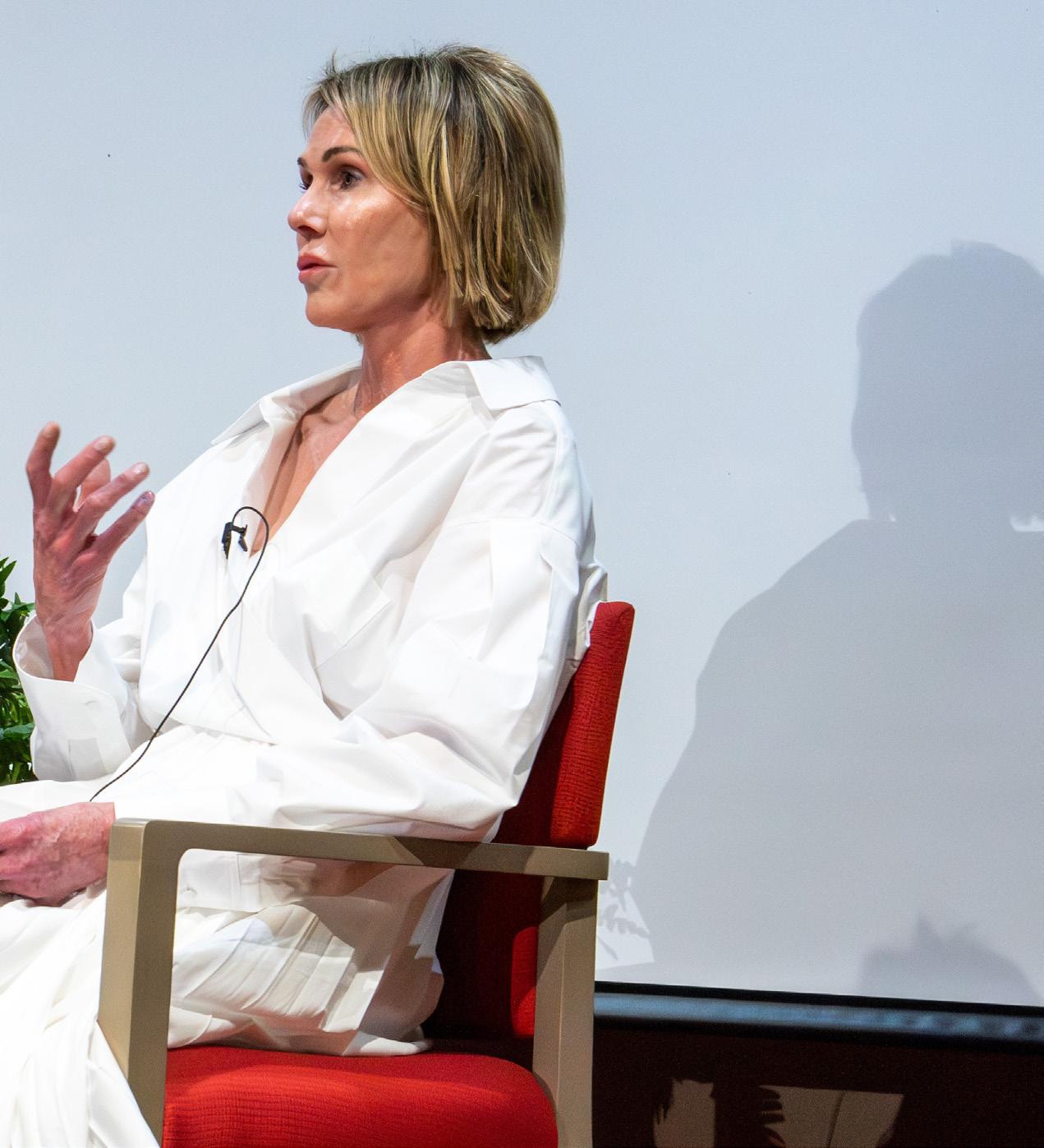
administration diplomat Susan Rice.
October’s lecture series event focused on trade, tariffs and the US economy in an illuminating and entertaining talk by economist Donald Boudreaux. The author/George Mason University economics professor discussed the US industrial sector, American workers’ wages and whether he thinks protective tariffs will achieve their promised goals. Spoiler alert: He doesn’t.
In November, the Center hosted a panel discussion on practical uses of artificial intelligence in various industries. Representatives from JCPS, Heaven Hill Brands and Thumbprint Consulting discussed and then demonstrated how AI provides value in their workplaces.
For more information on the Fall ‘25 Menard Family Lecture Series, including photos and videos, visit the CFE’s Media Room at UofLFreeEnterprise.org

Love or hate her music, it’s hard to deny that Taylor Swift is both a pop superstar and an iconic businessperson. Her last tour generated billions of dollars and her recently released album is already shattering records for sales and streaming. The Center has teamed up with the College of Business economics department to host SWIFTONOMICS: A Lunch & Learn Series. Economics professor Beth Munnich is presenting the three-part series, which is open to students in all majors, as a way to introduce them to economic concepts through the lens of Swift’s music and business acumen. Munnich says Swift’s music and impact is universally recognized and that is bringing students to the course. “They can relate to the ideas, and they know the lyrics—but maybe they’ve never thought about that lyric from the song ‘August’ as opportunity cost.” Munnich hopes SWIFTONOMICS will introduce students to economics as a course of study, once they see the practical applications of the concepts.
Each session covers various econ topics:
Look What You Made Me Do: The Economics Behind our Everyday Choices
Bad Blood or Good Karma? Market Power and Monopolies
Bejeweled: How Taylor Makes the Whole Economy Shimmer
Learn more about SWIFTONOMICS on page 56.

by Madison Kurfirst
In this economy? More like in this era.
Taylor Swift’s Eras Tour has proven to be more than just a musical phenomenon–it was a full-fledged economic force. With an estimated $2.2 billion in gross profits, it stands as the highest-grossing tour in history. In total, TIME estimated the tour generated nearly $5 billion in consumer spending, reflecting how live entertainment ripples through local economies. From booming tourism to unexpected bead and sequin shortages, Swift’s tour has reshaped how cities and businesses experience major cultural events. At the University of Louisville College of Business, Associate Professor of Economics Beth Munnich saw an opportunity to channel this real-world excitement into the classroom. Partnering with Marketing and Events Manager Donna Zinser Clark and the Center of Free Enterprise, the Swiftonomics Lunch and Learn Series was launched. This series blends learning and pop-culture, proving that economics can shimmer too.
UofL: What are some of the challenges you’ve faced as a woman in economics?
BM: It wasn’t easy getting used to being one of a few women–and sometimes the only woman–in a room, which is far too often the case in economic circles. I’ve benefitted a lot from great mentors, mentoring programs like the Committee for the Status of Women in the Economics Profession and colleagues who support and advocate for me.
UofL: What inspired you to create this Lunch and Learn series?
BM: We’re always looking for new ways to engage students with economics. I’ve been seeing Swiftonomics classes pop up around the country since the Eras tour in 2023 and always thought it would be fun to teach, but the content didn’t always align well with my existing courses. The St. Louis Federal Reserve Bank hosted a webinar about teaching Swiftonomics last summer, which Donna Zinser Clark at the Center for Free Enterprise and I had both seen. When we realized we were both passionate about Swiftonomics,


we decided we had to do something to bring it to UofL! We were both genuinely excited to bring this idea to life and it all came together with the support of the Center for Free Enterprise and Donna’s amazing organizing skills. I think our students are hungry for opportunities to apply the material they’re learning outside the classroom and this is a fun and low-stakes way to do that.
UofL: this Lunch and Learn series reaching and inspiring more women to study economics?
BM: Having people with different viewpoints is essential for a thriving economy and economics has fallen behind in this regard–even relative to STEM fields, where the share of students that are female has increased in recent years.
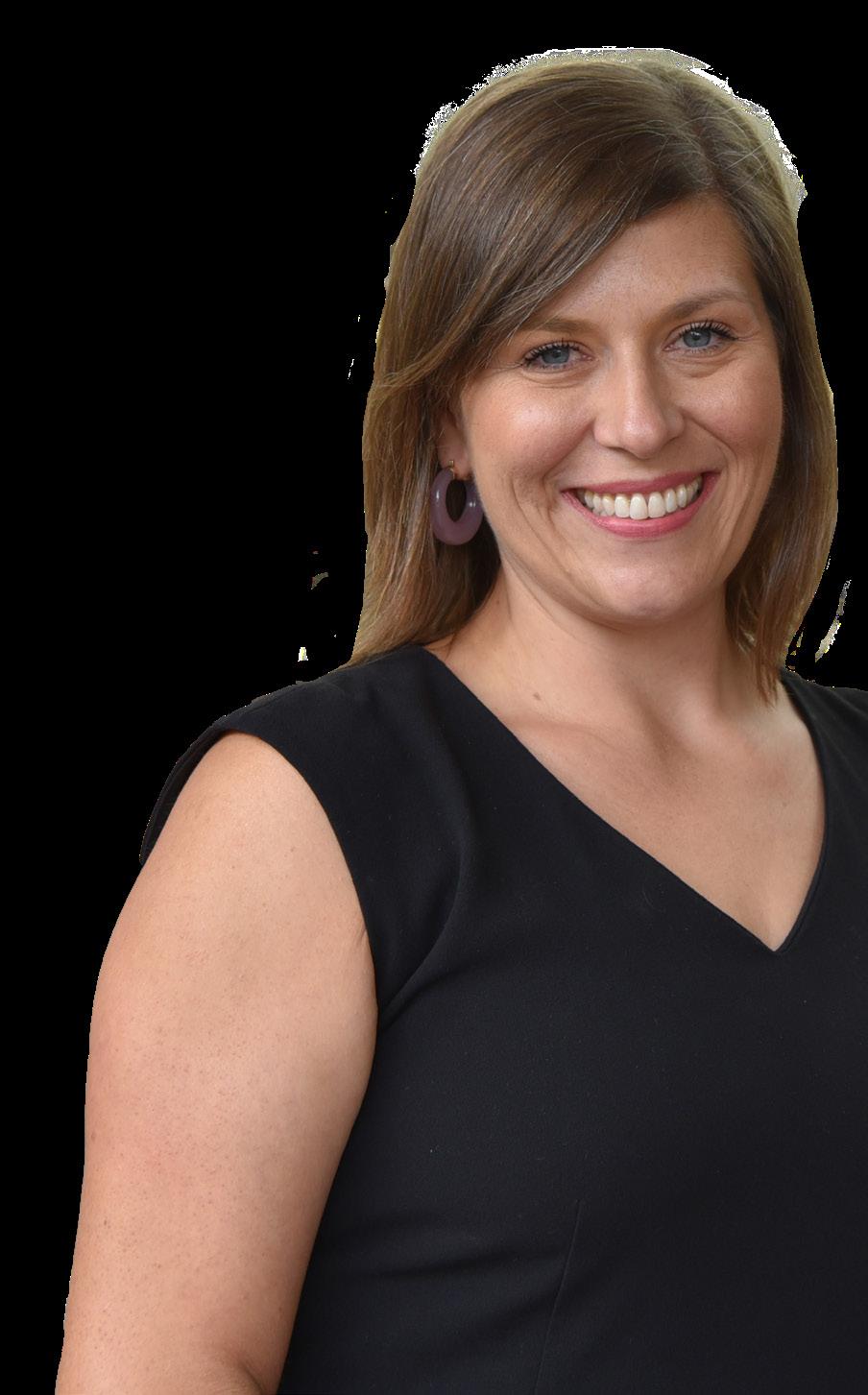


[Suppose] women make up over half of undergraduates but only a third of economics majors. [In that case], we’re missing an opportunity to engage students in economics. This raises important questions about whether our content or teaching methods are truly resonating with all students.
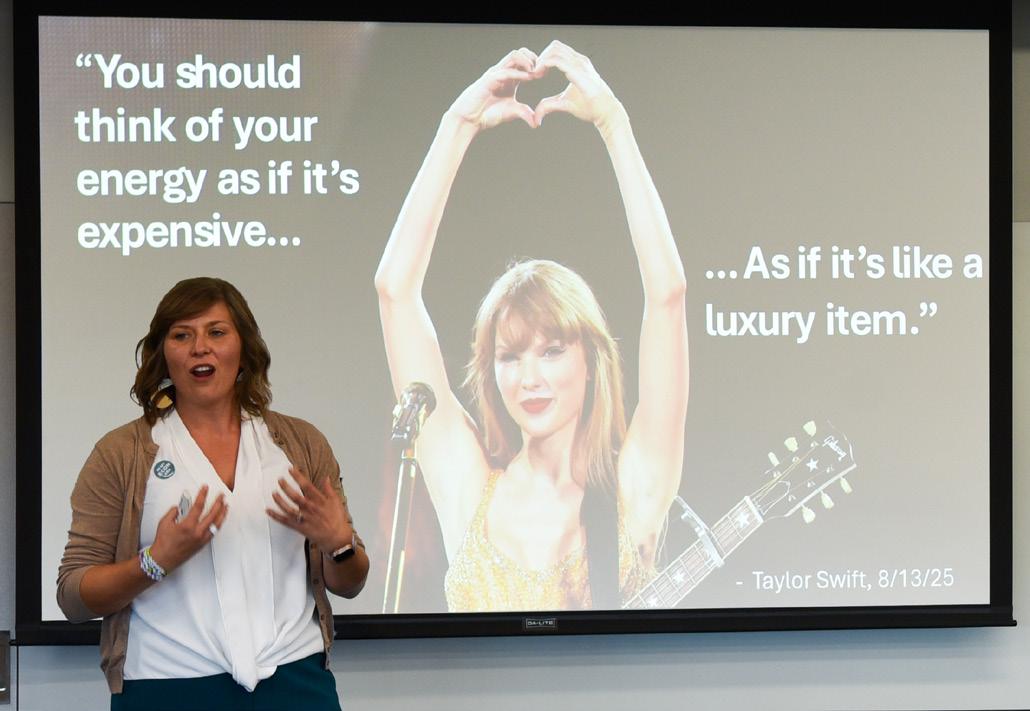
Swiftonomics is open to everyone and recent polls show that nearly half of avid Taylor Swift fans are men. That said, this series has fostered a space where female students can connect and collaborate as we explore the strategies behind one of the most successful businesswomen of our time. By highlighting how Taylor Swift has built an empire through smart economic decisions, I hope to inspire more women to study and pursue careers in economics.
UofL: Do you consider yourself to be a Swiftie?
BM: I did not come into this as a Swiftie! I liked Taylor Swift’s music and had listened to a lot of it because my 10-year-old is a huge Swiftie. I also had a lot of respect [for] Taylor Swift as an entrepreneur and was fascinated by some of her business strategies, like slow ticketing and offering limited releases of music and merch. But I’ve really been drawn into her work these last couple of months as I’ve listened more closely to her music for economics examples and spent more time learning more about her economic impact. So, yes, I guess I consider myself a Swiftie now!
UofL: If you had to pick one Taylor Swift Era to describe this series, what would it be and why?
BM: Reputation! With the release of that album, Taylor Swift not only reinvented her musical style but also transformed her marketing and distribution strategies. She introduced innovative approaches, like slow ticketing and dynamic pricing, to her concert sales–tactics rooted in economic thinking. Through the Swiftonomics Lunch and Learn series, we’re offering students a fresh and engaging narrative for exploring economics in action.

What do you hope students take away?
I hope students see that economics is everywhere. It’s part of all the decisions we make and can go a long way in helping to explain the world around us.
How do you balance fun and academic rigor?
One advantage of the Lunch and Learn sessions is that I don’t have to assign grades! Like all my classes, I begin by identifying the core takeaways I want students to leave with and build the session around those goals. Taylor Swift makes my job a lot easier–her lyrics and business decisions offer rich examples and intuitive connections to economic concepts, which makes the material more engaging and fun to teach.
UofL: How do you respond to those who see studying Taylor Swift in an academic setting as not serious enough?
BM: Taylor Swift stands out as an exceptionally successful entrepreneur, having built her career using innovative business strategies rooted in sound economic principles. Her journey offers a compelling case study for applying theories and models to real-world scenarios. This is a great opportunity to explore a variety of topics in an engaging and fun way.
Ready for your next era? Whether you are ready to shake it off and start fresh or build your own billion-dollar brand, the University of Louisville can help you master the economics behind the music. Learn more at business.louisville.edu/ academics-programs/undergraduate-programs/economics



As an R1 institution, creating new knowledge is at the core of what we do. The College of Business celebrates our faculty’s research contributions to their respective fields in this summary of our most recent publications and reports.
Ben Foster, Xudong Fu, Mattingly, E., & Andrew Manikas, (2025). Did Investments in LGBTQ Diversity Help Improve Relative Corporate Performance During the COVID-19 Crisis? Accounting, Ethics & Public Policy. Advance Online Publication.
Baaske, B, Hilda Carillo, Gaynor, & L., Schmidt, J., A multidisciplinary theory repository and assurance ecosystem framework to facilitate research. Auditing: A Journal of Practice & Theory. 1-22. Advance Online Publication.
Derreck Barr-Pulliam, Mason, S., & Sanderson, K., (2025). The joint effects of valuation focus and employer type on valuation specialists’ perceptions of organizational-professional conflict. Auditing: A Journal of Practice & Theory. 1-22.
Per Fredriksson, Sharma, S., Wollscheid, J. (2025). Legal traditions and the ratification of the Paris agreement. Energy Economics, Advance Online Publication. Volume 149.
Jose Fernandez & Yetter, E., (2025)., Sentiment Analysis of Teaching Evaluations: Evidence From Nearly 8 Million Rate My Professor Reviews. Southern Economic Journal. Advance Online Publication.
Tom Lambert, (2025). Principles of Institutional and Evolutionary Political Economy: Applied to Current World Problems Review of Political Economy. 433 pp.
INFORMATION SYSTEMS, ANALYTICS & OPERATIONS
Shi, D., Gan, Shuling, Jozef Zurada, Jeff Guan, Wang, F., & Weichbroth, P., A multi-model approach to construction site safety: Fault trees, Bayesian networks, and ontology reasoning. Expert Systems with Applications. Volume 288.
MANAGEMENT & ENTREPRENEURSHIP
Daniel Bennett, Vedula, S., & Michael Araki., (2025). Different Strokes for Different Folks: A Configural Analysis of Entrepreneurial Ecosystems. Small Business Economics. Advance Online Publication.
Vitaliy Skorodziyevskiy., Crawford, G. C., Hayes, N. T., Davidsson, P., & Honig, B. (2025). Replicating Davidsson and Honig (2003): Updates on Human Capital, Social Capital, and Replications in Entrepreneurship. Entrepreneurship Theory and Practice, Advance Online Publication.
Farrell, M., Vitaliy Skorodziyevskiy, & Willis, C. H. (2025). Analytic induction: A novel approach in entrepreneurship. Journal of Business Venturing Insights, 23, e00527. Advance Online Publication.
Vitaliy Skorodziyevskiy, (2025). Paradox of Family Firms: Comment on Fang, Singh, Kim, Marler and Chrisman (2022). Management and Organization Review. Advance Online Publication.
Chrisman, J. J., Fang, H. C., & Vitaliy Skorodziyevskiy, (2025). Toward a Property Rights Theory of the Family Firm. Journal of Management, Advance Online Publication.
Connect to our Research: https://business.louisville.edu/ faculty-research/researchpublication/
Lavertu, L., Katina Kulow, Cowan, K., & Marder, B., (2025). Petfluencers, the Fur-Mula for Sincere Endorsements: Examining How and When Pets Exhibit Greater Persuasion as Influencers. Journal of Advertising Research. Advance Online Publication.
Daniel Bennett delivered talks at ‘Riding the Populist Wave: Entrepreneurial and Firm Responses to the Changing Political Current,’ featured as a plenary lecture at the Public Choice Society Annual Conference on March 7, 2025, in Louisville, Kentucky.
‘Rethinking Capital(ism) in the 21st Century,’ as an invited speaker at the Workshop on the Law & Political Economy Project, hosted by the Law & Economics Center of George Mason University, on March 16, 2025, in Destin, Florida.
Beth Munnich was invited to serve on the Editorial Board for the American Journal of Health Economics.

Vitaliy Skorodziyevskiy published a book chapter (2025). From setbacks to comebacks: a systematic review of family firm decline and turnaround. Research Handbook on Turnaround Strategies, 48-73.
Per Fredriksson has been included in the Research.com 2025 Ranking of Best Scientists in Political Science. He is ranked #482 in the world and #257 in the United States.
Per Fredriksson has been honored in the ScholarGPS rankings. He is ranked in the top 0.35% overall (all fields), 0.31% in Economics, 0.03% (#5) in Environmental Policy, and 0.09% (#18) in Corruption Studies. The university community celebrates this outstanding achievement and Per’s contributions to these fields.
Kristen Lucas & Matt Elder (2025). Making the cut: An exercise in AI-aided decision-making. Management Teaching Review. Advance online publication.
Move over, influencers— there’s a new top dog in marketing. Literally.
A recent study by Katina Kulow, Associate Professor of Marketing and Program Director for the Undergraduate Sales Certificate, found that pets with social media accounts often outperform human influencers when it comes to persuading consumers. As human influencers continue to dominate social media feeds, audiences have grown weary of perfectly curated content. Animals, on the other hand, come across as authentic, lovable and refreshingly scandal-free.
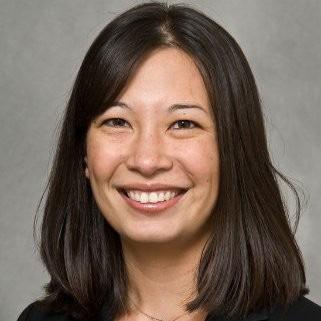
Through a mix of lab experiments and field studies, Kulow’s research revealed that audiences may be more likely to trust, and ultimately buy from, brands endorsed by pet influencers. Animals make endorsements feel genuine and unscripted, as consumers naturally personify and emotionally connect with them, sometimes even more than with other people.
As influencer fatigue sets in, marketers are turning to four-legged ambassadors who charm audiences and bridge cultural divides. Petfluencers deliver joy, relatability and credibility in one adorable package. When it comes to persuasion, pets may truly be marketing’s new best friend.
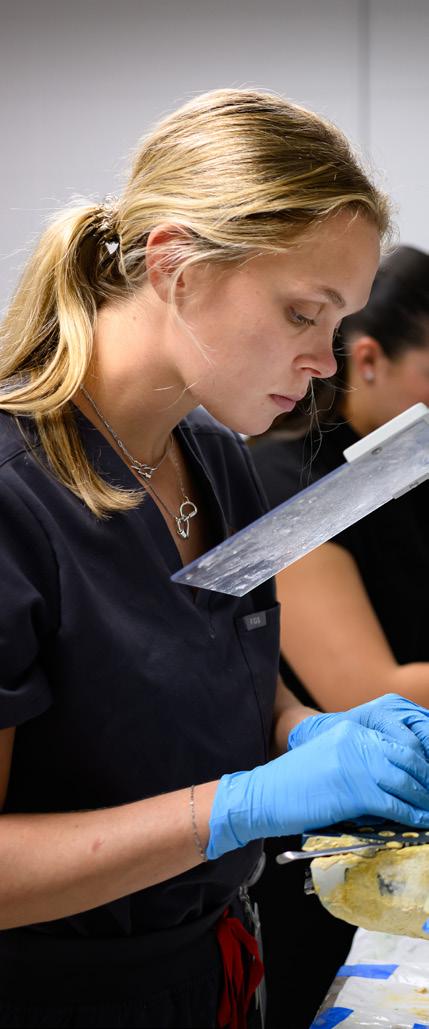
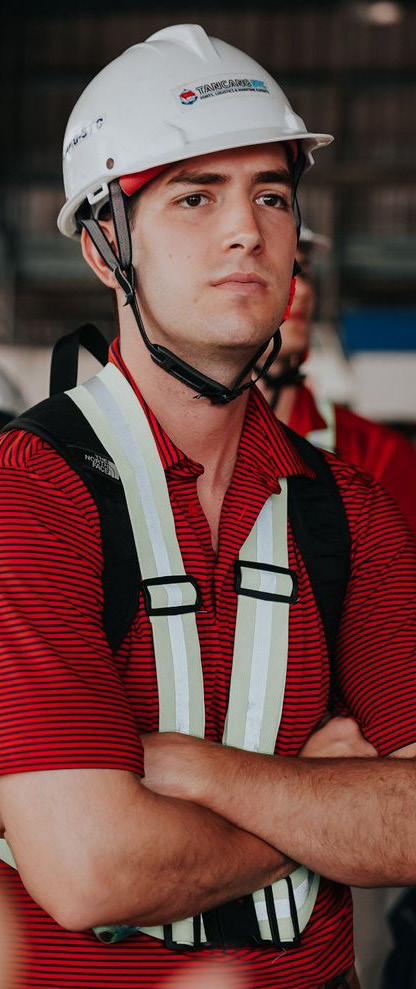
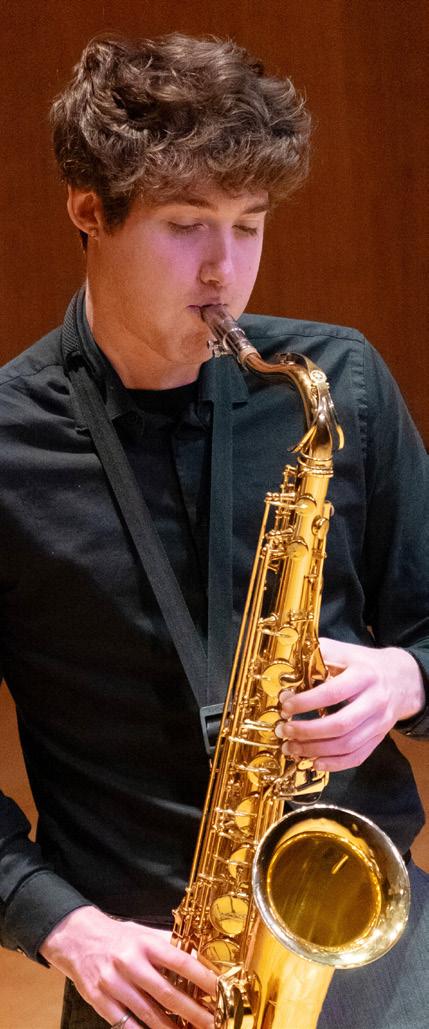
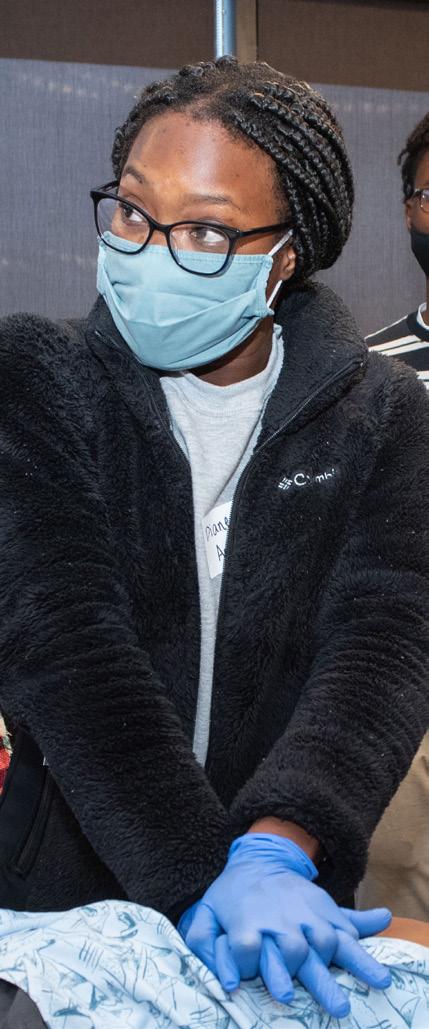
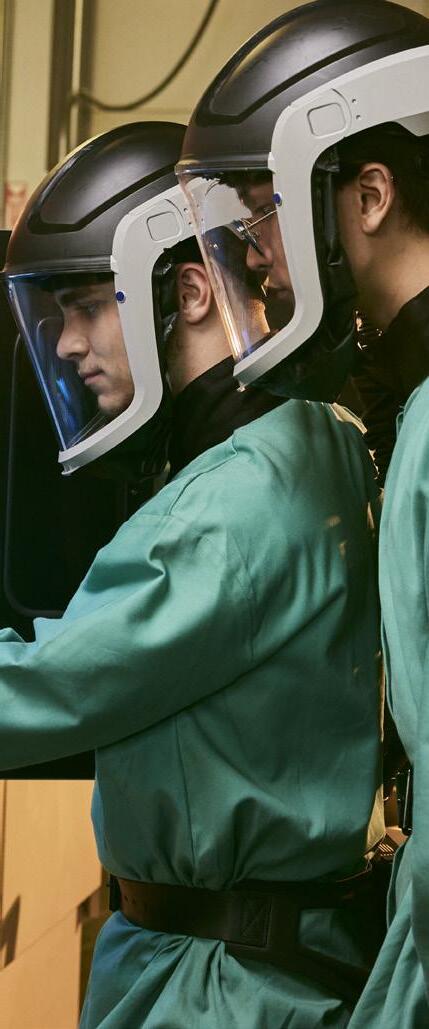
Whatever career path you take, there’s a business element at play. Whether you’re an artist, engineer, healthcare worker or scientist, grasping business principles is crucial for your success. A business degree equips you to innovate, organize and discover profitable solutions across any field. This adaptable skill set is the ideal partner for any major or career journey. We offer flexible graduate and undergraduate degrees, minors and certificates—we have the right fit for you!
